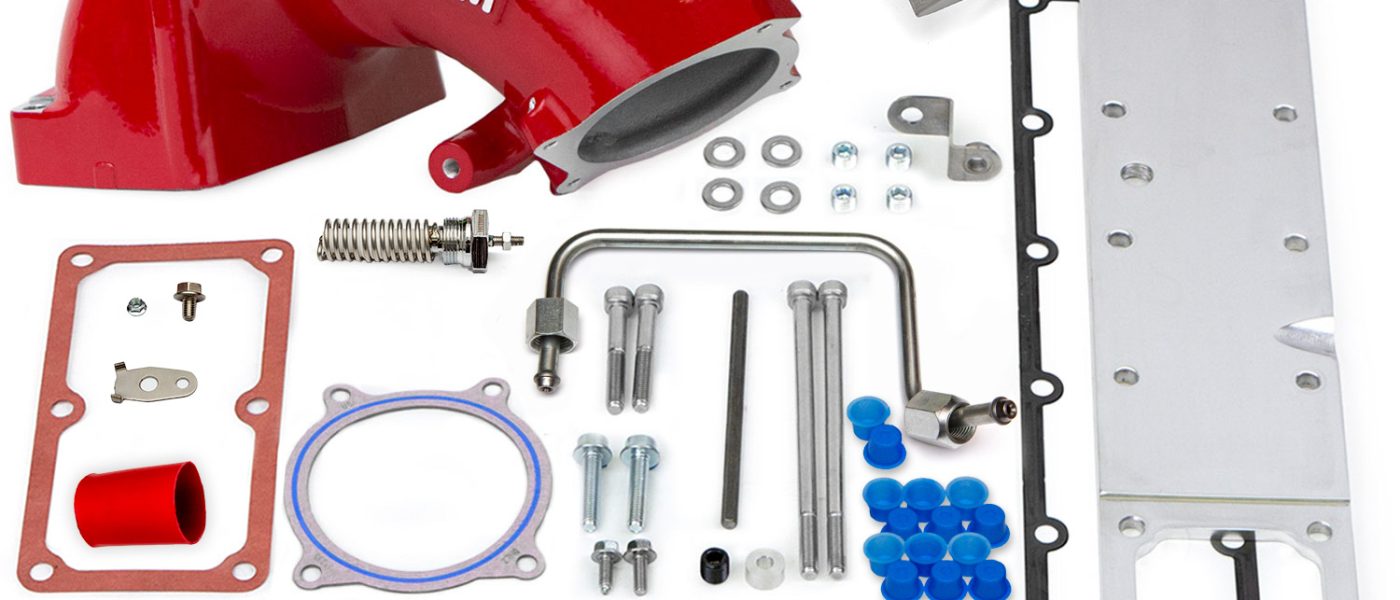97737 Monster-Ram Intake System w/fuel line-2019-24 RAM 6.7L Cummins
INSTALL INSTRUCTIONS
Part #s
42799, 42799-PC, 42799-B
Banks Ram-Air® Intake System 2019-2023 RAM 2500/3500 6.7L Cummins
Please read through the following instructions thoroughly before starting your installation. If you have any questions please visit our Support Page.
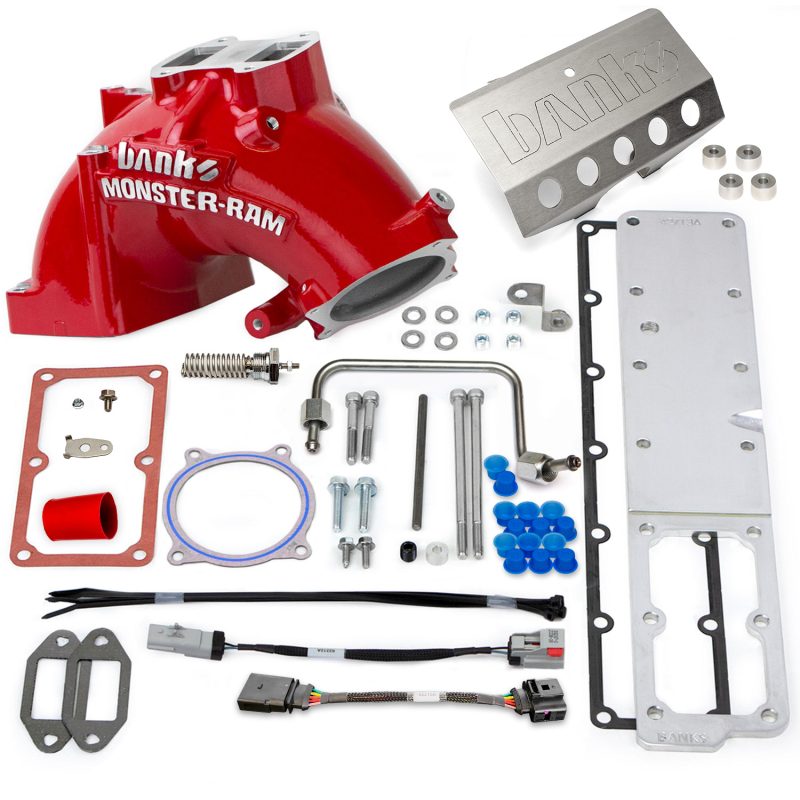
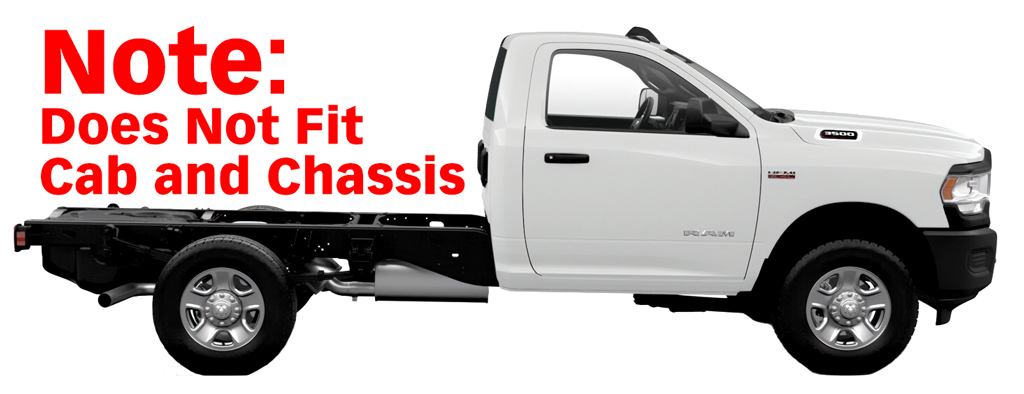
Monster-Ram w/Intake Plate Install Video
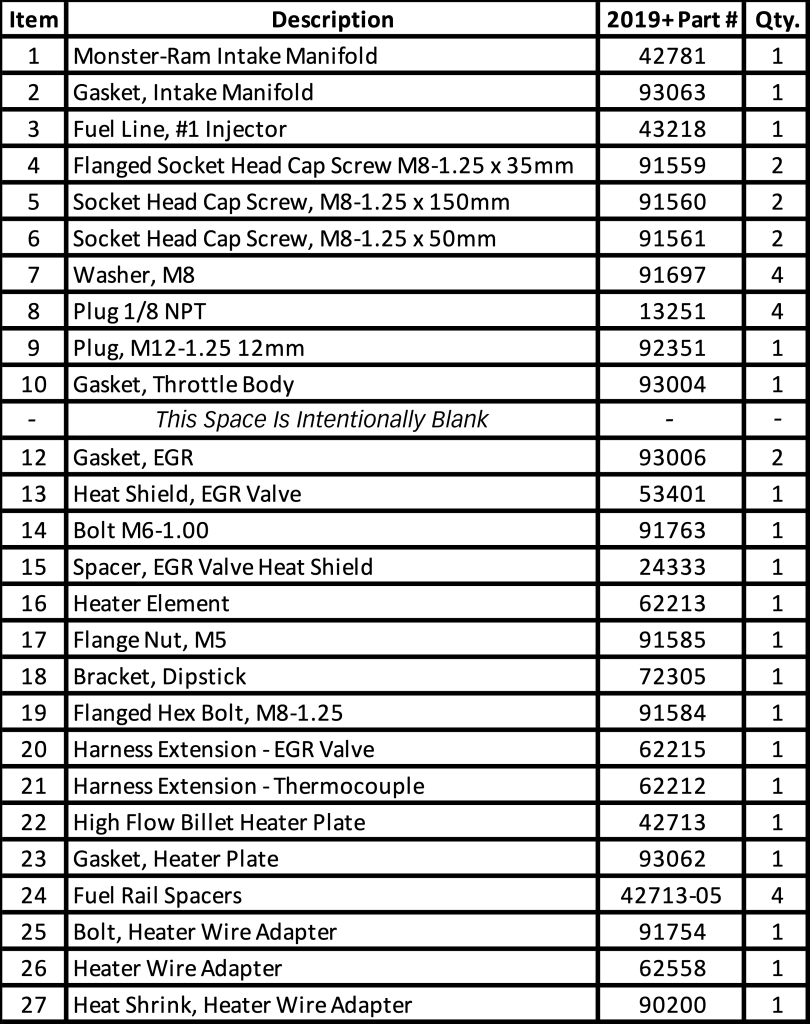
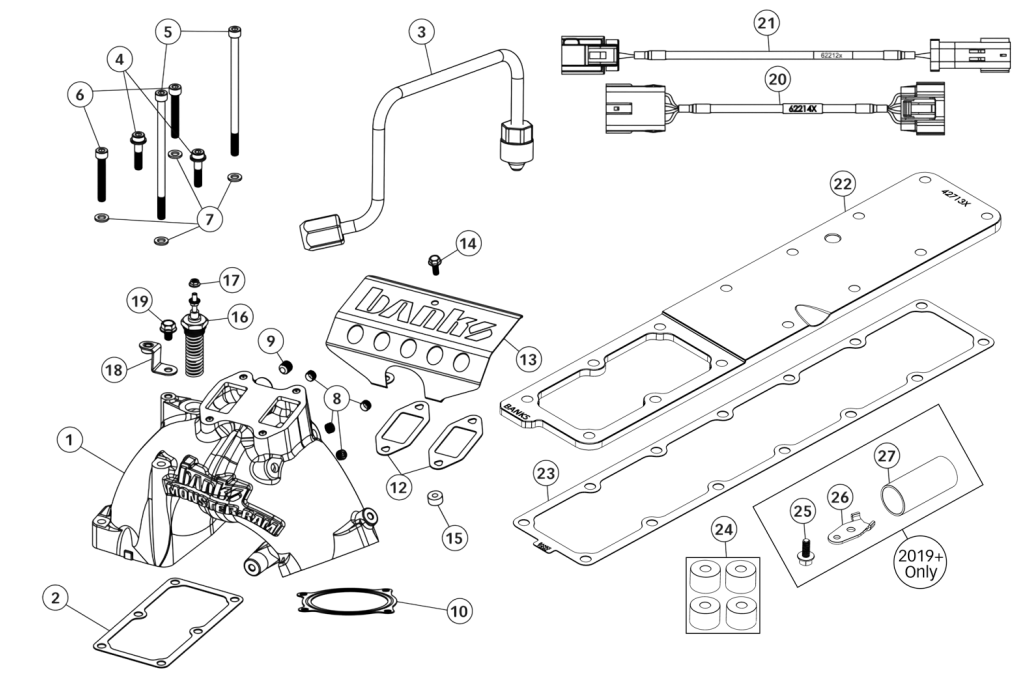
In effort to make sure you have the right kit for your model year. Visually check which fuel line is included in your kit before starting installation.
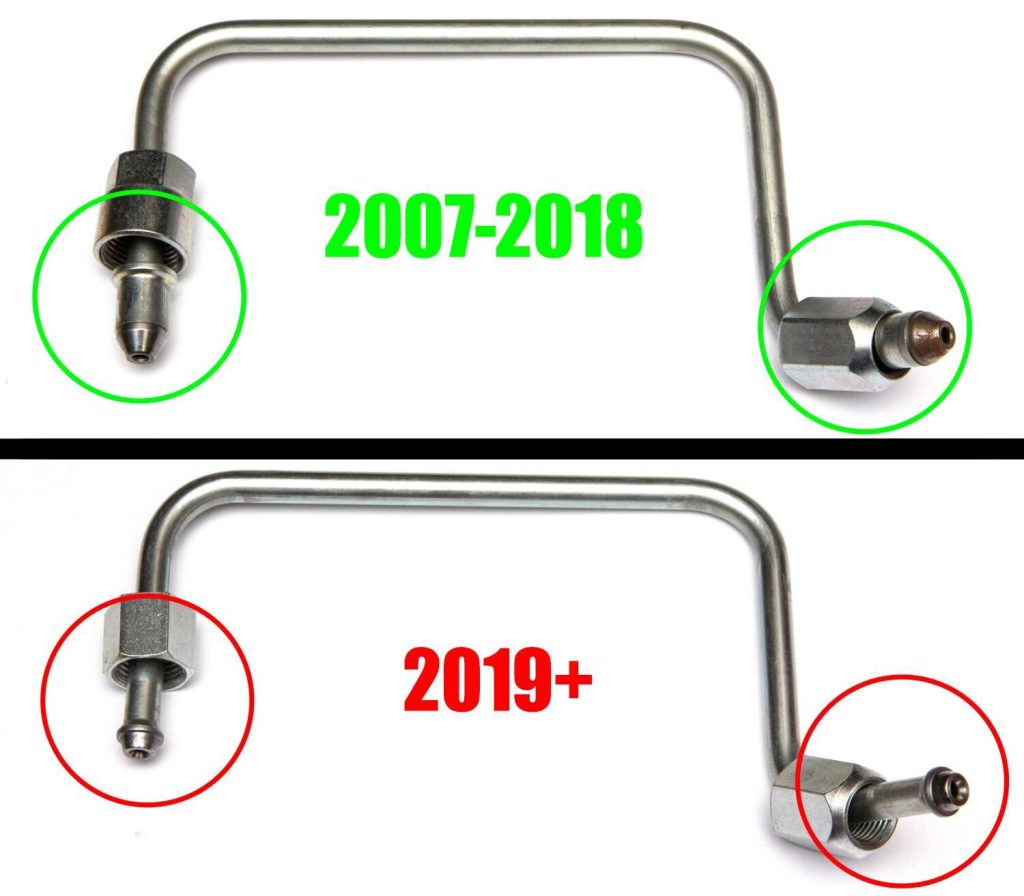

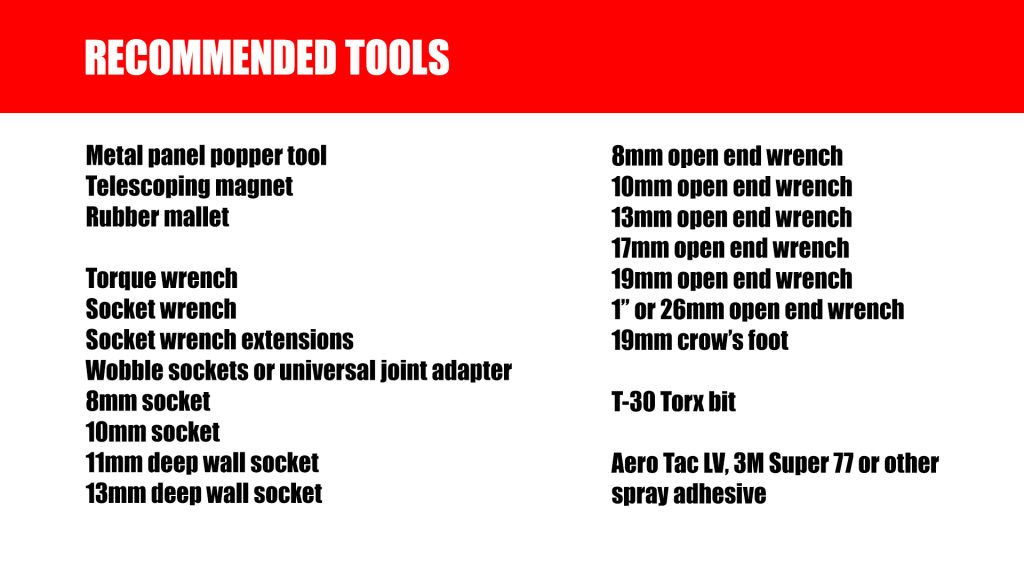
Important Notes:
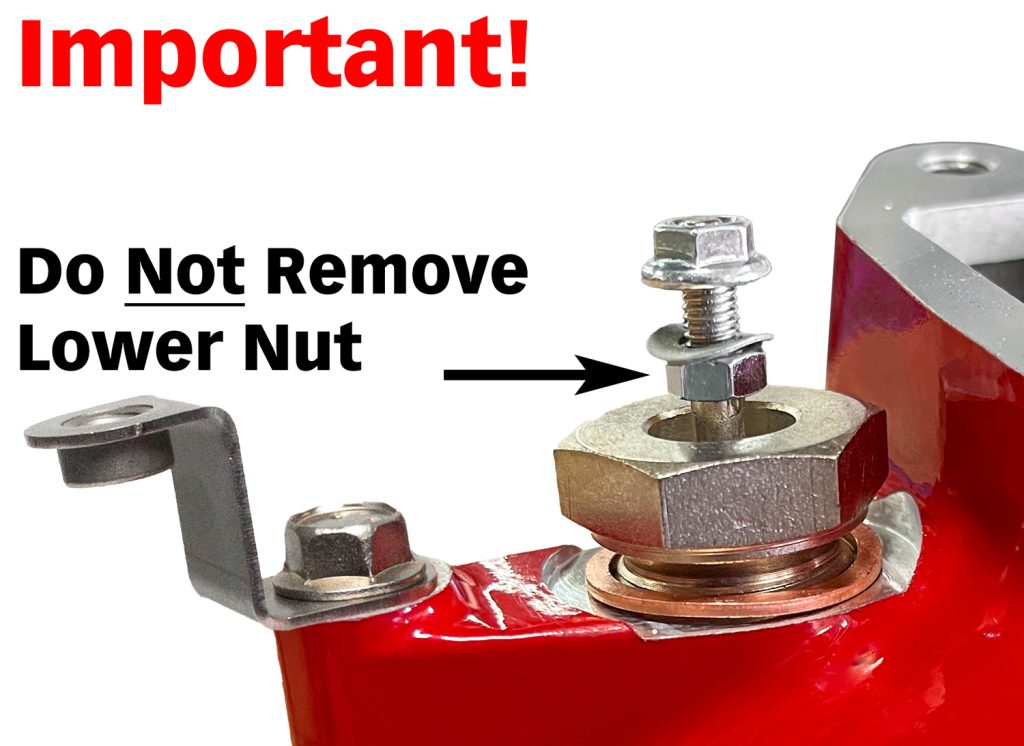
IMPORTANT!
Coil heater preparation: Remove the top hex nut from the threaded post. You will replace the nut with the supplied flange nut as shown. The lower nut must not be removed from the heater coil. The lower nut must remain 1/8″ above the coil heater body.
Take care when installing OEM heater wire ring terminal, it must be sandwiched between the upper and lower nut. If the lower nut is too low, the ring terminal could contact the body of the coil and will short out.
When tightening the nut, it is very important to use a 10mm wrench or socket on the top nut and an 8mm open-end wrench on the bottom nut to prevent the threaded post from rotating. If the threaded post rotates, it can break the ceramic insulation it’s surrounded by.
If the OEM heater wire touches other metal components, an open short will occur.
Copper washer: All kits now ship with a copper crush washer. Place this washer between the coil heater before screwing it into the Monster-Ram.
OEM Harness and Sensor Removal
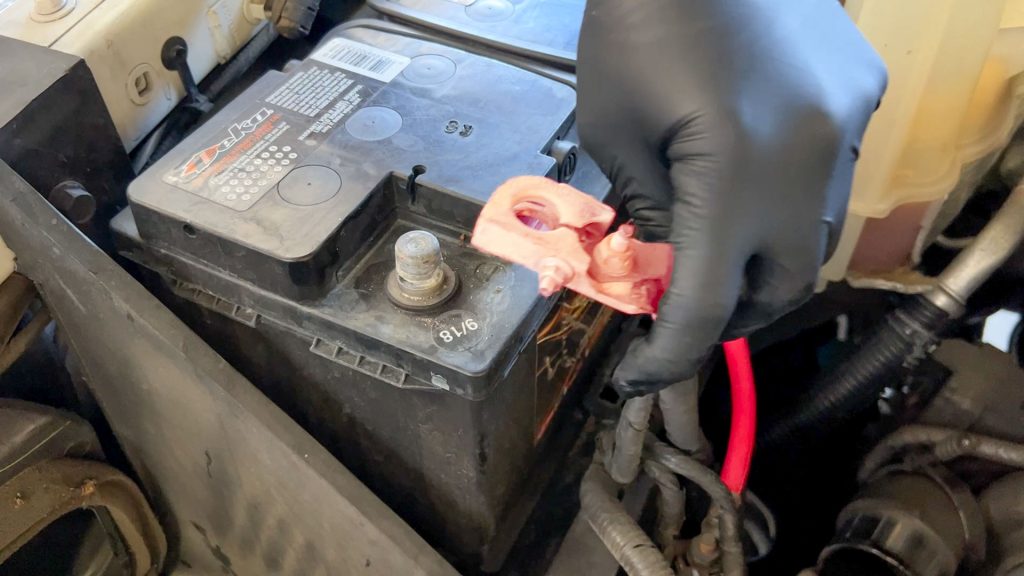
1. Disconnect Batteries
Place a rag around each of the negative battery cable ends; this will prevent them from touching the battery again and arcing during the install as you work.
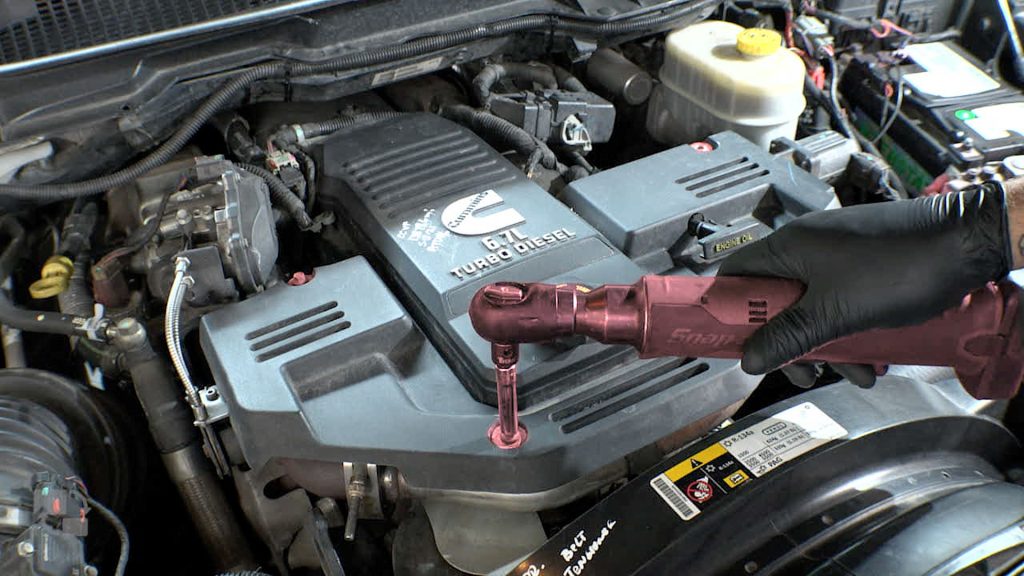
2. Remove Engine Cover
Remove engine beauty cover. Use an 8mm deep socket to remove the four bolts holding the cover down.
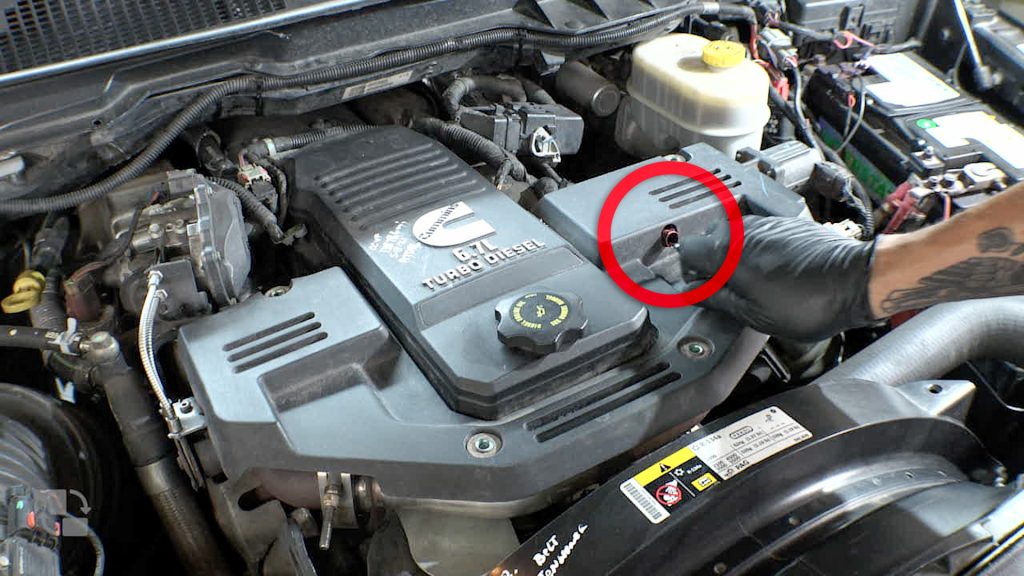
3. Remove Dipstick
The Dipstick needs to be removed for the cover to come off.
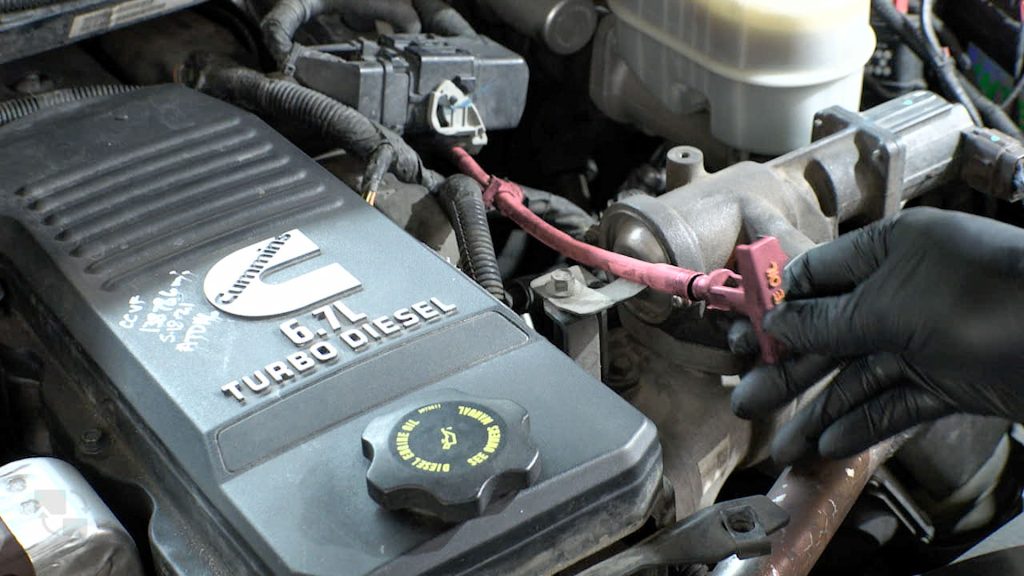
4. Reinsert Dipstick
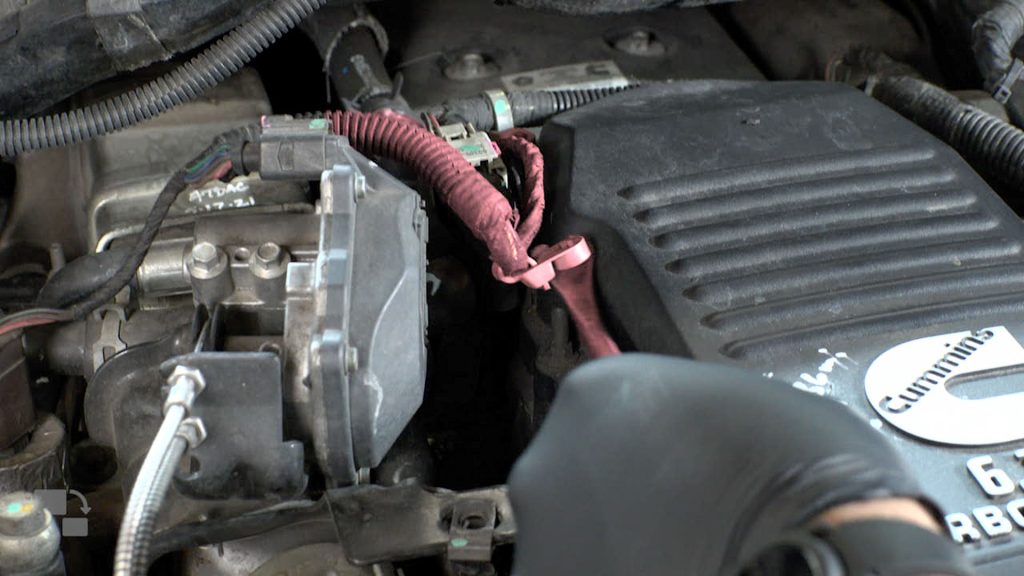
5. Remove Cable Tie Downs
Use a panel popper tool or pliers
Note: The 2 bolts with studs extending up past the head are to be located on the left rear of the cover.
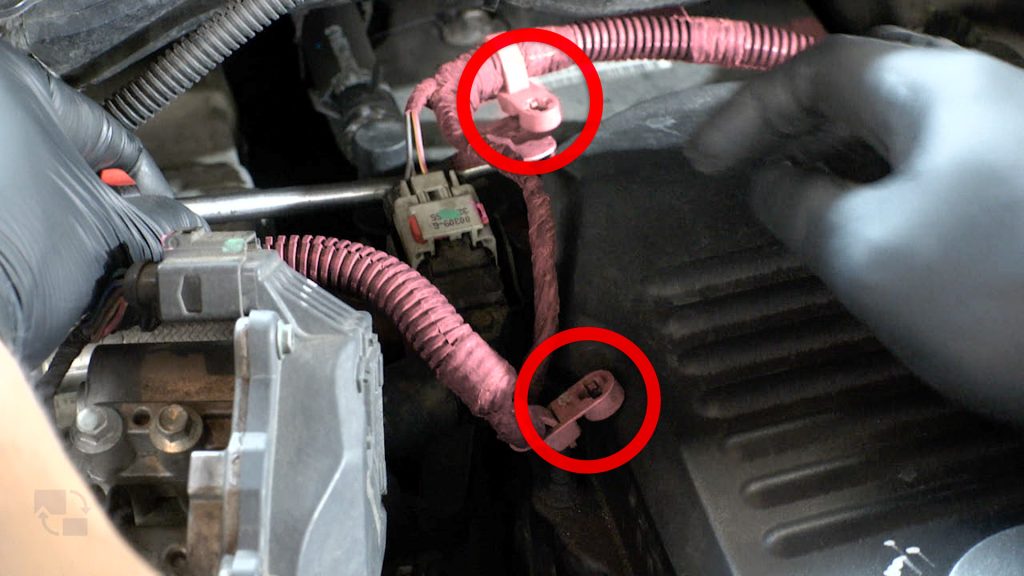
6. Remove Cable Tie Downs
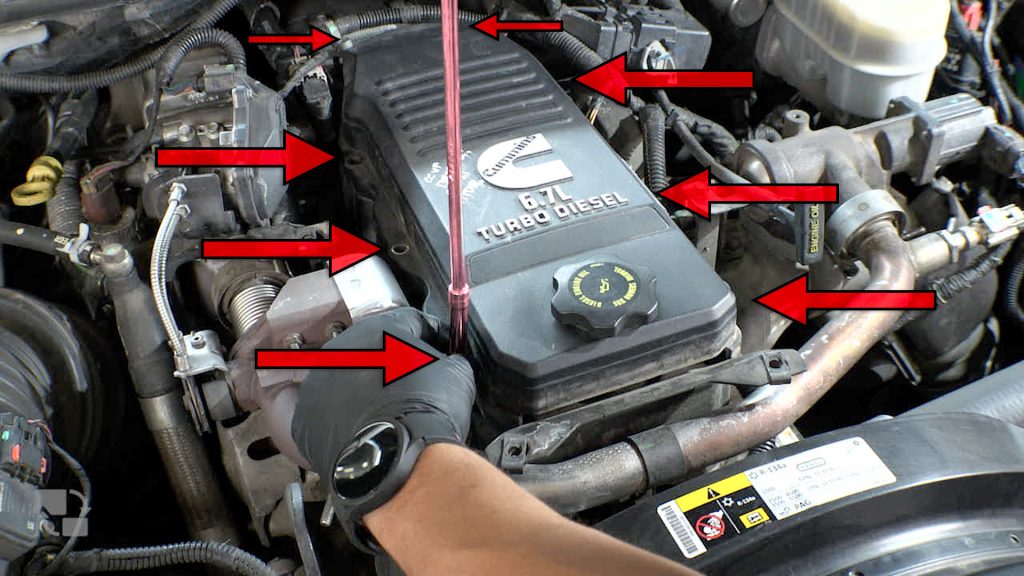
7. Remove Engine Cover Bolts
There are 8 bolts holding on the cover. A wobble extension and placing the socket on the bolts first helps.
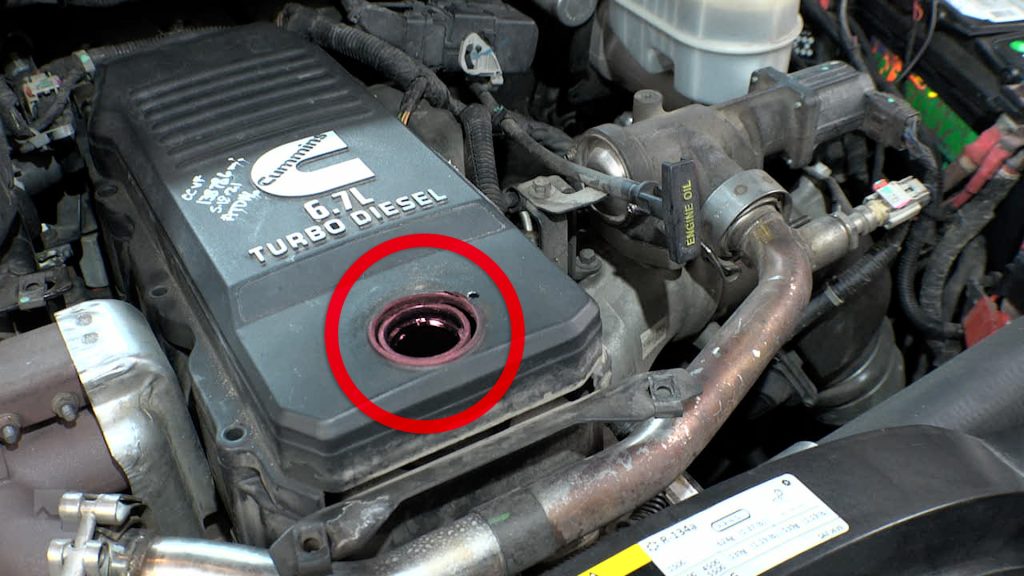
8. Remove Oil Fill Cap
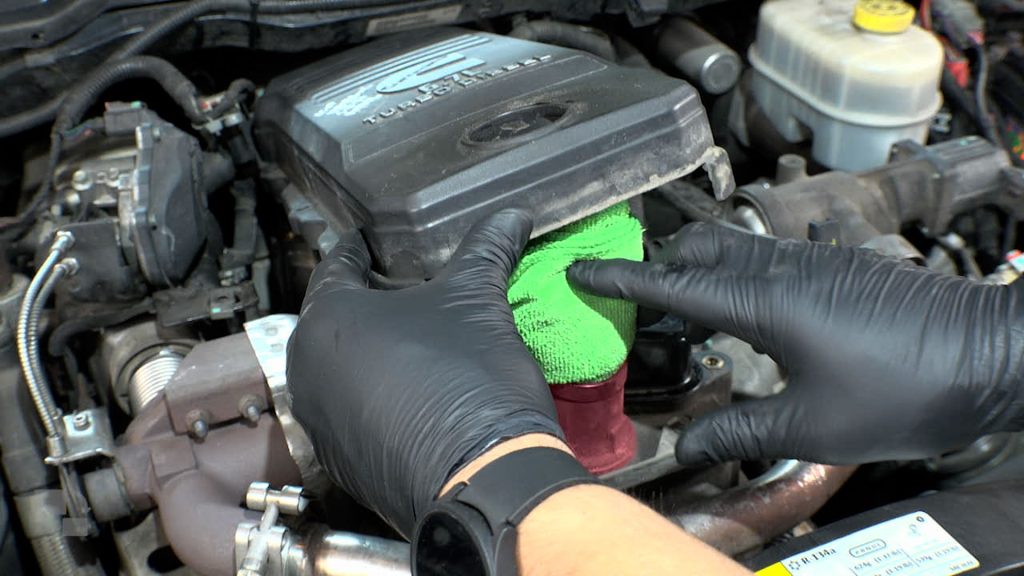
9. Place Rag Over Filler Neck
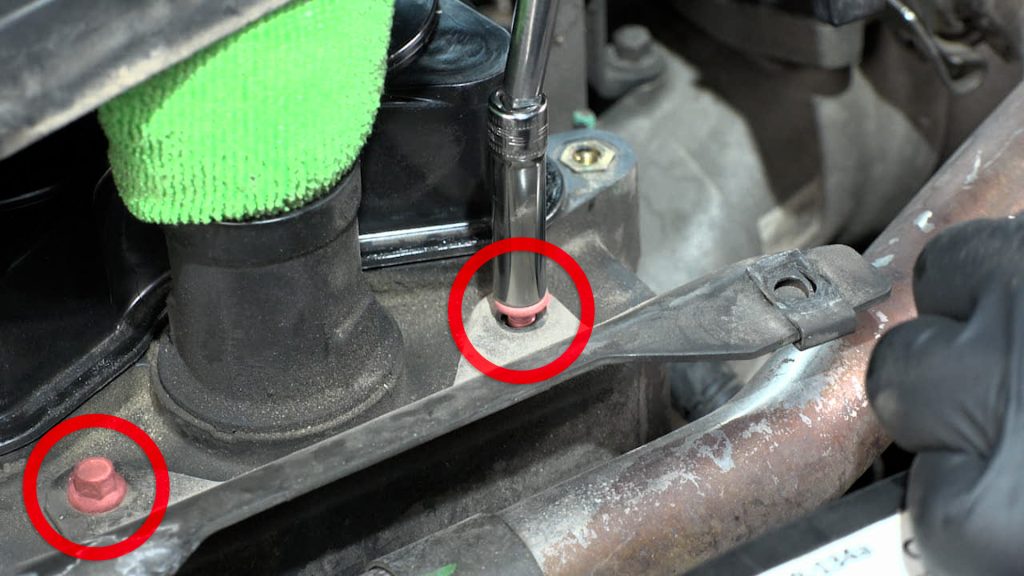
10. Remove Bolts Holding Cross Over Tube Bracket
This bracket will not be reused.
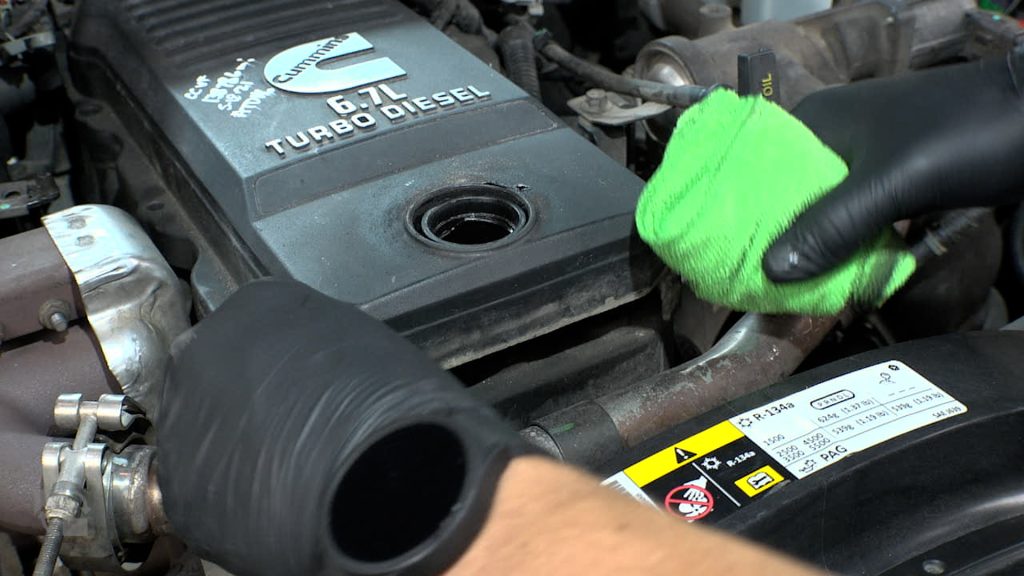
11. Remove Rag & Set Down Cover
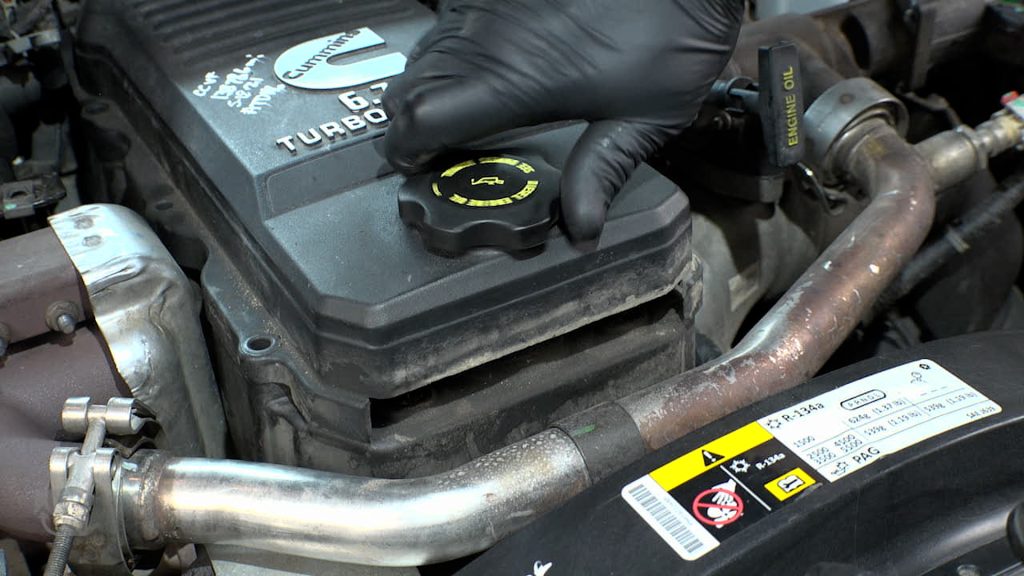
12. Install Oil Filler Cap
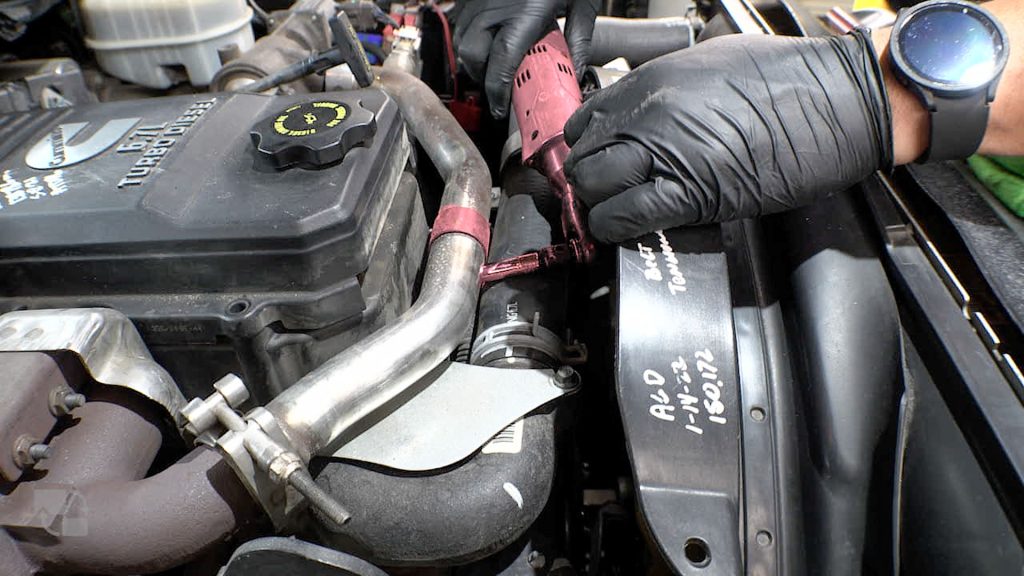
13. Remove Bolt Under Center of EGR Crossover Tube
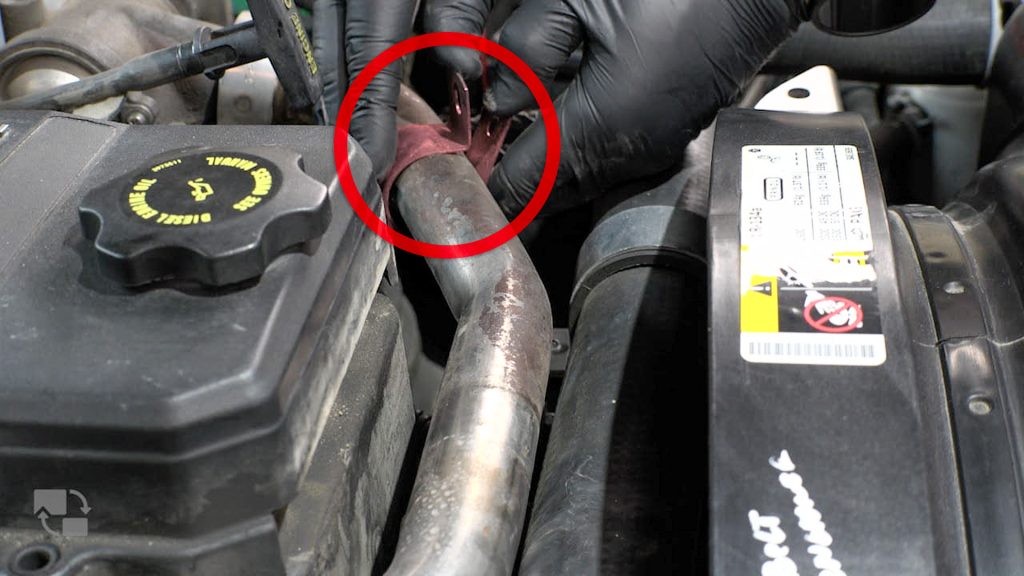
14. Remove & Dispose EGR Tube P-Clamp
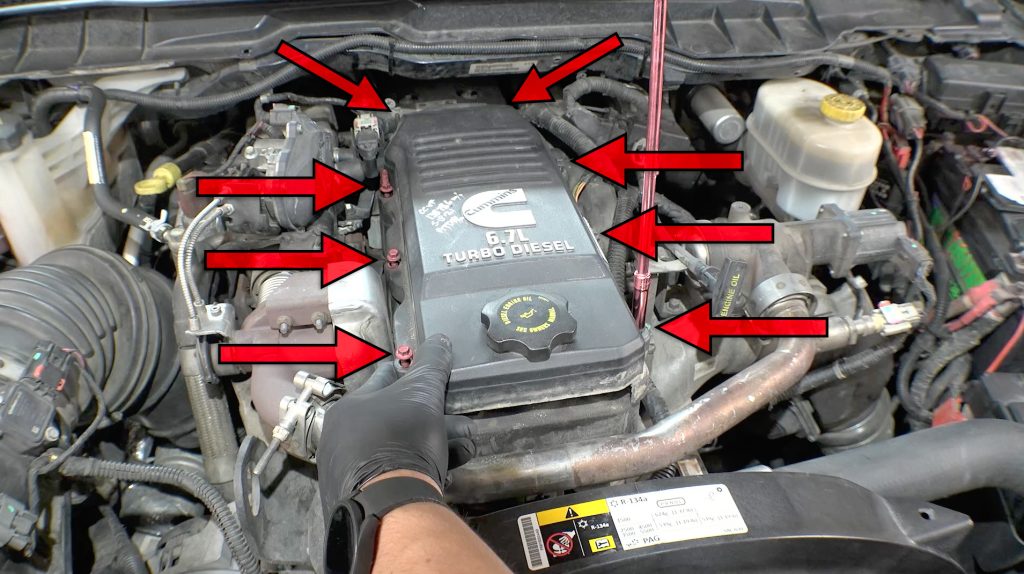
15. Reinstall 8 Engine Cover Bolts – Studs in Rear Passenger Side
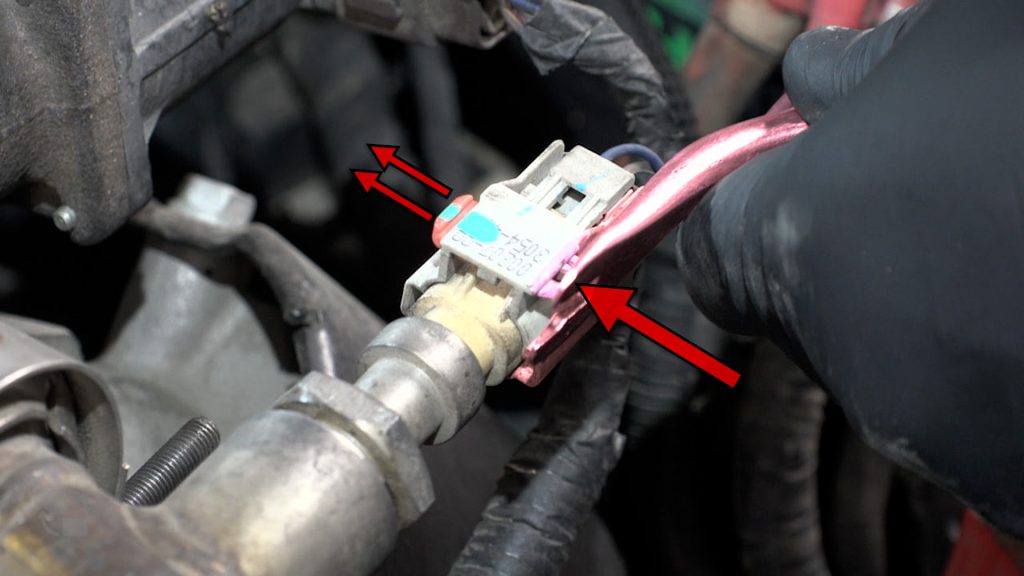
16. Unlock Temp Sensor Plug From EGR Crossover
Use a flat-blade screwdriver or pry tool to push the slide-lock.
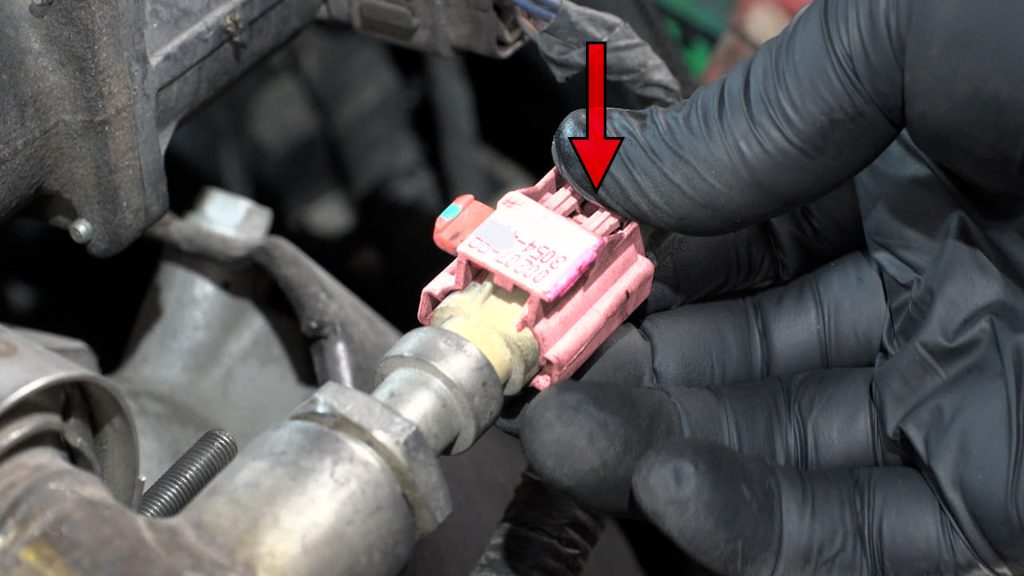
17. Remove Temp Sensor by Pinching It
Unclip this wire clip for extra clearance.
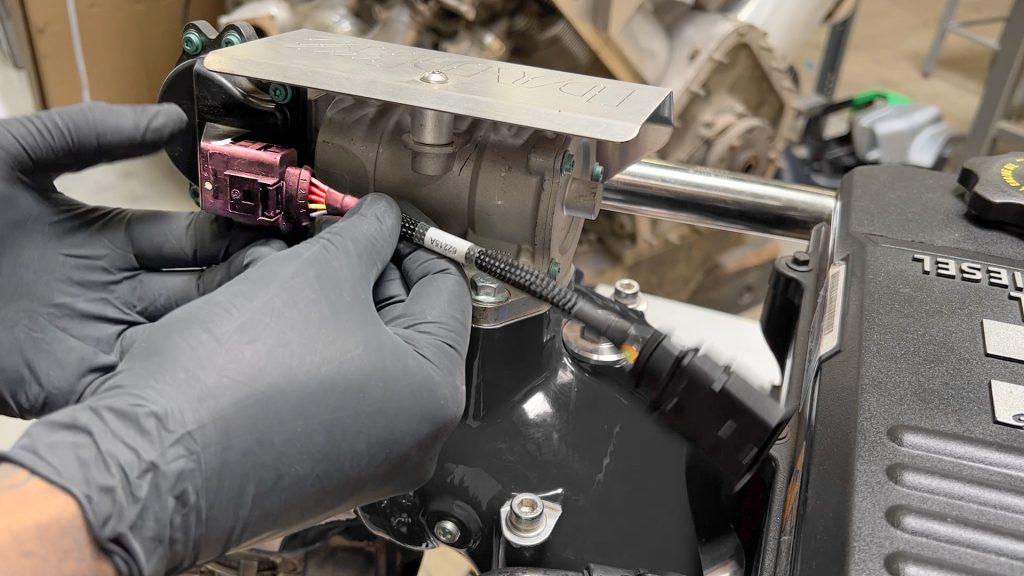
18. Remove EGR Valve Plug – Located On Back of EGR Valve
Slide lever back until it clicks, then separate.
EGR Tube Removal
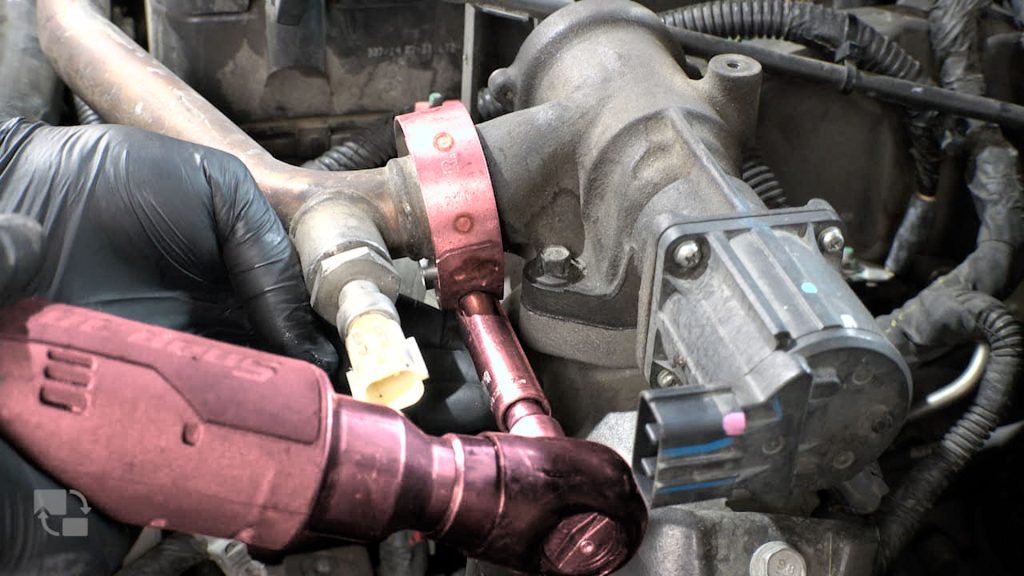
19. Loosen EGR Clamp Driver’s Side
Use a small flat blade to release the clip.
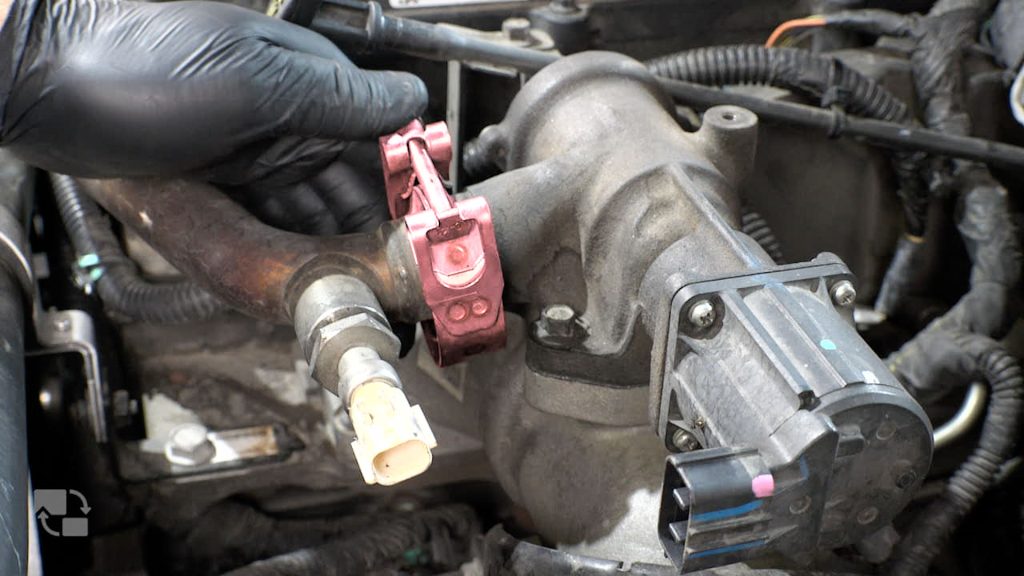
20. Flip EGR Clamp Upside Down for Easy Access Later
Do not remove the clamp yet.
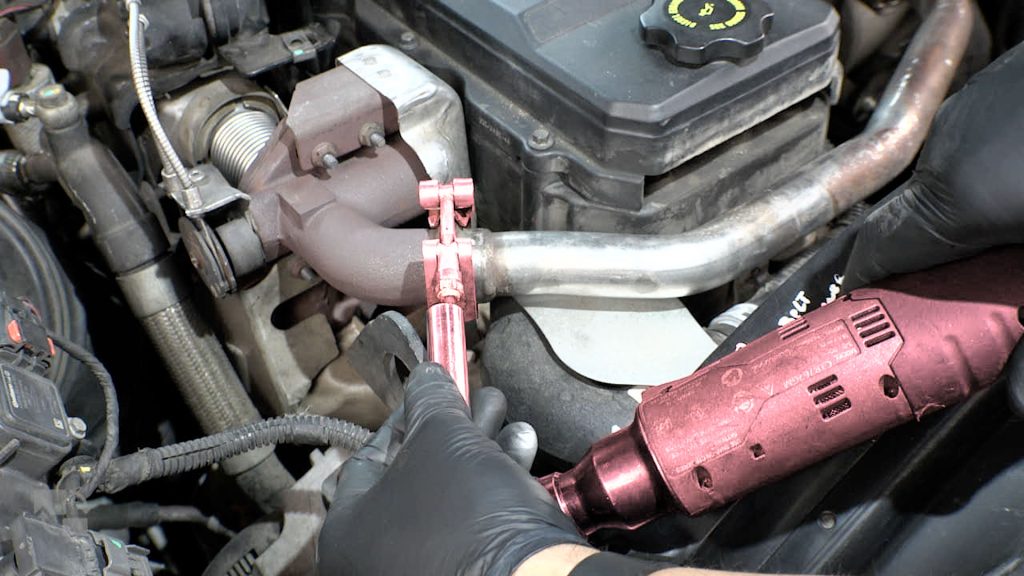
21. Loosen EGR Clamp Passenger Side
Do not remove this clamp yet (A gasket will slip out and fall if you do)
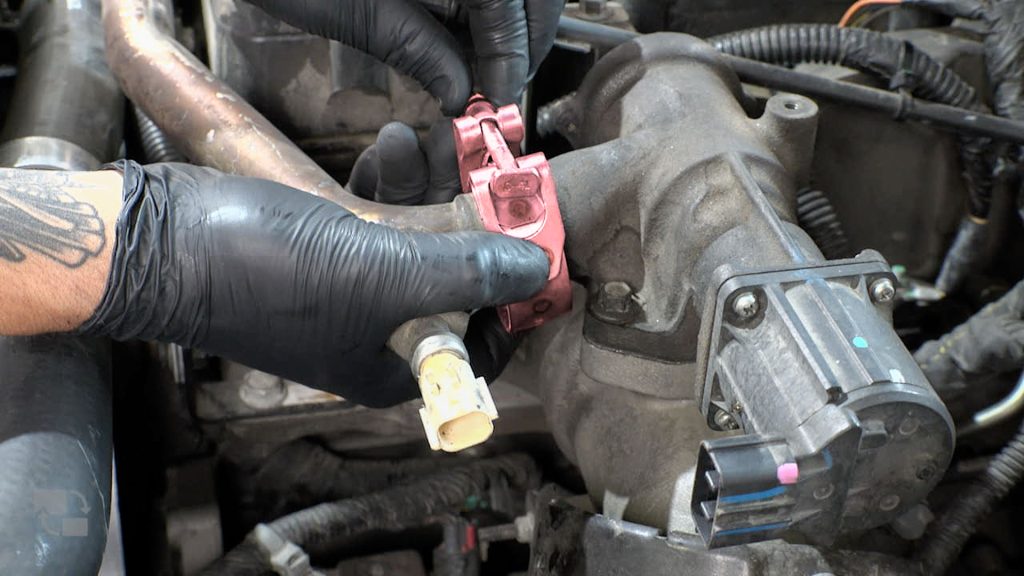
22. Release Driver side EGR Clamp
Keep a hand under the clamp incase the gasket comes loose.
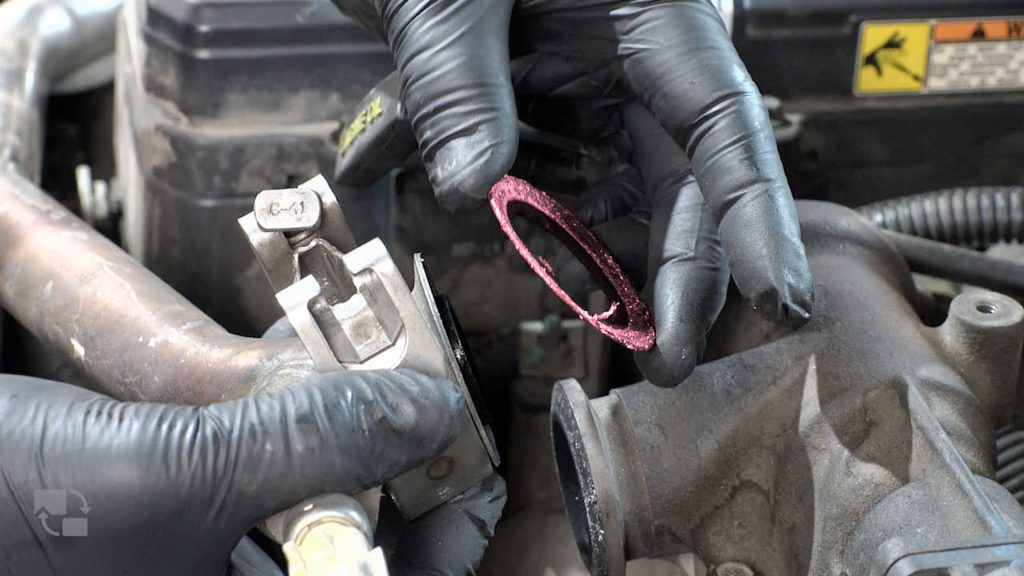
23. Release Clamp & Remove Gasket
Catch the gasket and put aside for later, this will be used again.
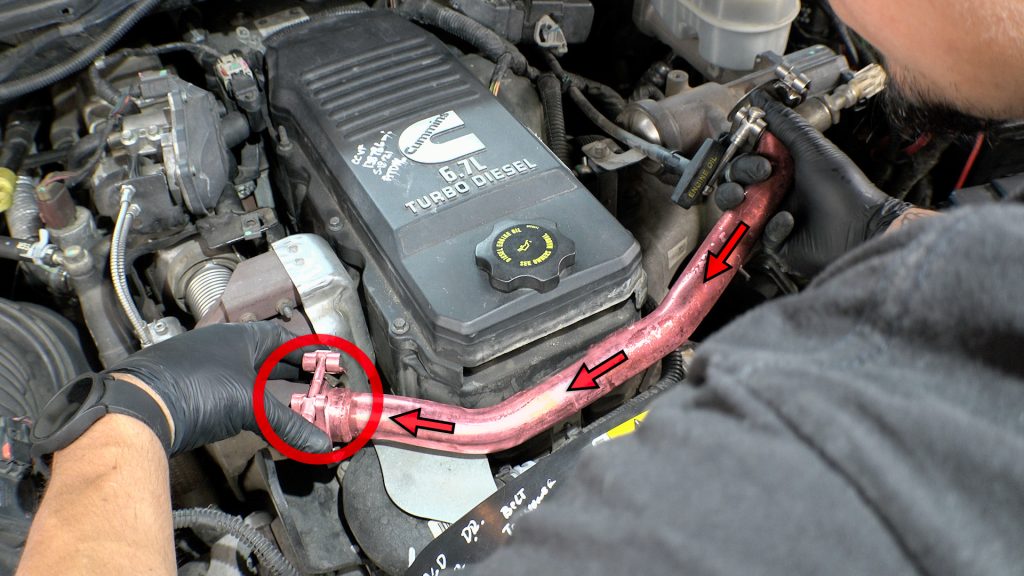
24. Release Passenger Side EGR Clamp
Apply pressure to keep the gasket in place and Keep your hand under the passenger side clamp to prevent the flat EGR gasket from falling into the engine bay.
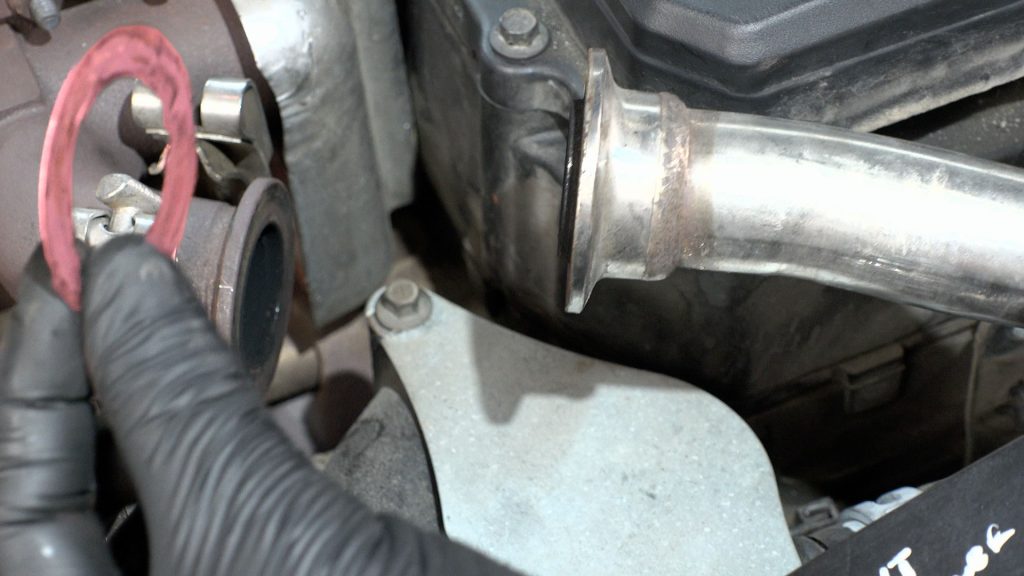
25. Catch EGR Gasket From Falling
Intake Elbow Removal
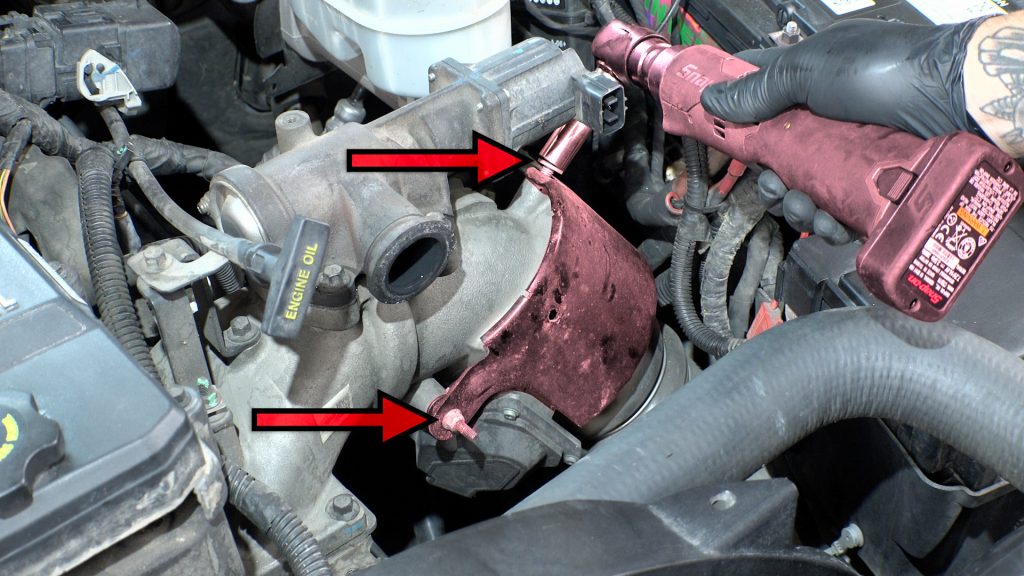
26. Remove Throttle Heat Shield
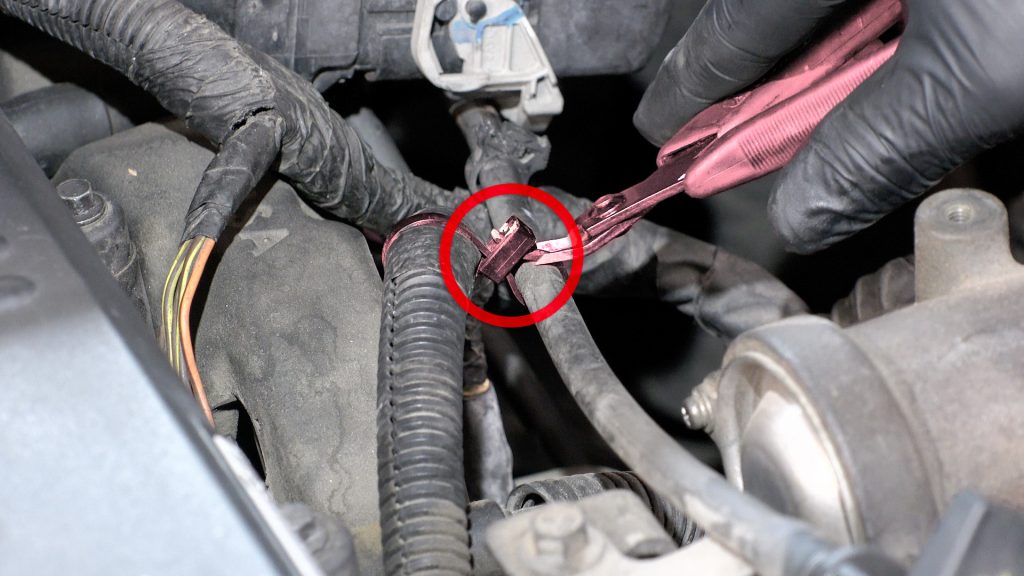
27. Cut Dip Stick Tube Zip Ties
Free up the thick 12V wire for the grid heater.
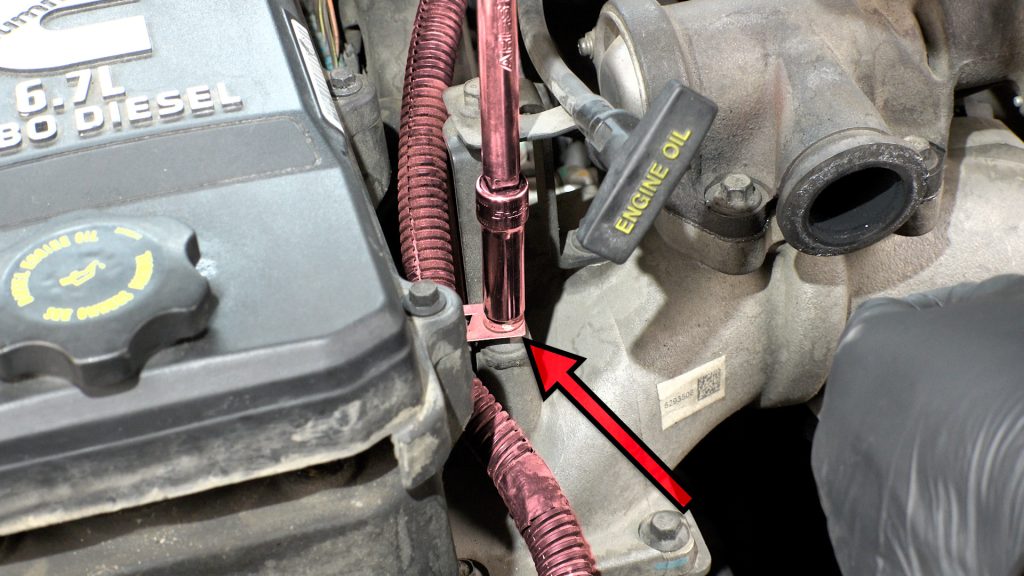
28. Remove 12V Harness P-Clamp
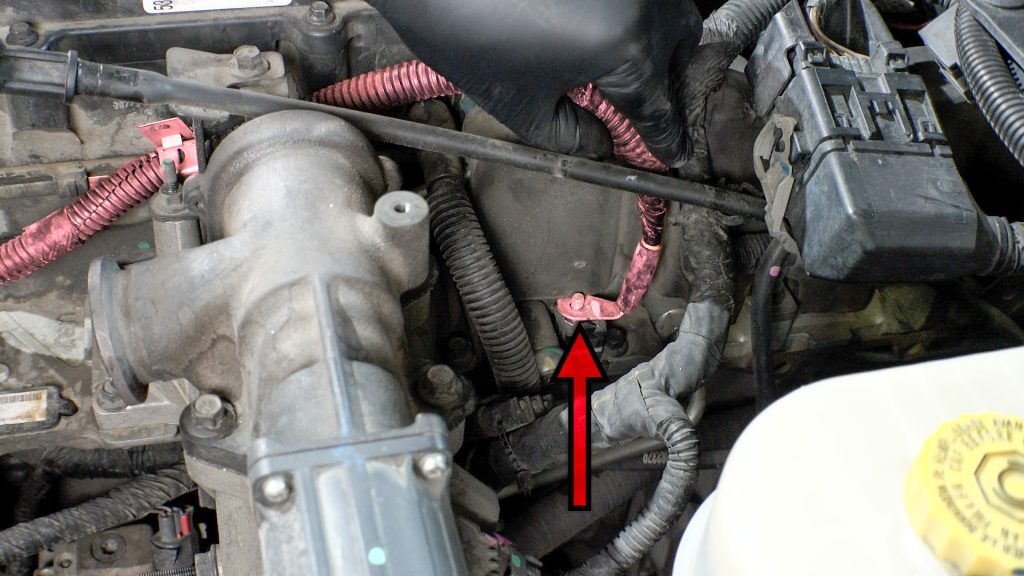
29. Remove Heater cable from Terminal
Relocate the wire out of the way once the free.
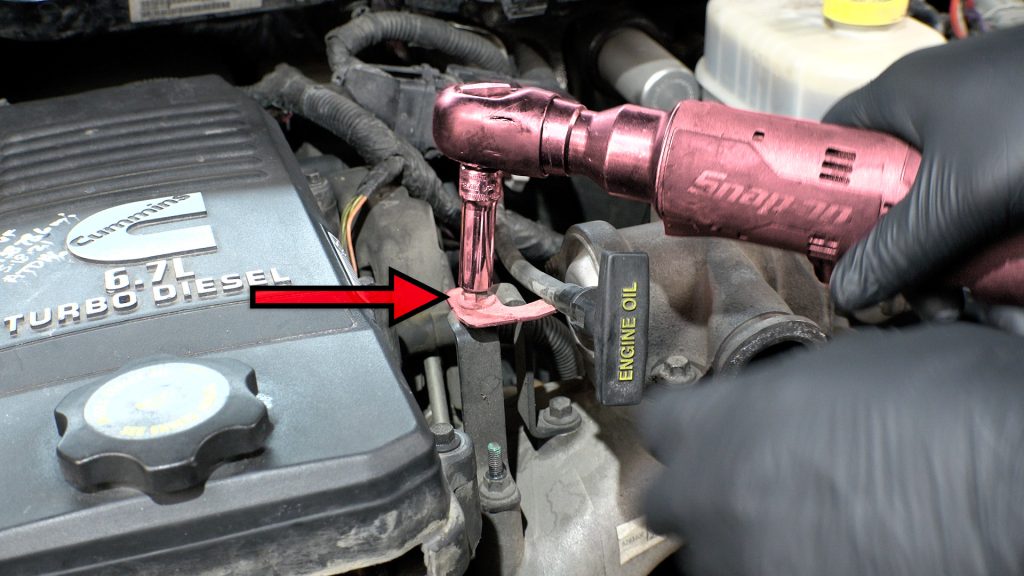
30. Remove Dipstick Tube Bracket
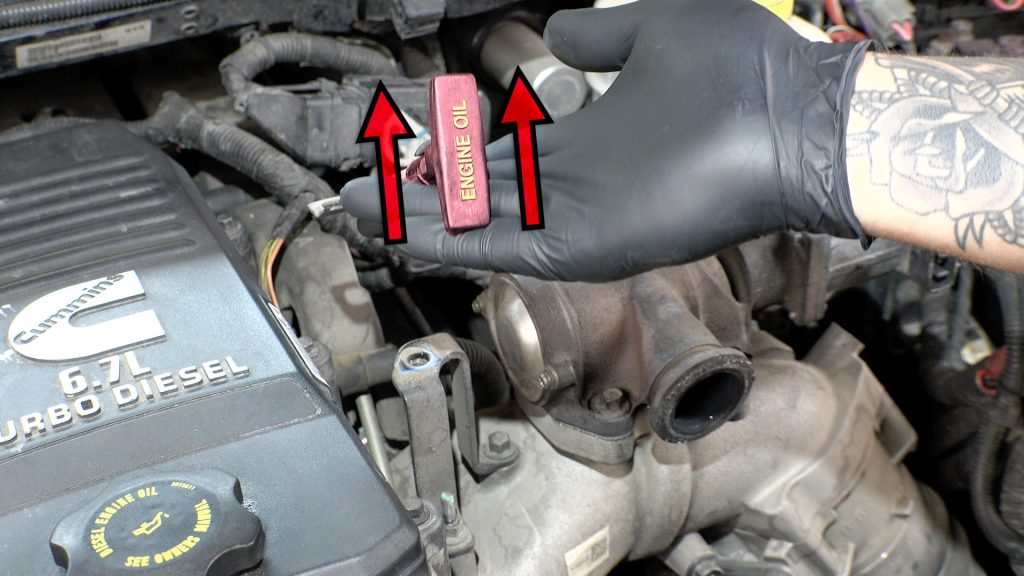
31. Bend Tube Up Slightly
The Monster-Ram is slightly taller than the factory Intake Elbow; you’ll fine-tune this bend after the Monster-Ram is installed.
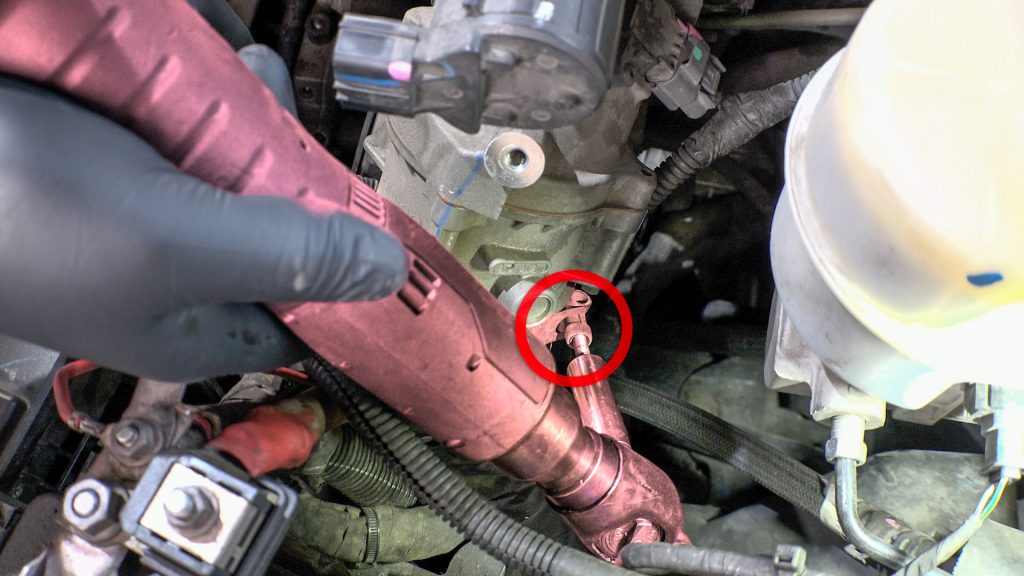
32. Loosen Boost Tube Clamp
This does not have to be fully removed, just release tension on the hose
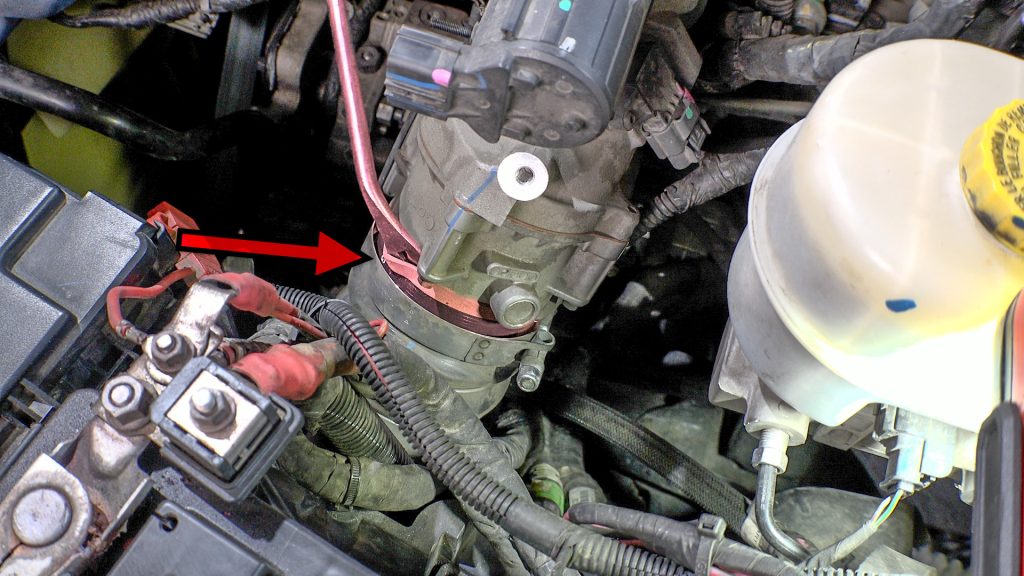
33. Pry Boost Tube Hose Off Throttle Body
The hose may feel stuck or glued to the throttle body; carefully walk a panel popper tool around the tube to loosen its grip on the throttle body. This will make removal later on easier.
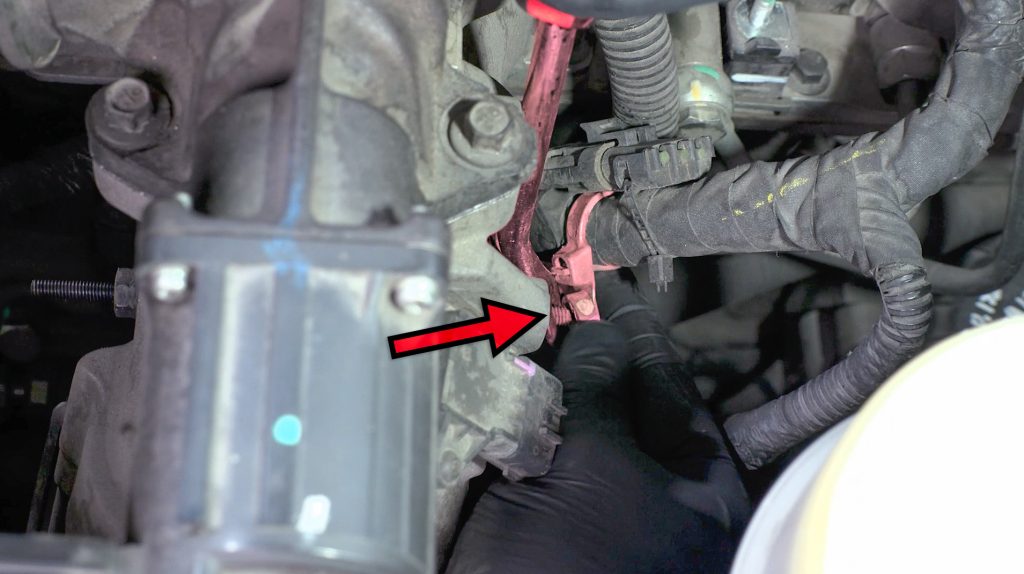
34. Remove Cable Tie Back of Elbow & Unplug MAP sensor
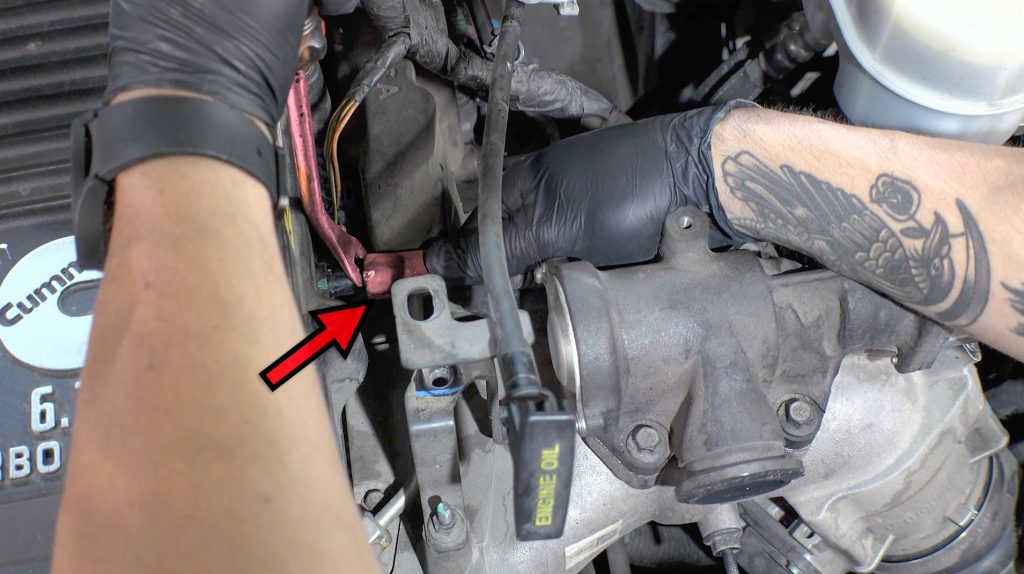
35. Remove Forward PCV Hose
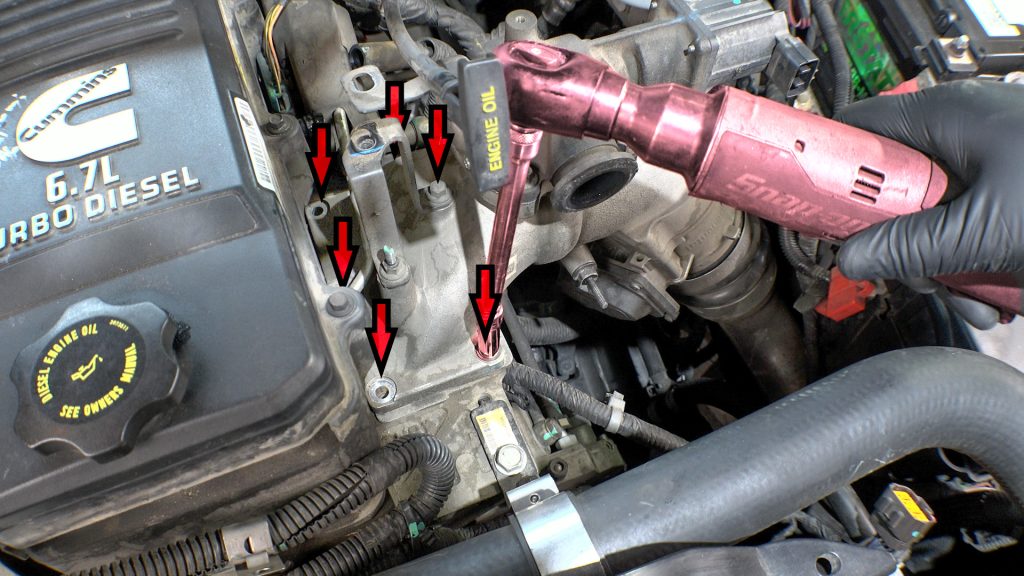
36. Remove 6 Bolts on Elbow
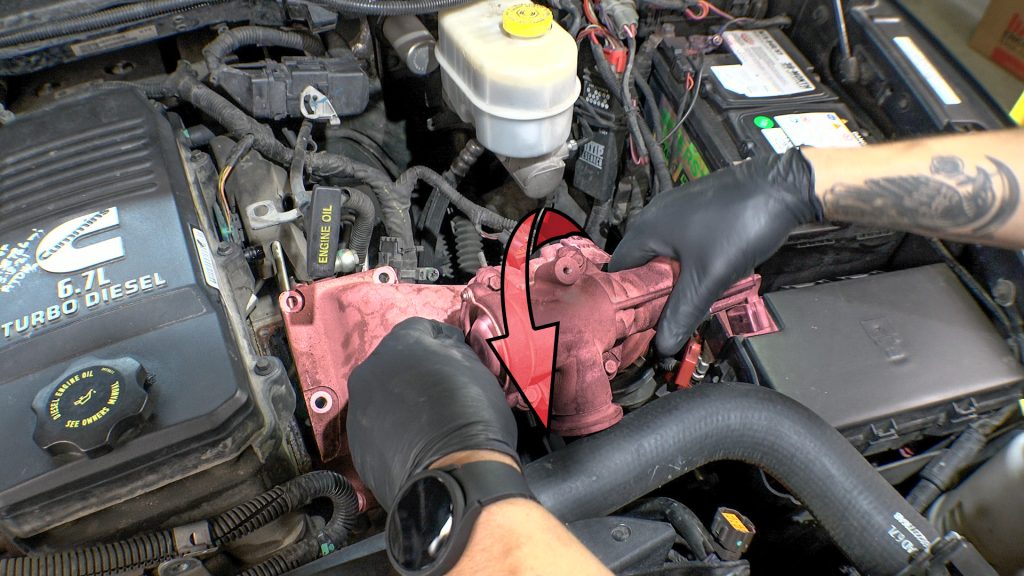
37. Lean Elbow Toward You & Dislodge Boost Tube
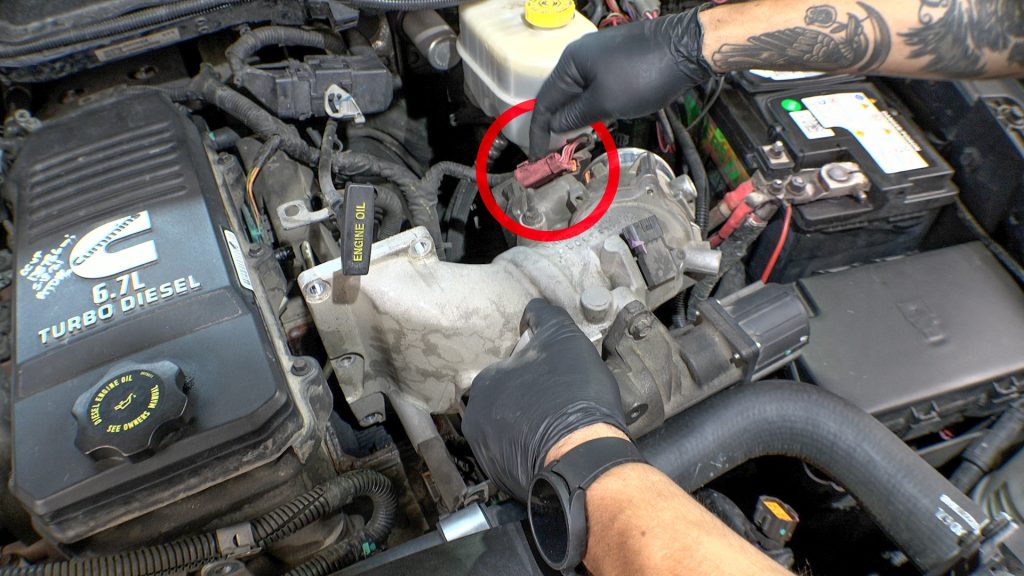
38. Remove Throttle Control Plug
Now that the elbow has been twisted toward you, you can easily reach this plug.
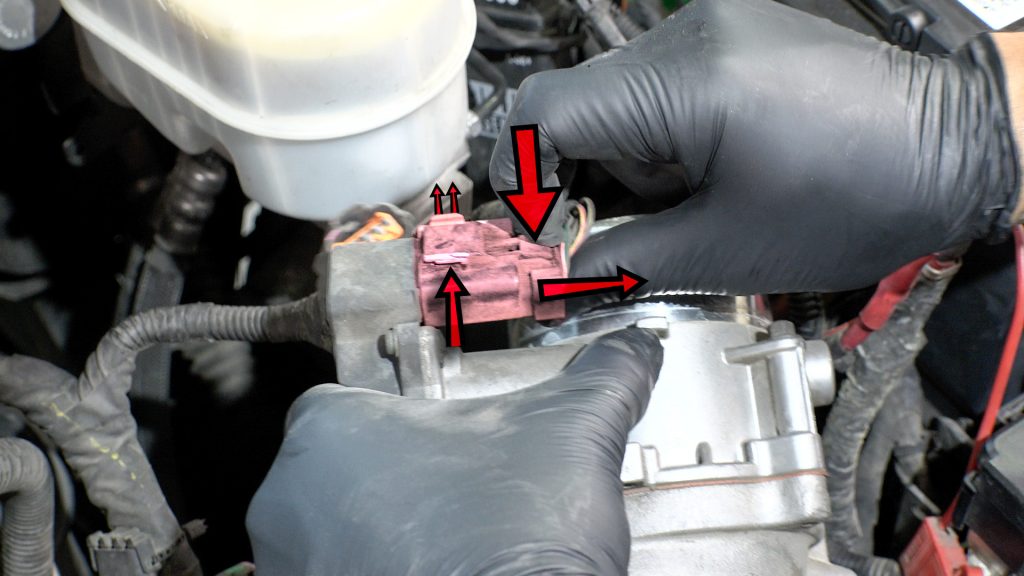
Slide tab over to remove the plug, Depress the end, and pull to remove the plug.
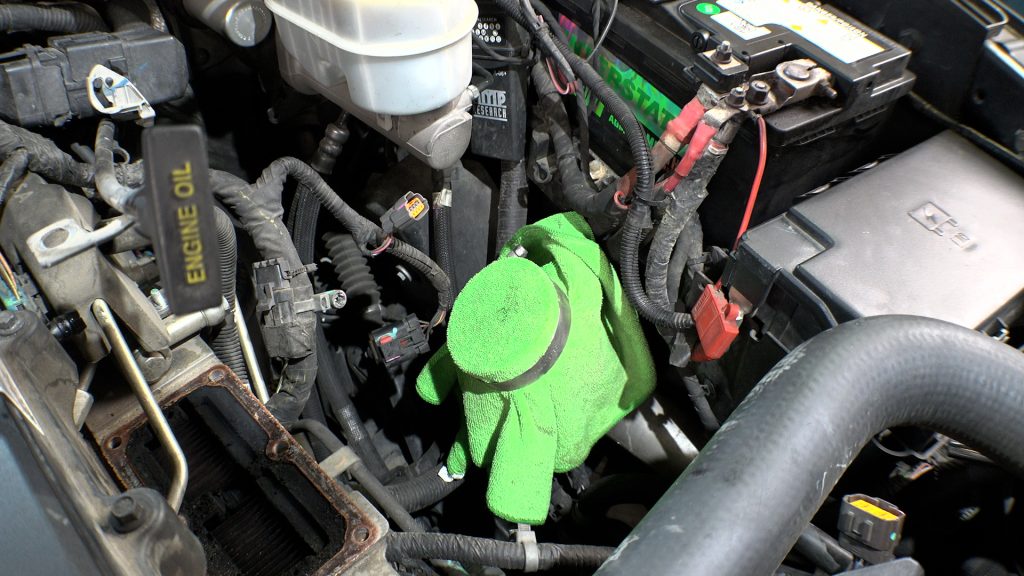
39. Place Rag & Clamp Over Boost Tube
Factory Heater Plate Removal
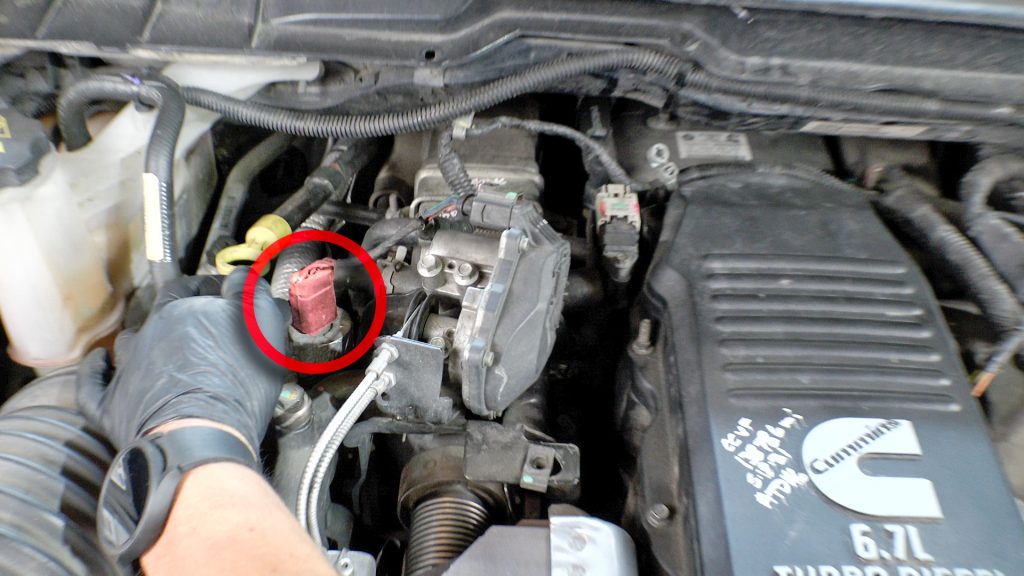
40. Disconnect First Passenger Side Plug
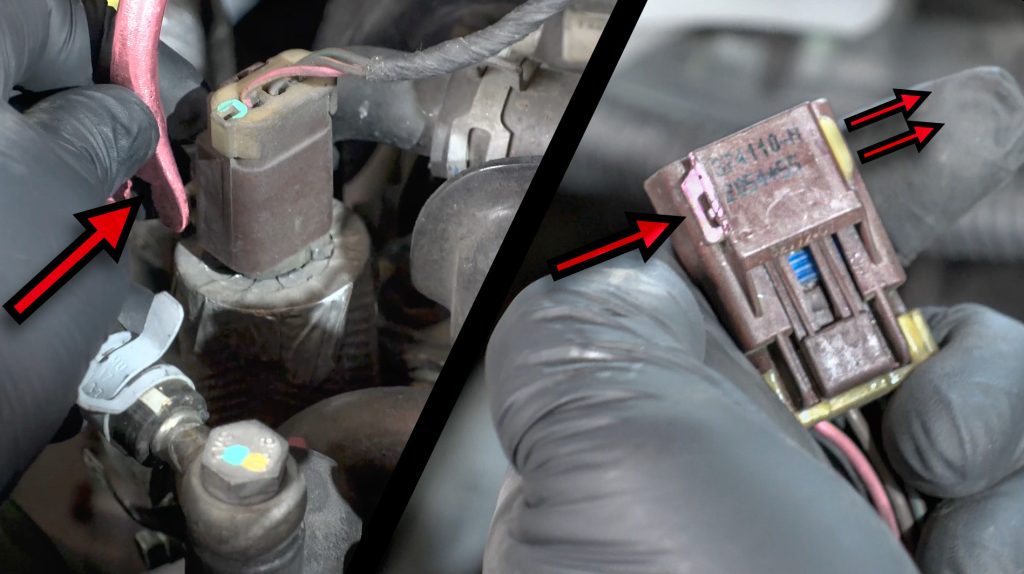
40a. Disconnect First Passenger Side Plug
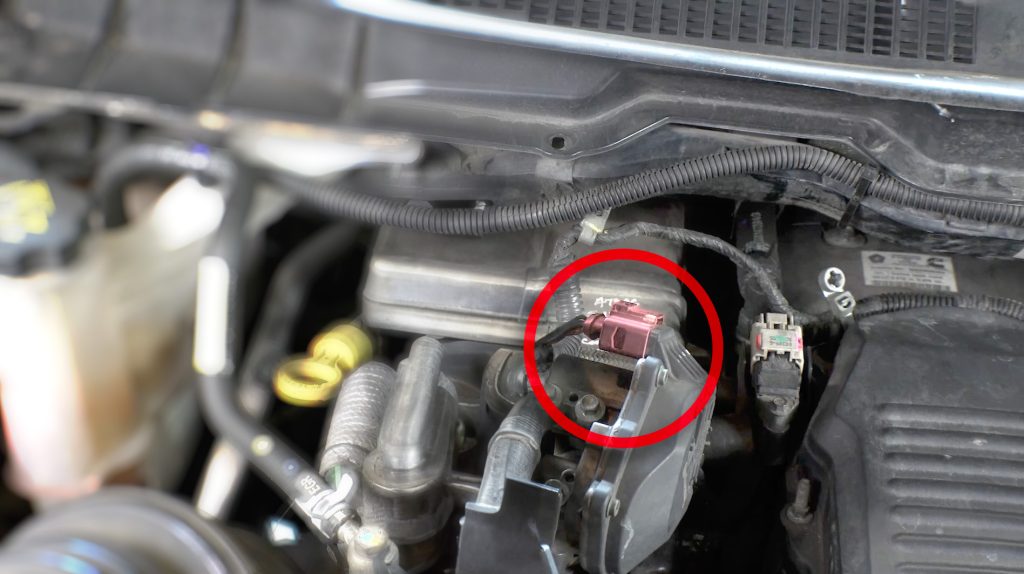
41. Disconnect Second Passenger Side Plug
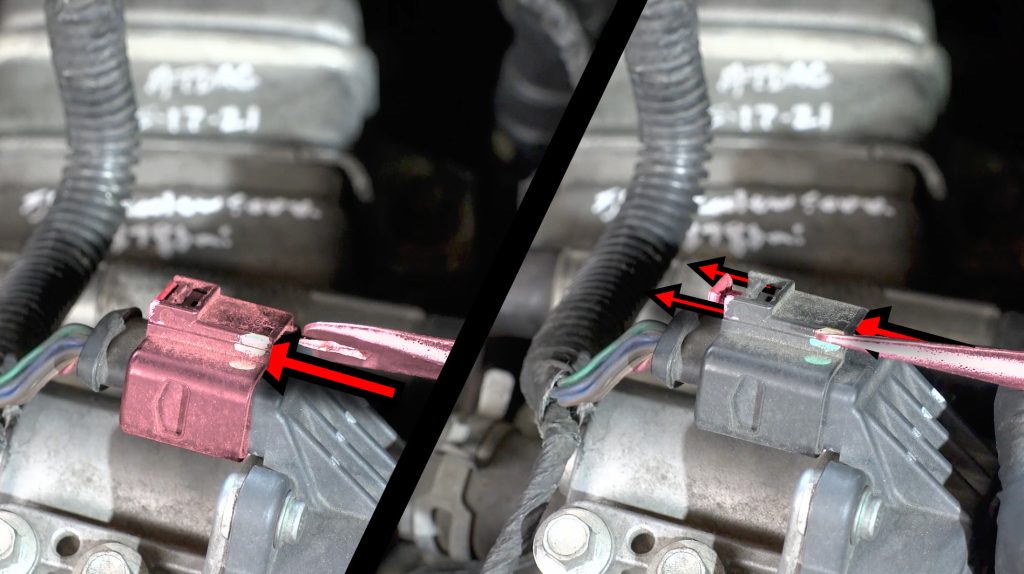
Slide Lock In
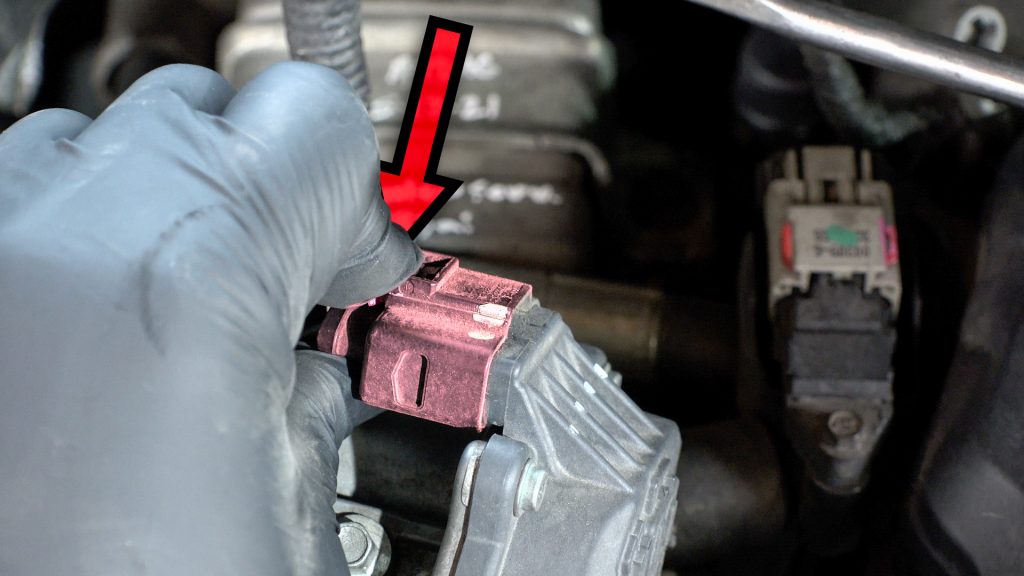
Depress button to release clip
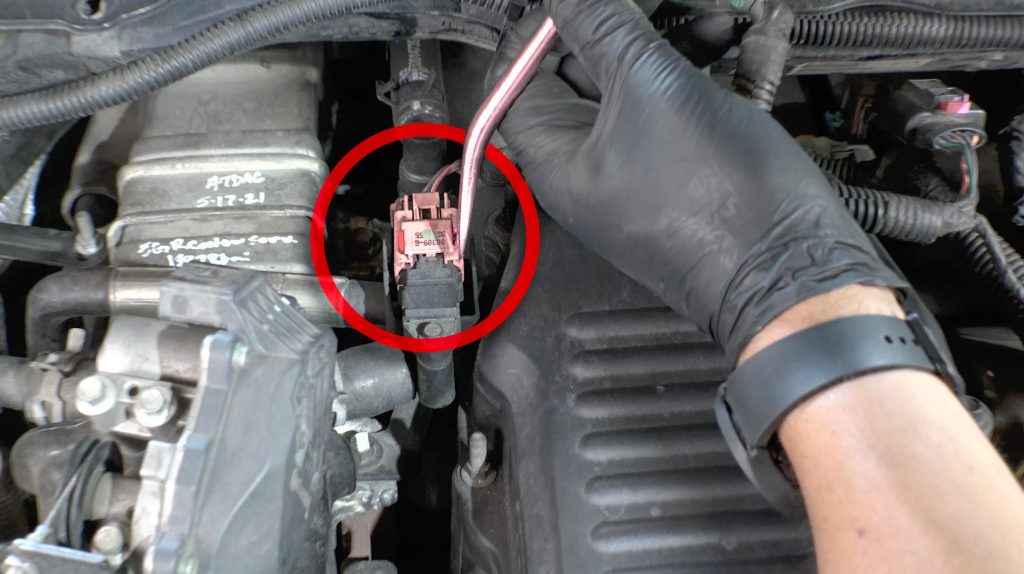
42. Disconnect Third Passenger Side Plug
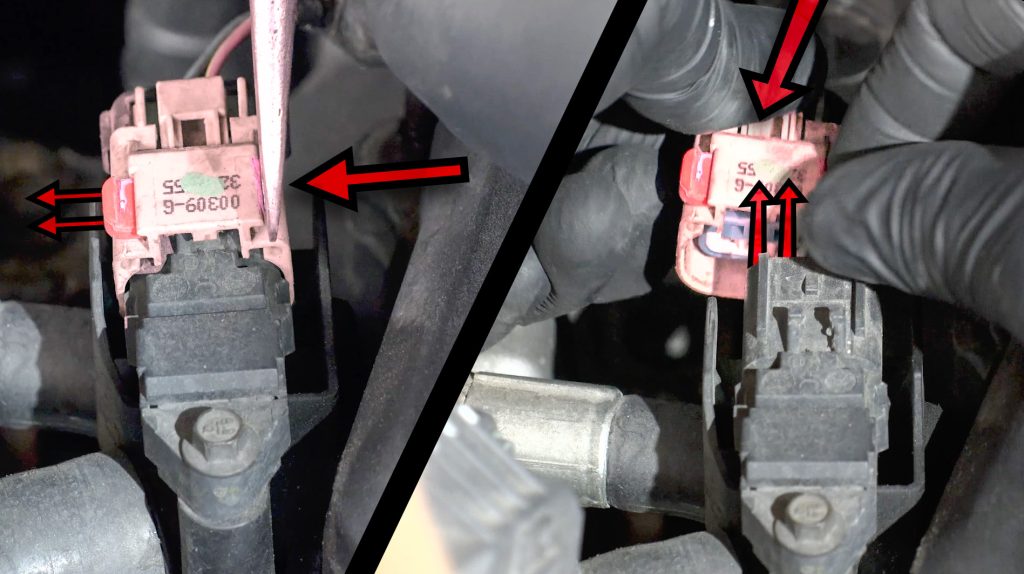
42a. Disconnect Third Passenger Side Plug
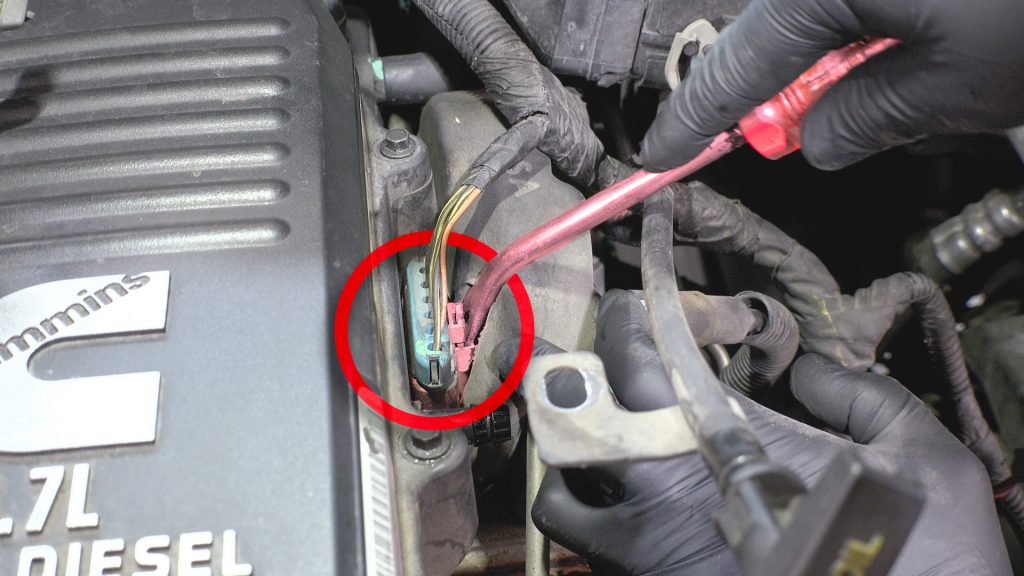
43. Disconnect Flat Blue Driver Side Plug
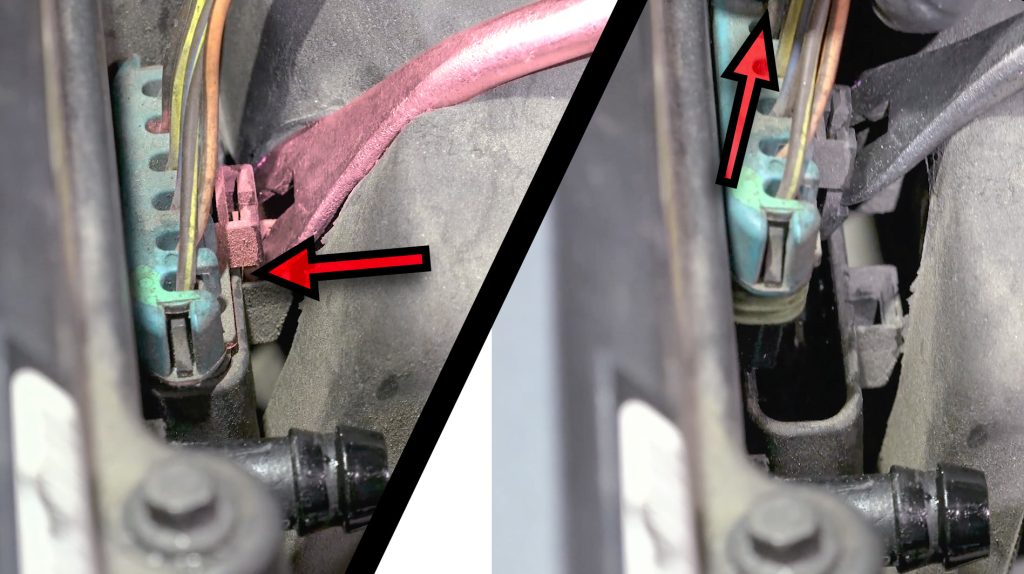
43a. Press in the clip with a flat tool, and pull up.
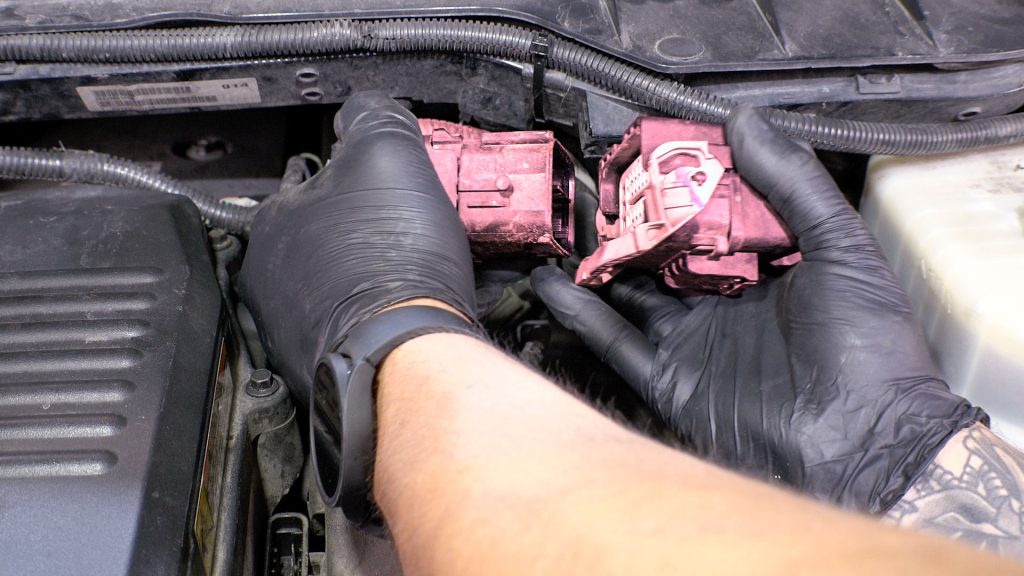
44. Disconnect Large Driver Side Engine Harness
Depress clip and fully rotate the white lock, then pull to disengage. May need some force due to dust, grime, etc.
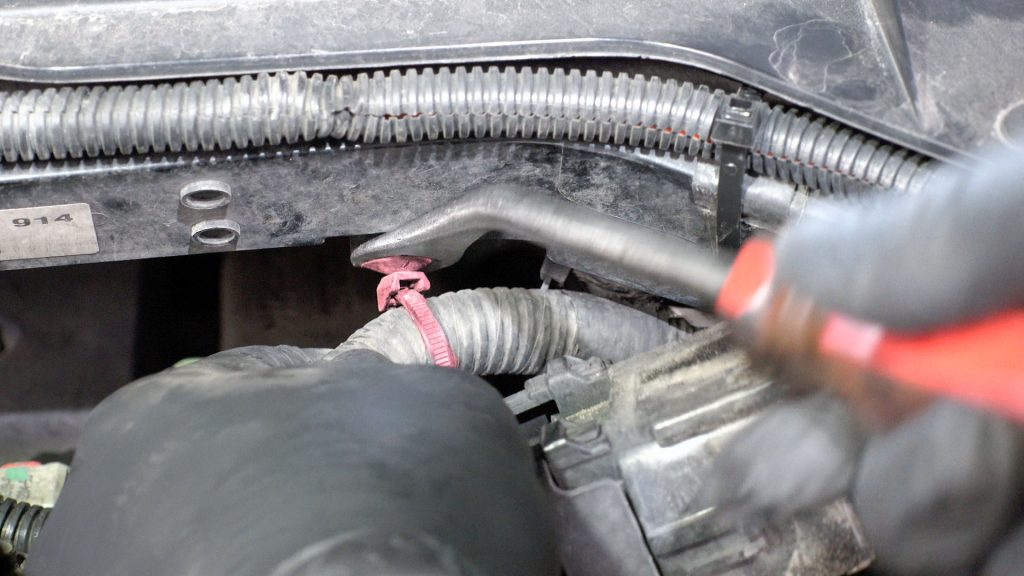
Release cable tie
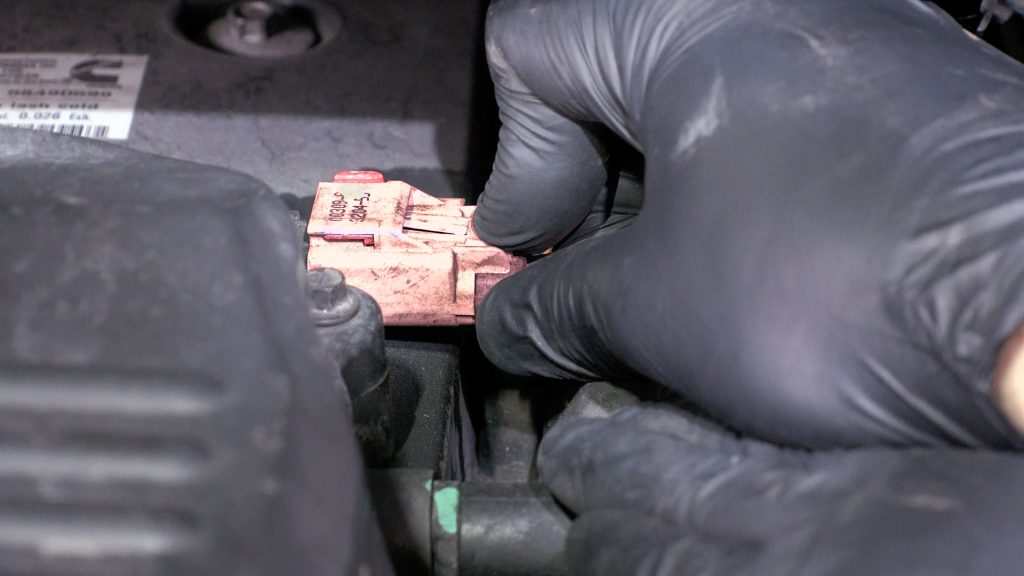
45. Remove Rear Driver Side Plug
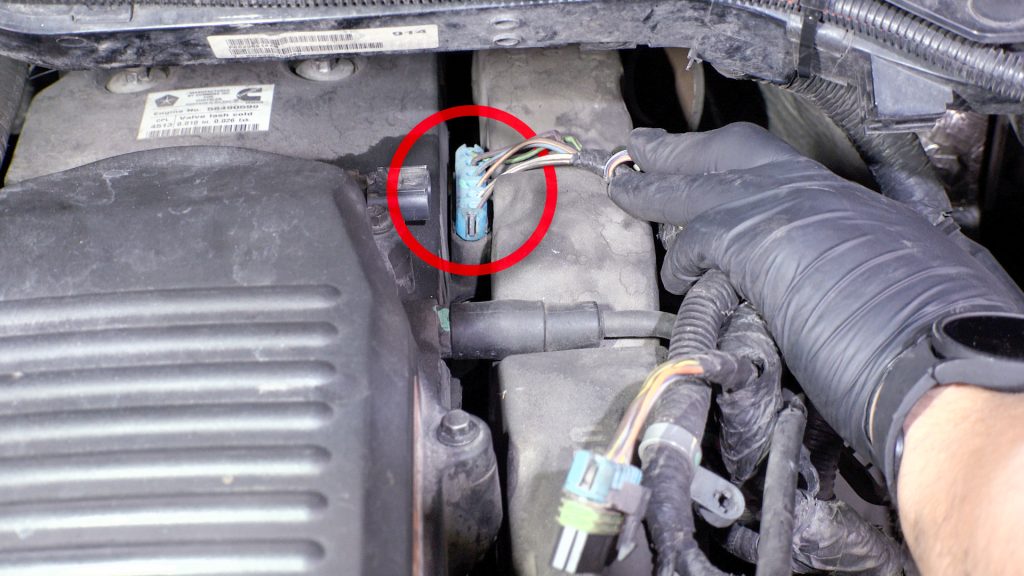
46. Remove Rear Driver Side Flat Blue Plug
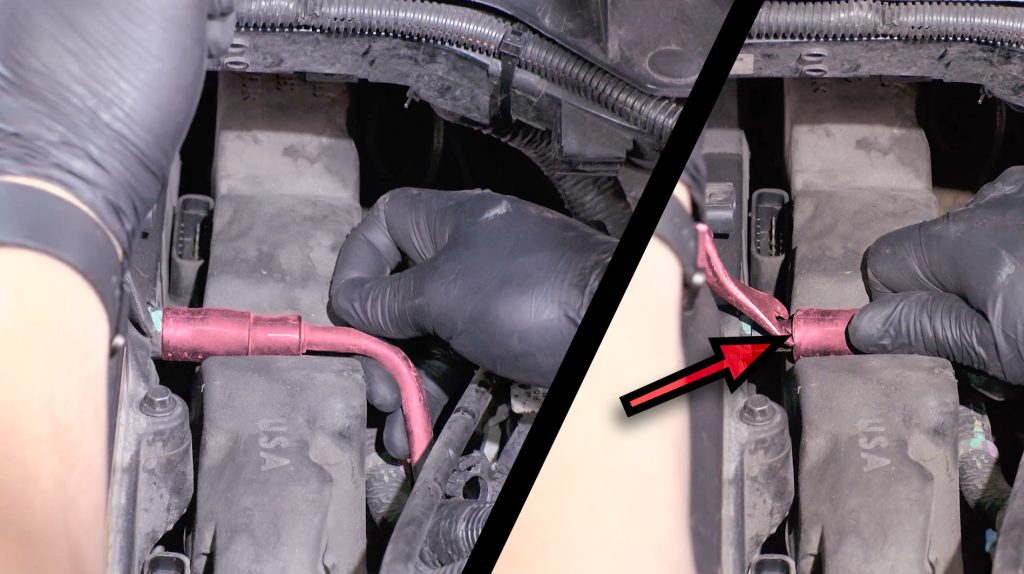
47. Remove Rear PCV Hose
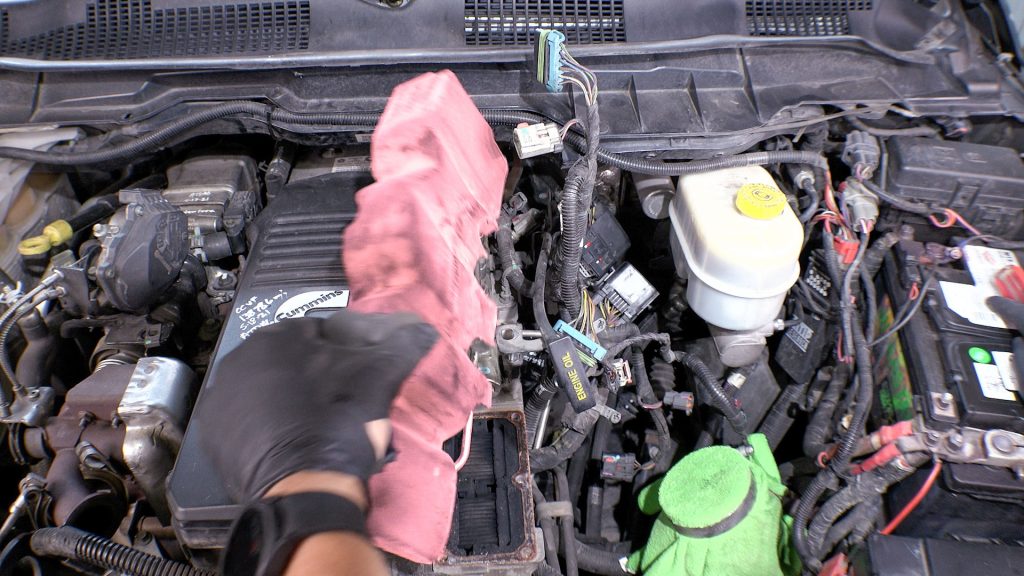
48. Remove Rubber Isolator
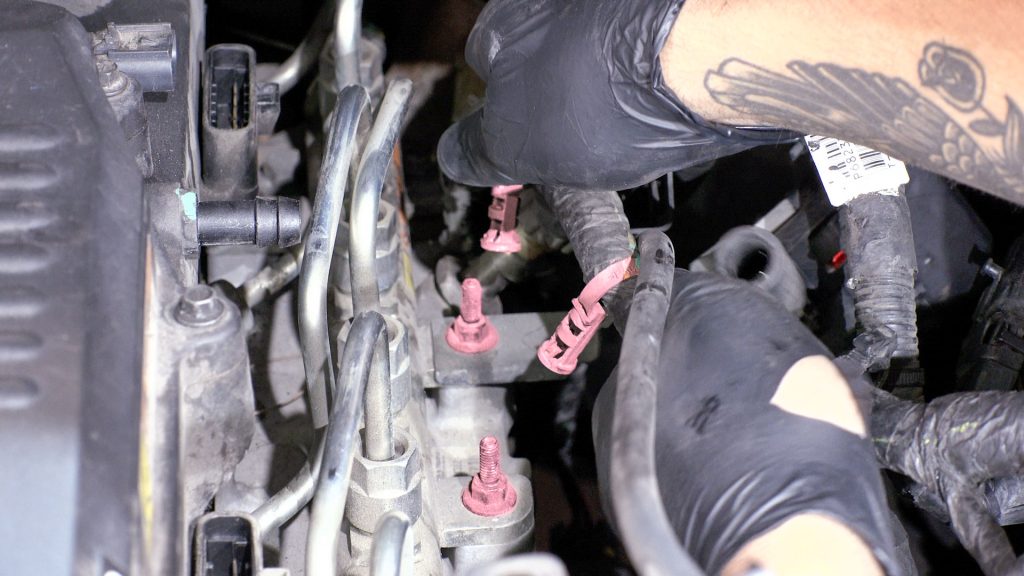
49. Remove Cable Ties from Driver Side Studs
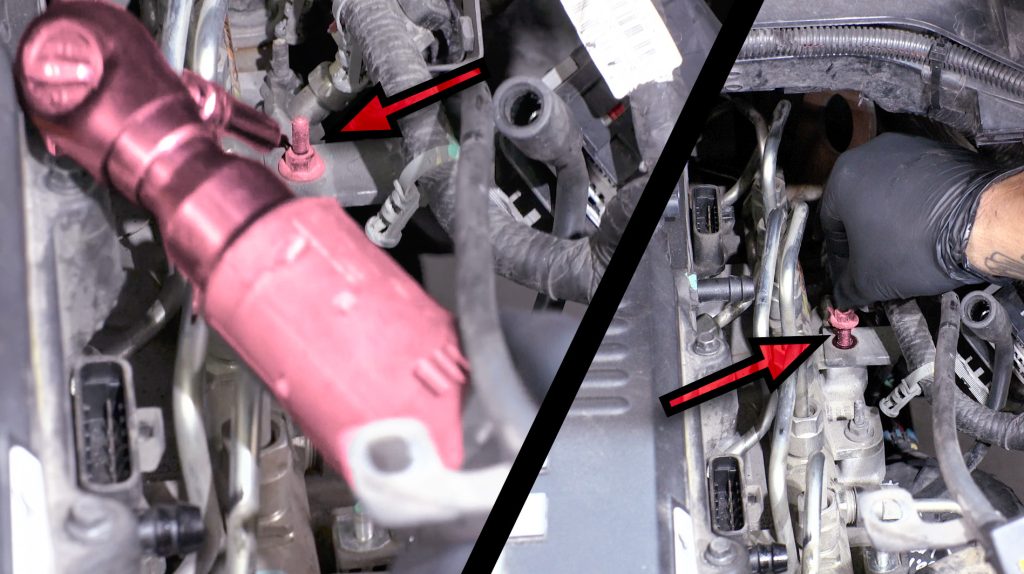
50. Remove Dipstick Tube Stud
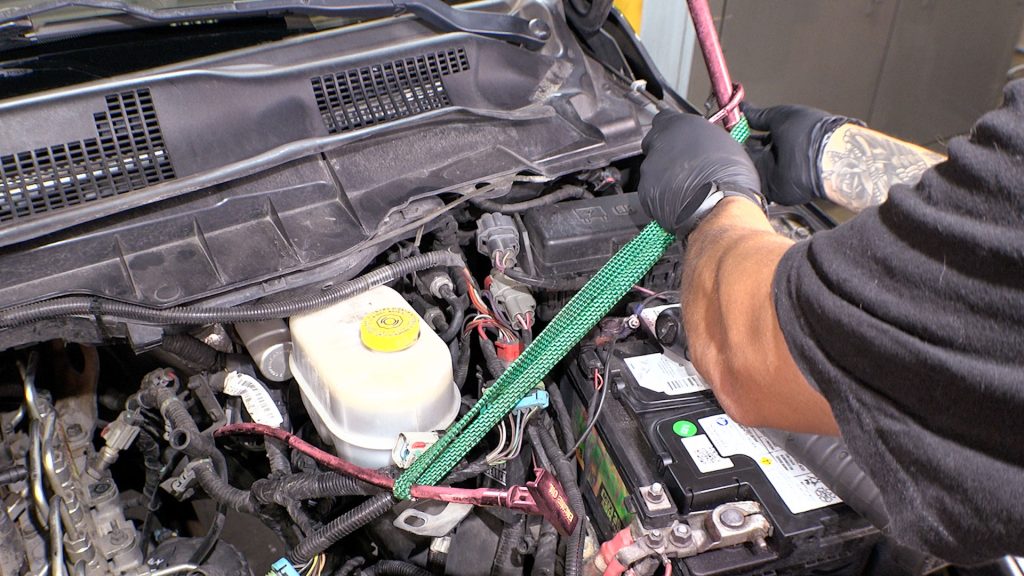
51. Bungee Cord The Dipstick Tube
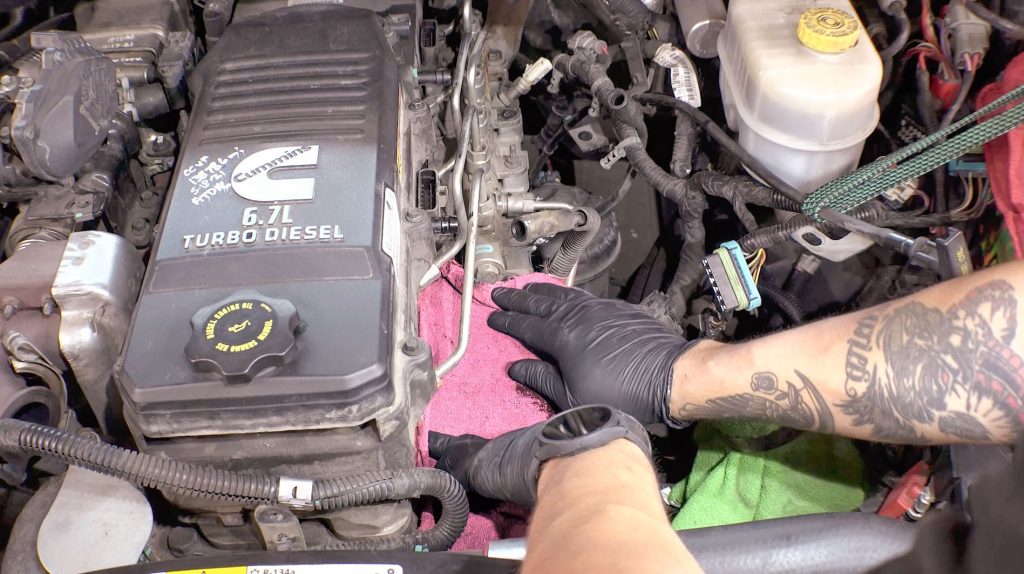
52. Place Rag Over Intake
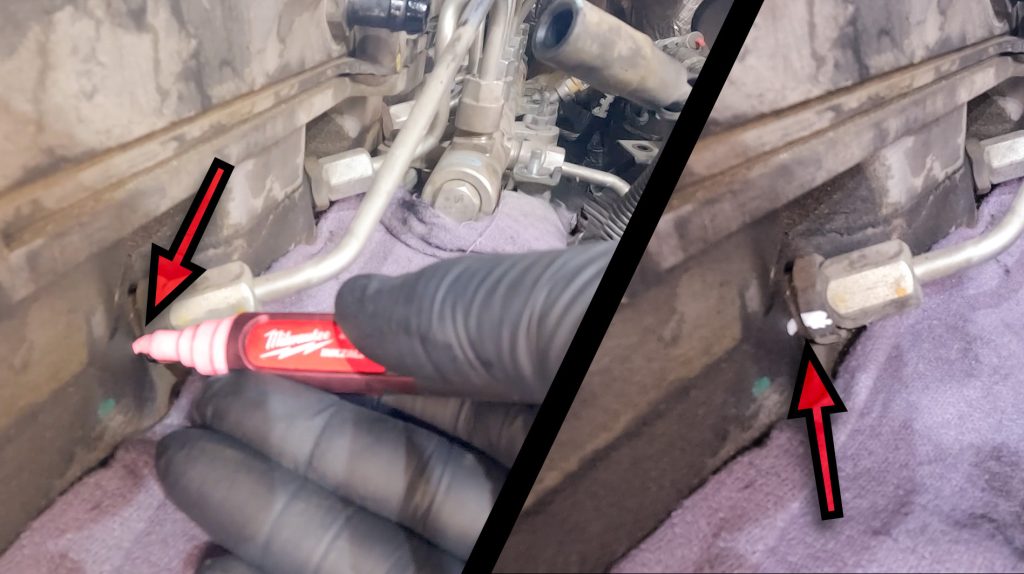
53. Paint Marker Line Across Threaded Insert & Cylinder Head
This will allow you to see if the threaded inserts into the head start to turn when loosening the fuel lines. You do not want the insert to spin loose, as this will cause a fuel leak.
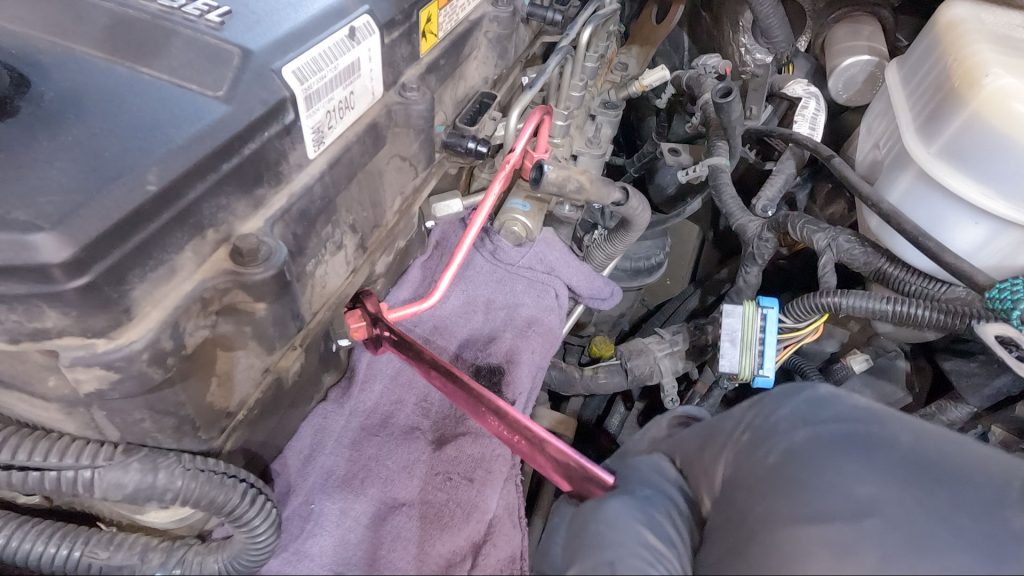
54. Remove Fuel Lines
If the inserts in the head start to move, use an open ended wrench to hold them inplace.
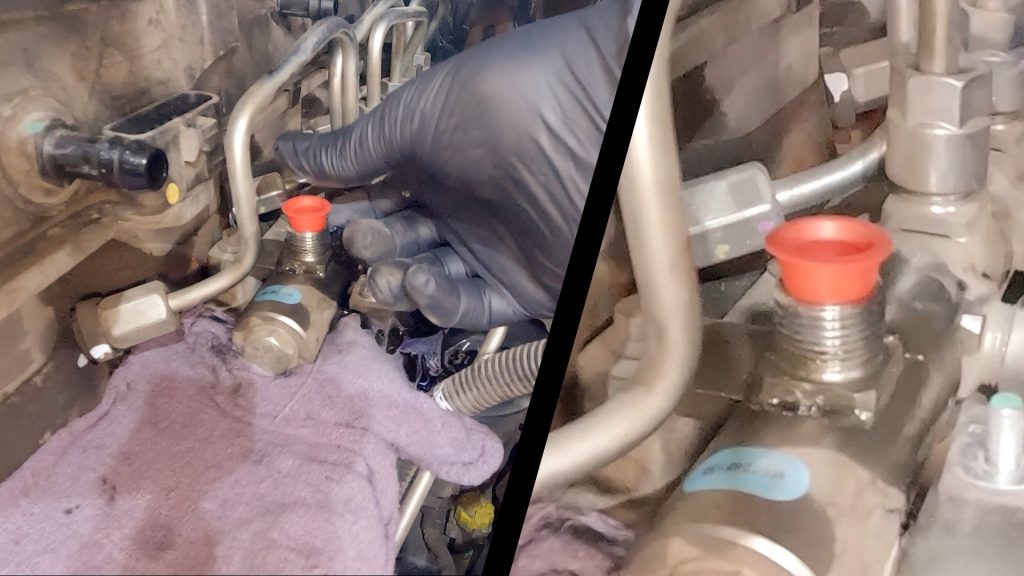
55. Install Dust Covers
Insert the covers, open end facing out. The caps should fit (inside) each blocked port.
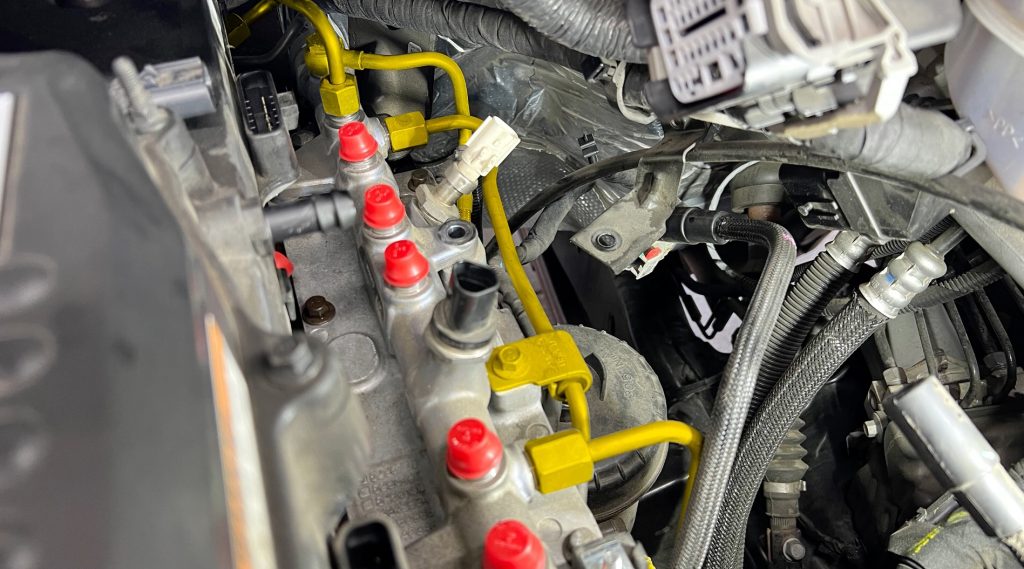
Note:
Depending on the build date, your 2019+ RAM may have several different high-pressure fuel feed and return lines configurations as Cummins has upgraded the fuel pump.
Just be sure you remove the nuts that fasten them to the fuel rail, and loosen the other end so you can move the lines out of the way.
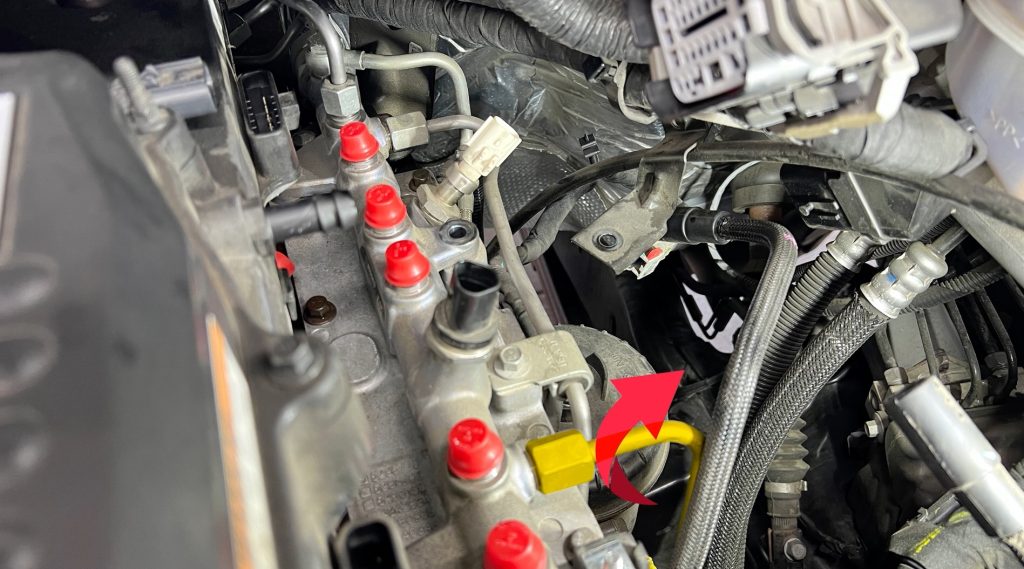
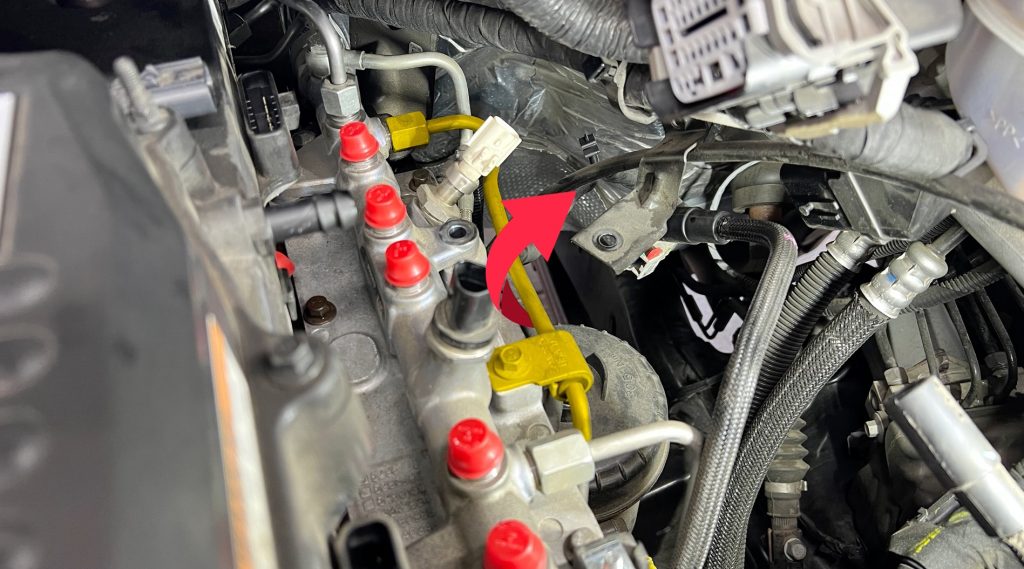
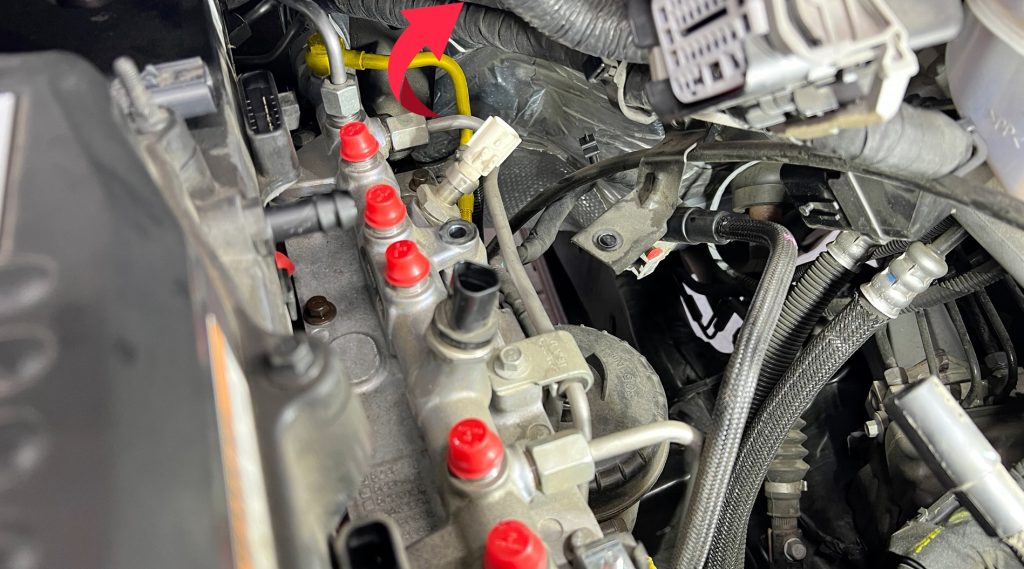
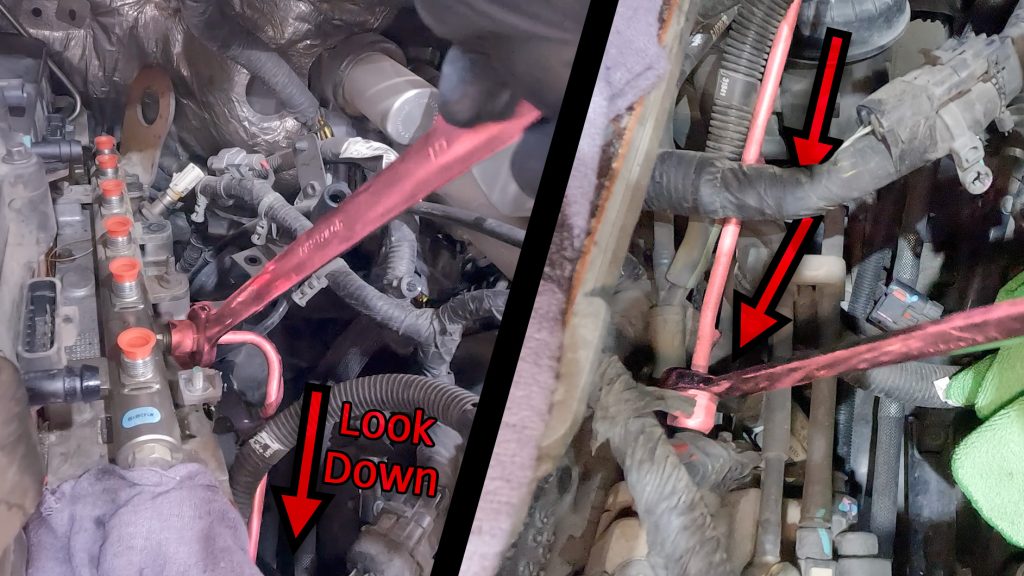
56. Loosen High Pressure Fuel Feed Line(s)
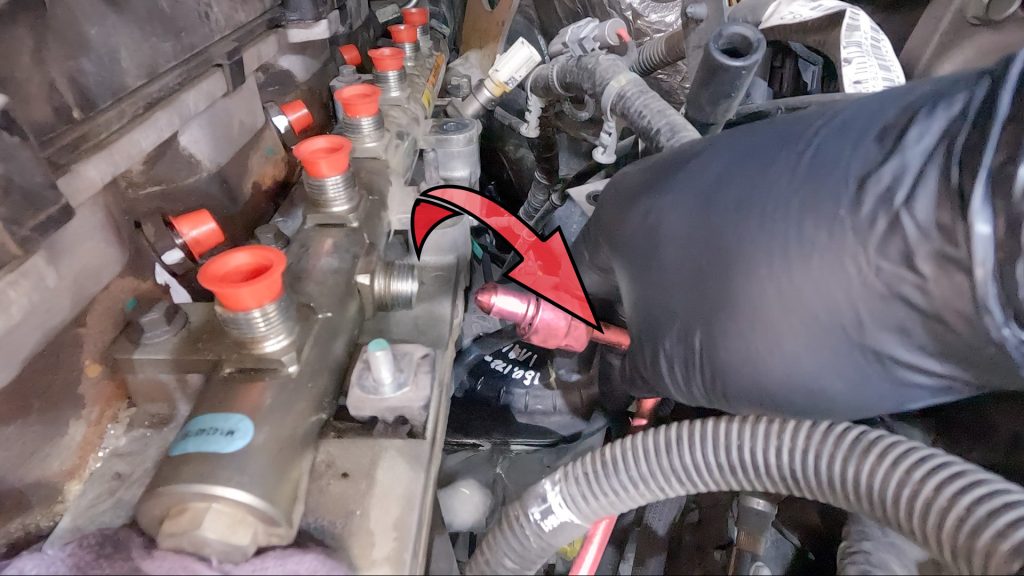
57. Swivel Back High Pressure Fuel Feed Line(s)
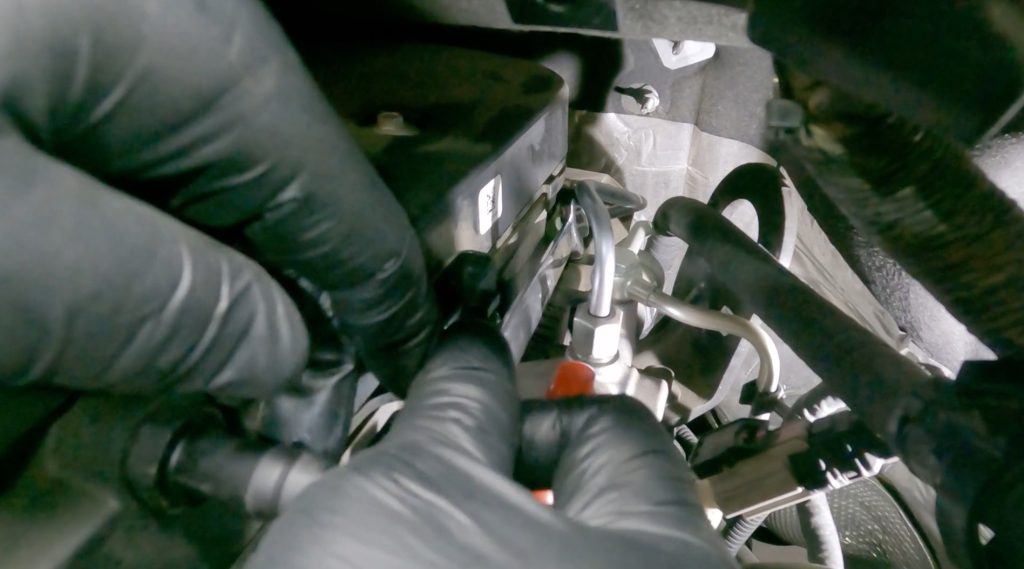
58. Loosen #6 Fuel Line & Rotate Out of Way
Do not fully remove the rear fuel rail. It is difficult to reach and only needs to be moved out.
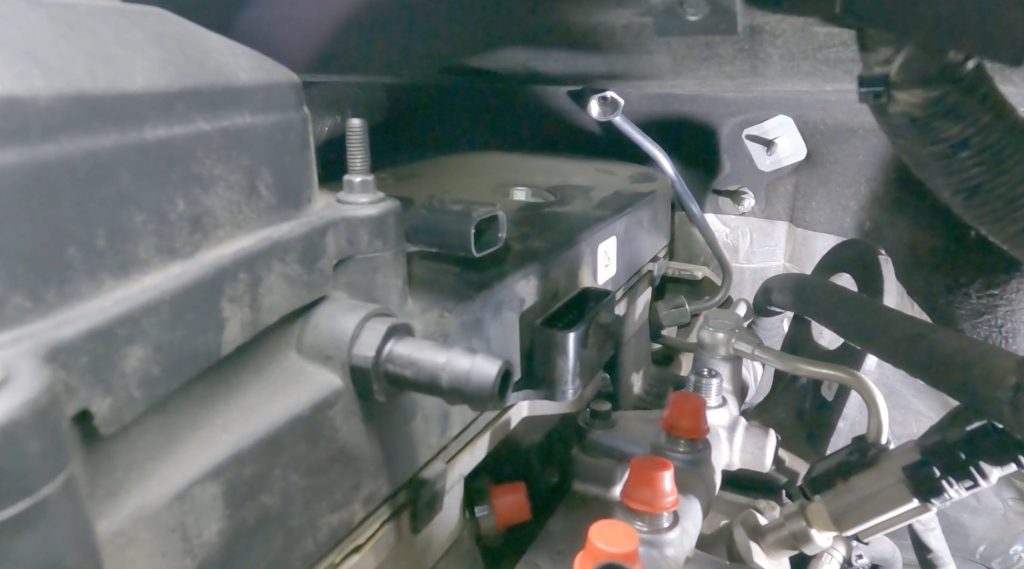
Do not fully remove the rear fuel rail. It is difficult to reach and only needs to be moved out of the way.
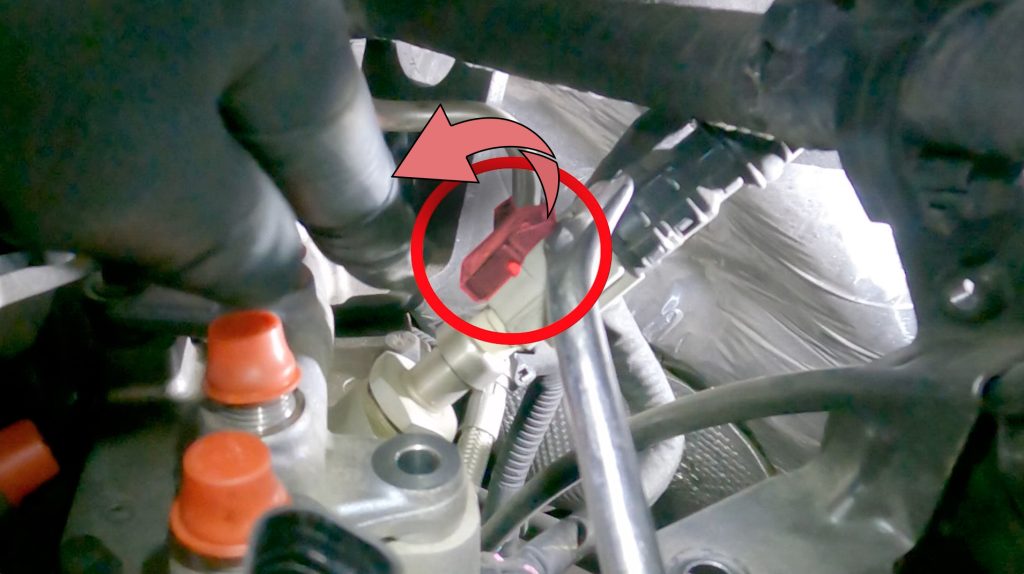
59. Rear Sensor Removal
Locate the rear thermocouple. Remove its black plastic cover by prying up & away from the sensor body.
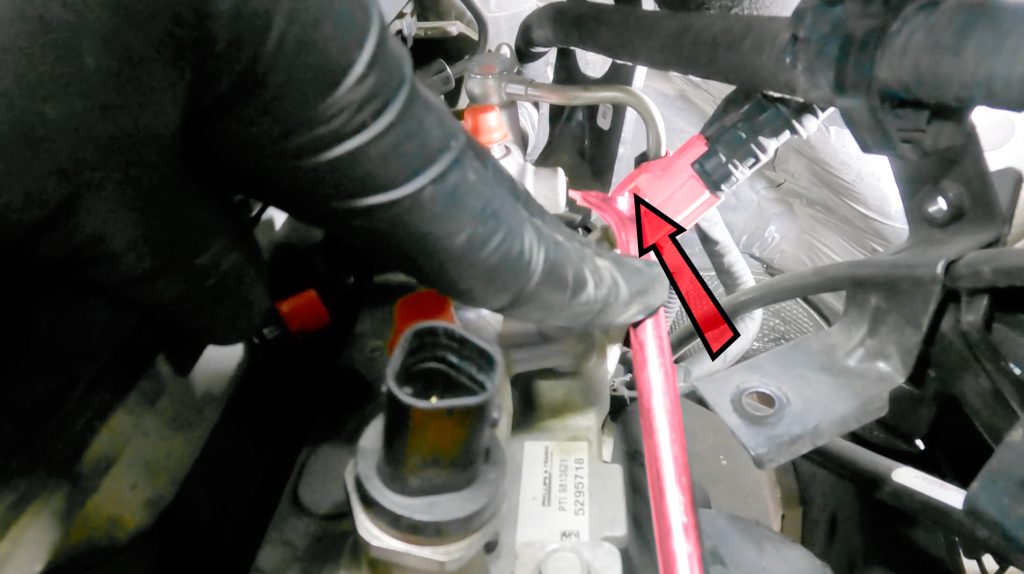
Once the cap is removed, press the small red locking tab in, then unplug the sensor.
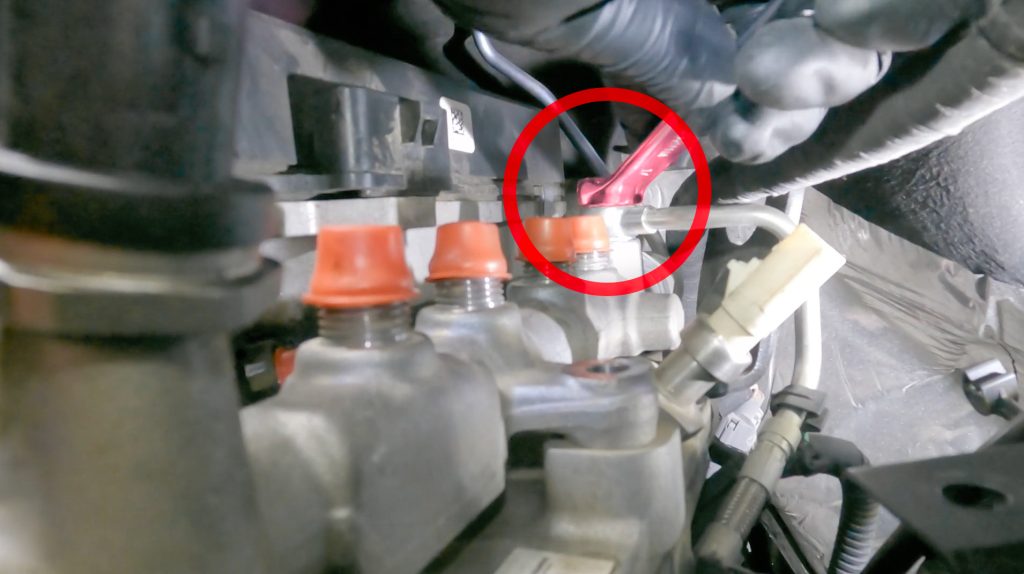
60. Loosen Rear Fuel Line
Note: There is a washer between the fuel rail and fuel line. Take care not to loose it when removing the banjo bolt.
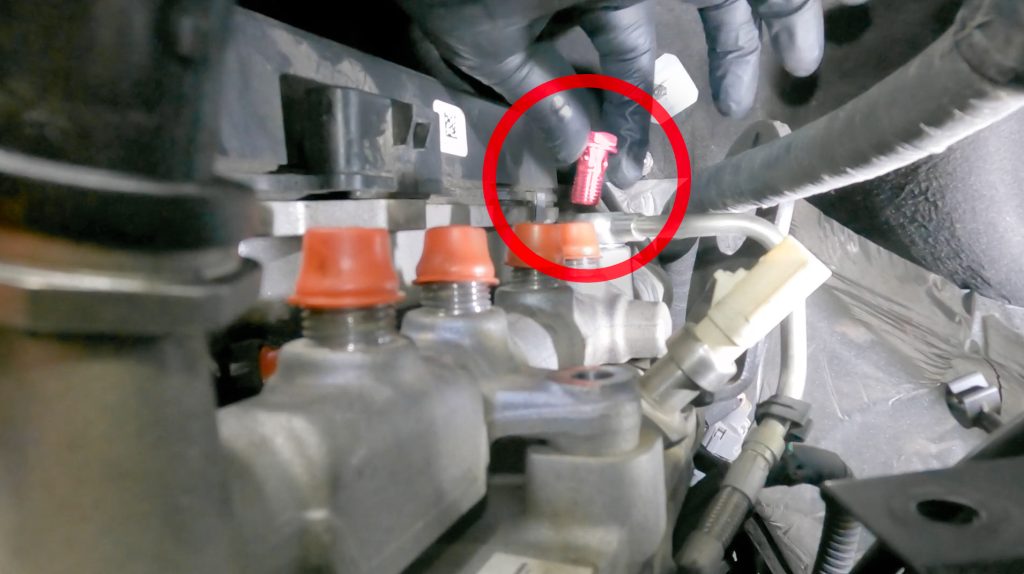
Carefully remove the banjo bolt from the fitting.
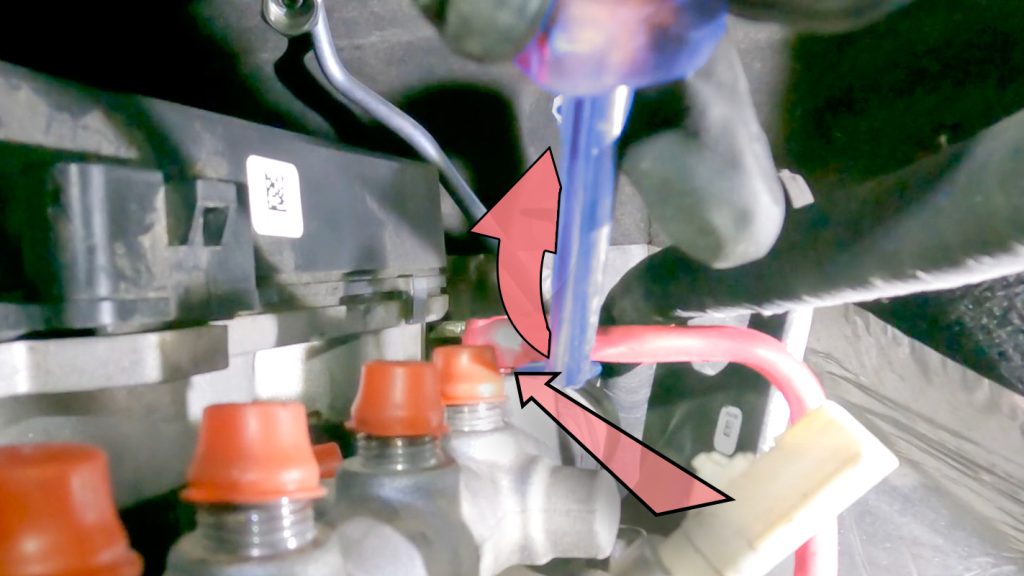
The hard line does not have to be fully removed. Carefully pry the fuel line up just a hair, and slide the washer out with a screw driver.
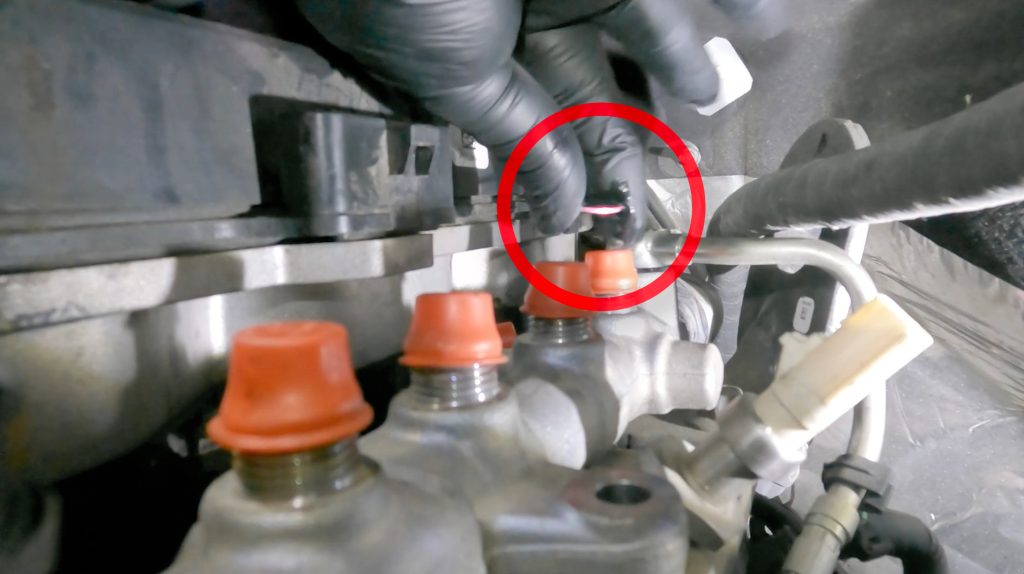
Don’t lose this washer.
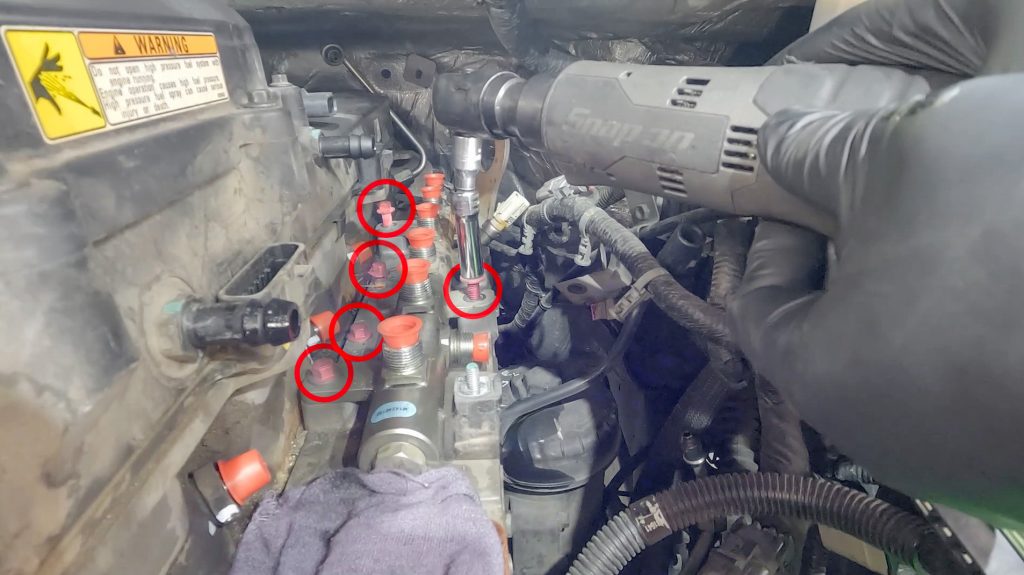
61a. Remove Fuel Rail Bolts
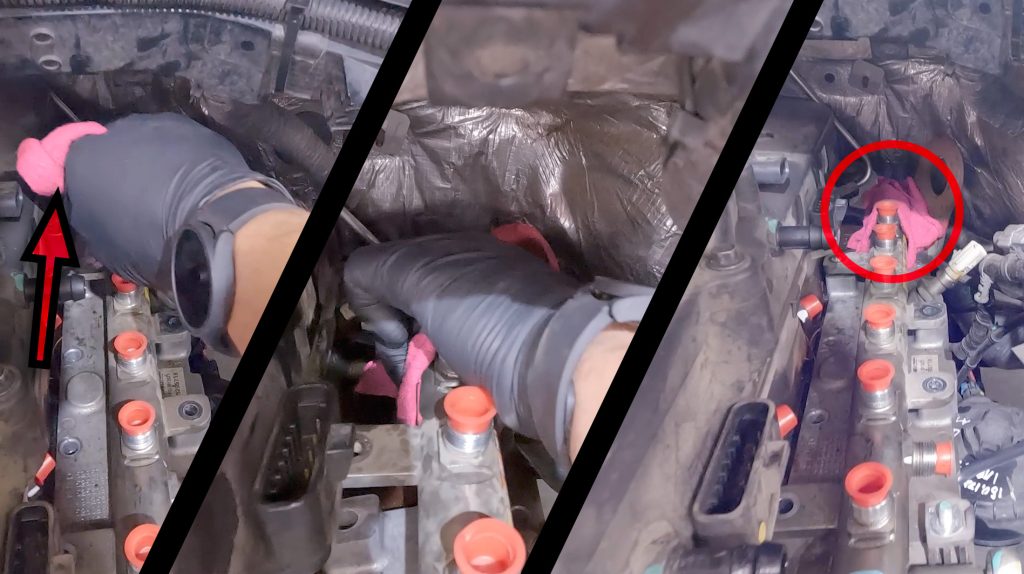
61b. Place Rag At The Rear of Fuel Rail
There will still be fuel in the rail, and it’ll leak out in the next step if you don’t do this.
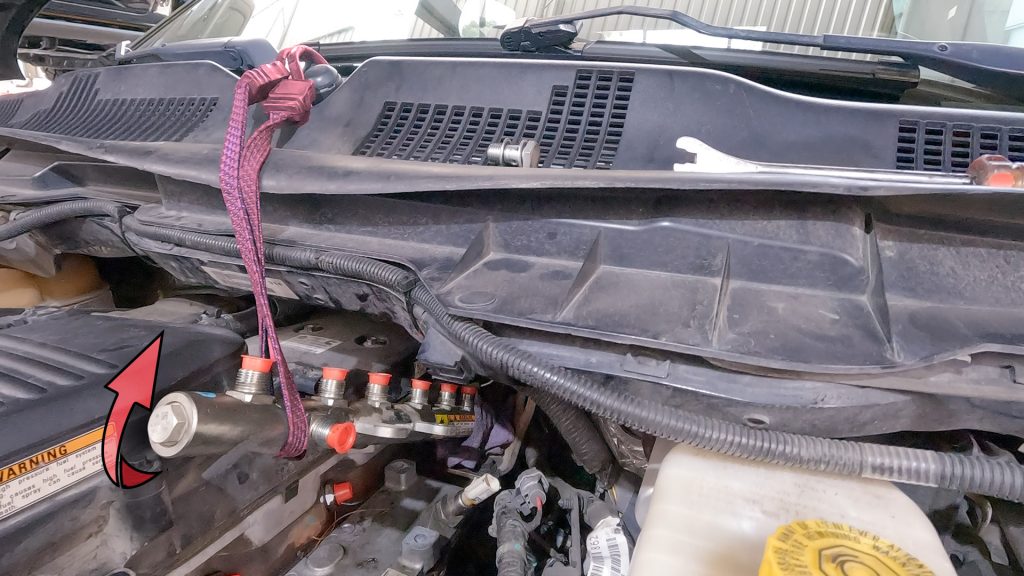
62. Bungee Fuel Rail
Be sure that rag stays at the rear of the fuel rail, it will leak when you tilt it back.
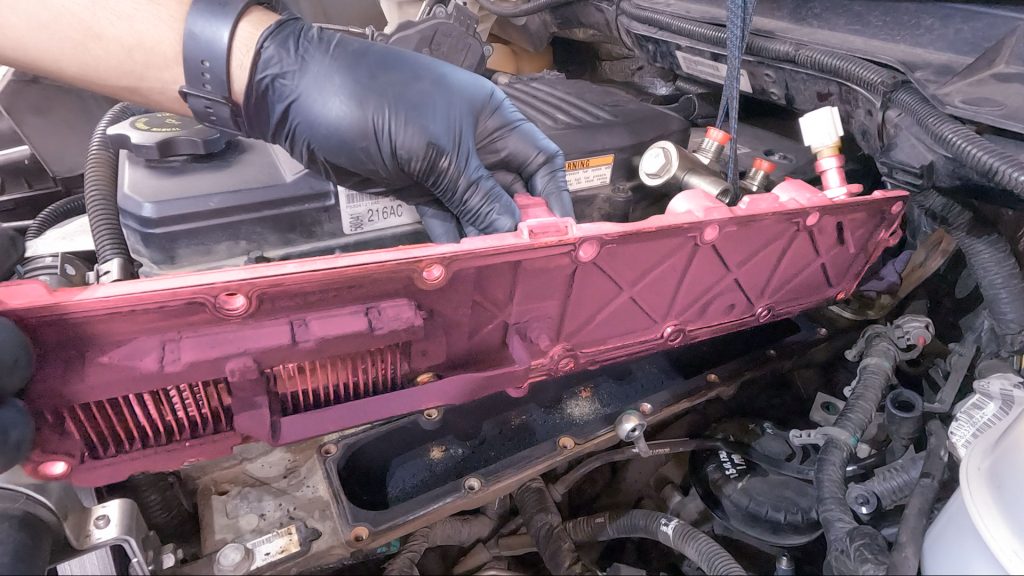
63. Remove Factory Grid Heater
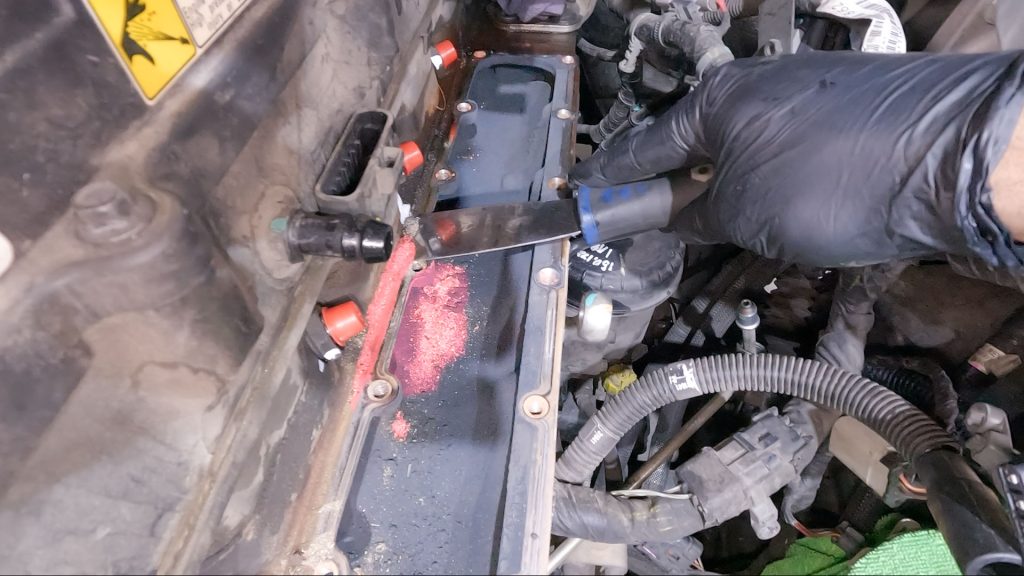
64. Clean Manifold Surface
Take care not to scratch the surface, and vacuum out any debris that fall into the manifold. A rag with some solvent can clean up the finer material.
Be certain that all rust is removed from the mounting surface. Rust will result in an air leak.
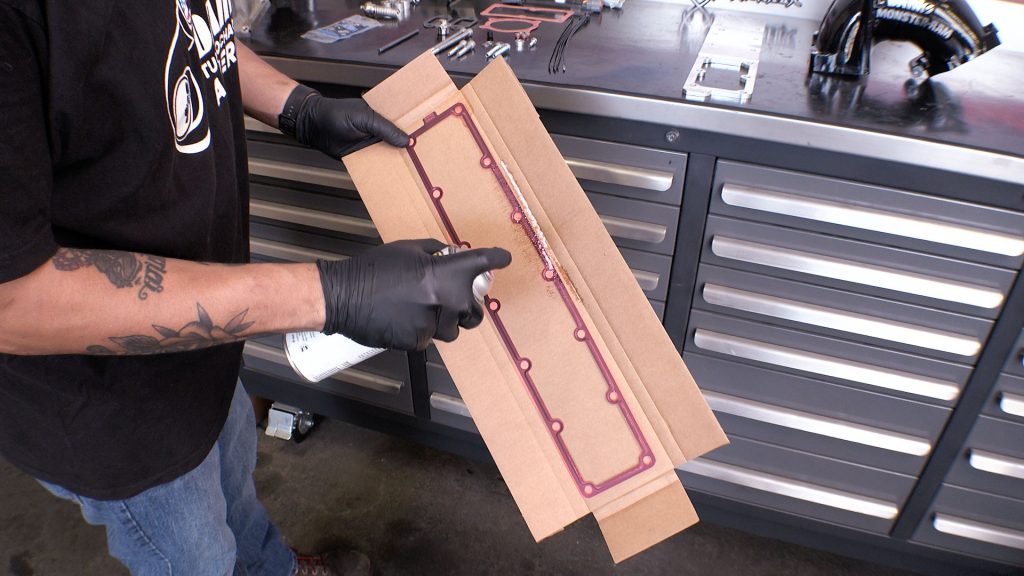
65. Spray Adhesive to Gasket (Banks Side)
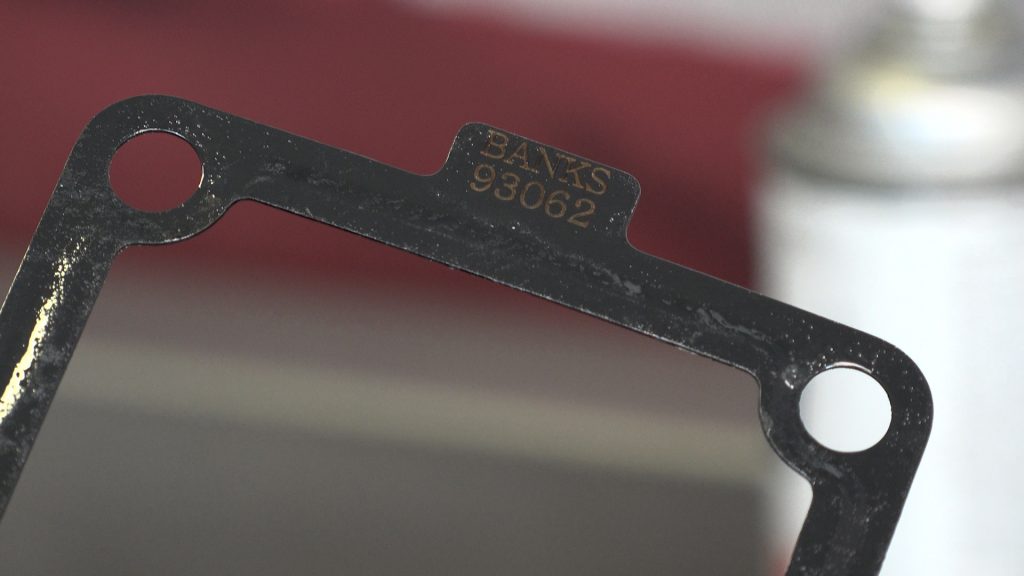
Side that says Banks, should be the side with the adhesive. Let it sit for about 3 min for the glue to tack up.
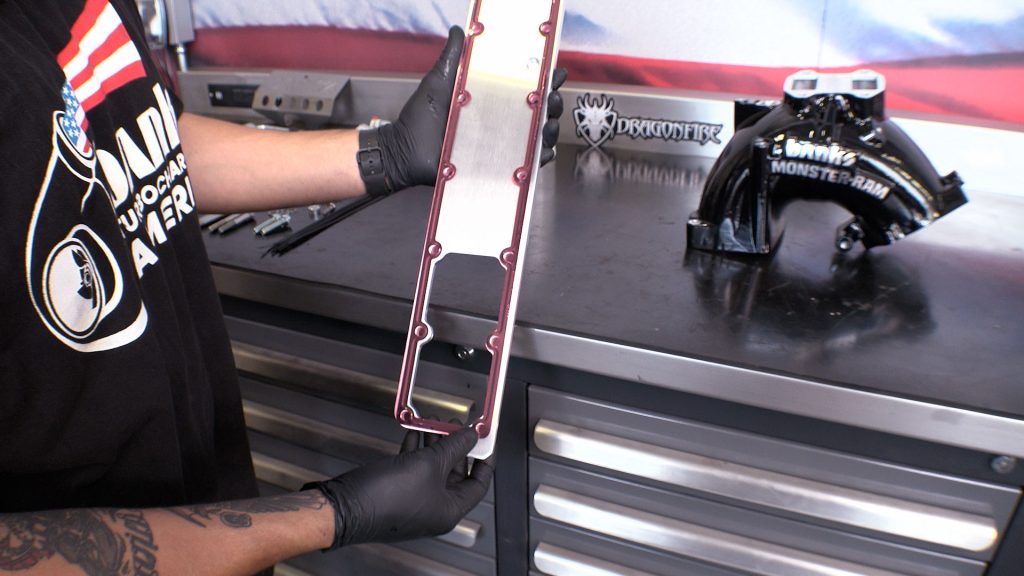
66. Align Gasket & Stick On
Line up all of the bolt holes, and stick the gasket to the flat side of the billet plate.
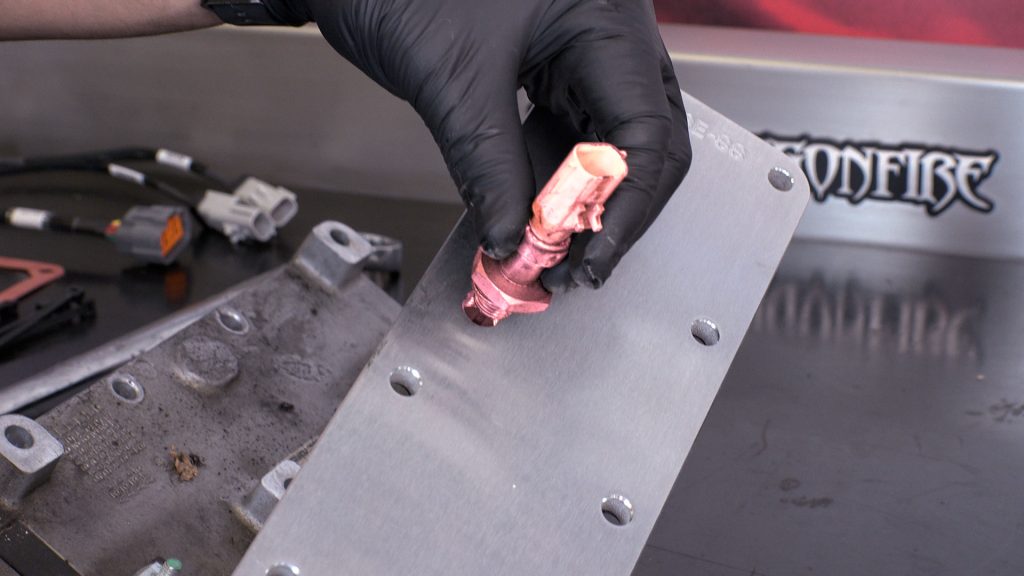
67. Transfer Temp Sensor To Banks Plate
Take care when removing the sensor and give it a clean with some scotch brite.
Don’t over-tighten the sensor into the billet plate as the aluminum is softer than the steel threads on the sensor. It will bottom out so you’ll know when to stop.
Installation of Monster-Ram
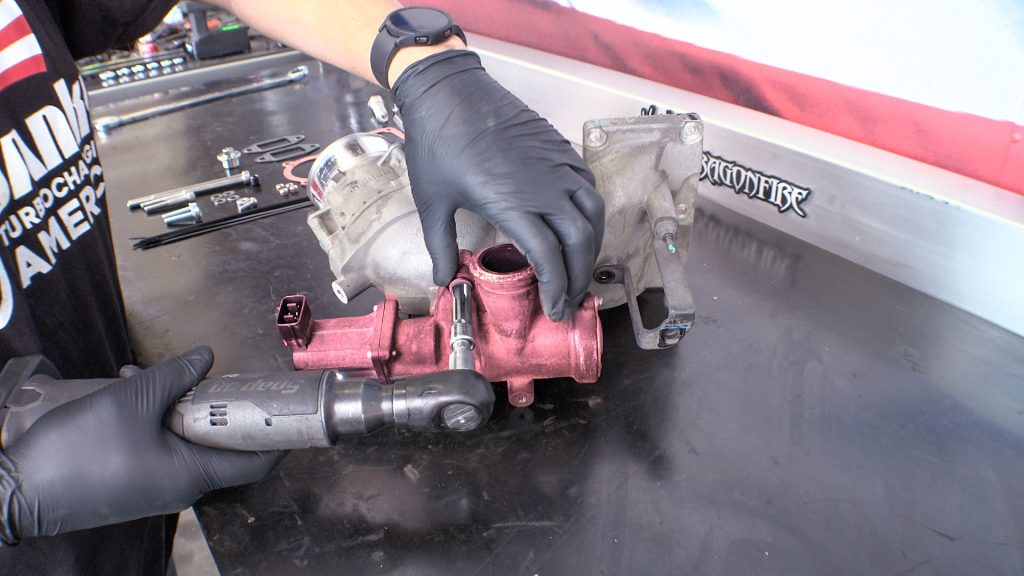
68. Remove EGR Valve
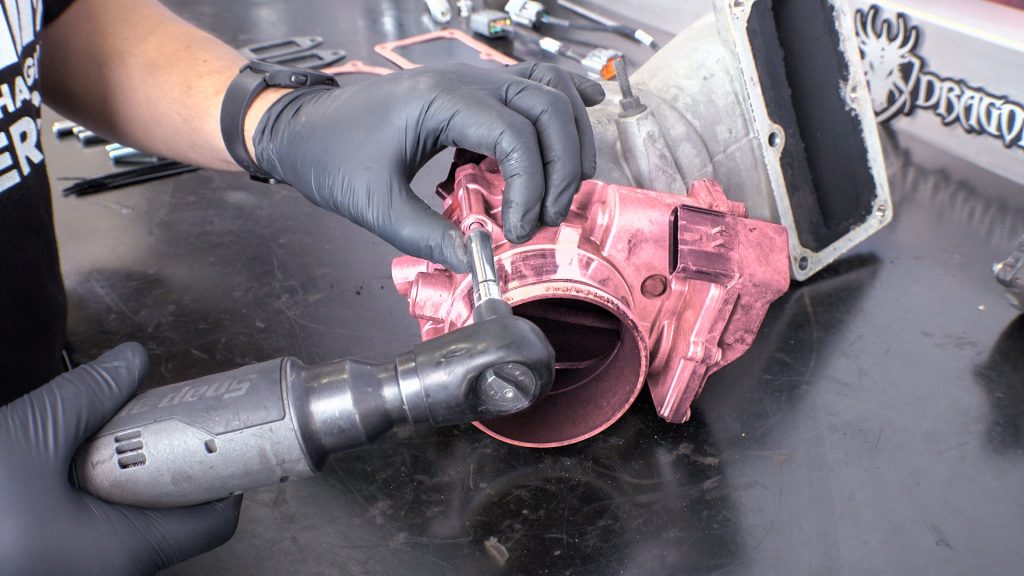
69. Remove Throttle Body
The throttle will be stuck onto the gasket, so use a rubber mallet to help tap it free from the elbow.
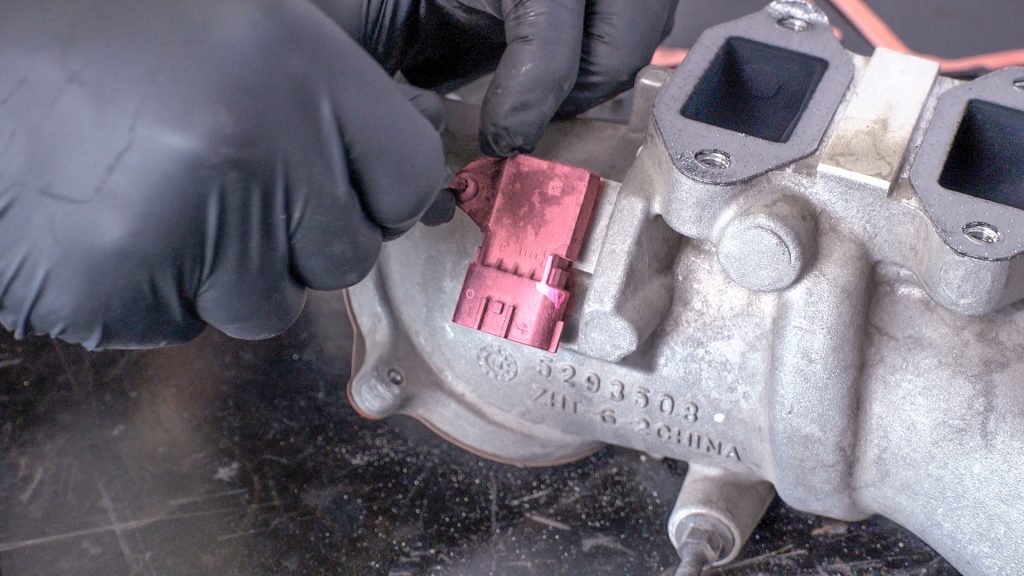
70. Remove & Transfer MAP Sensor
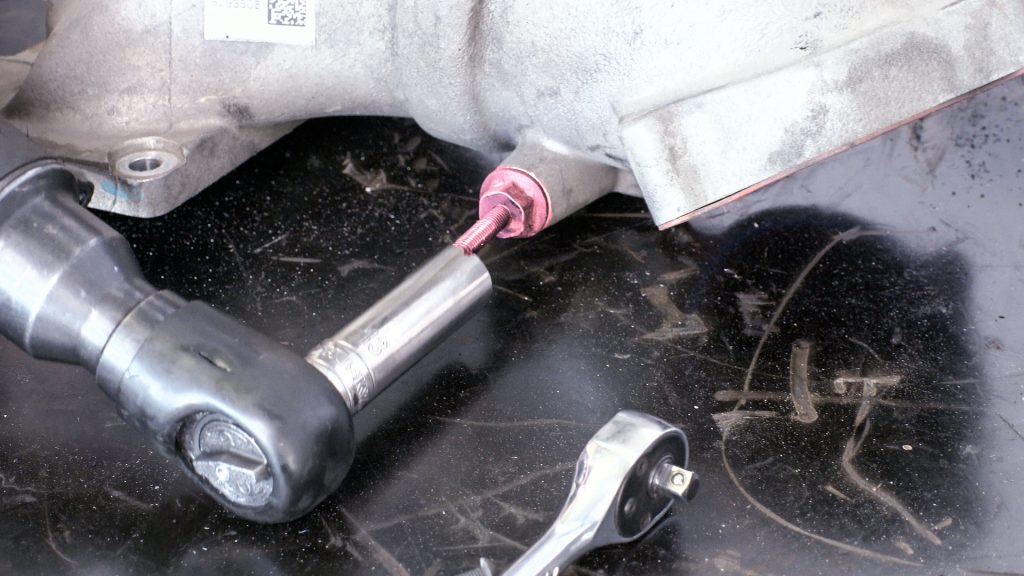
71. Remove & Transfer Elbow Stud
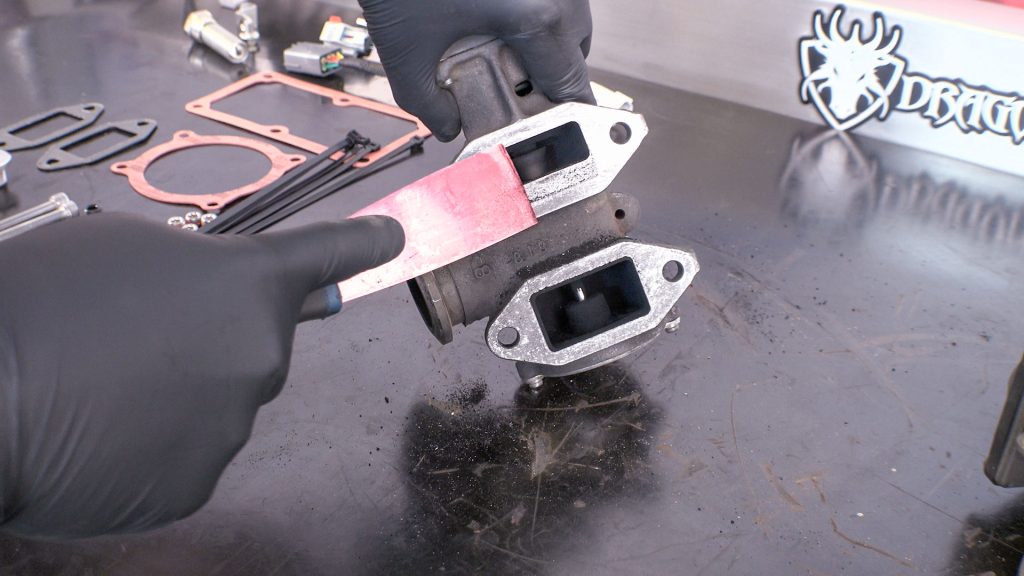
72. Clean EGR Gasket Surface
Take care not to nick the surface. Do the same for the throttle body gasket mating surface.
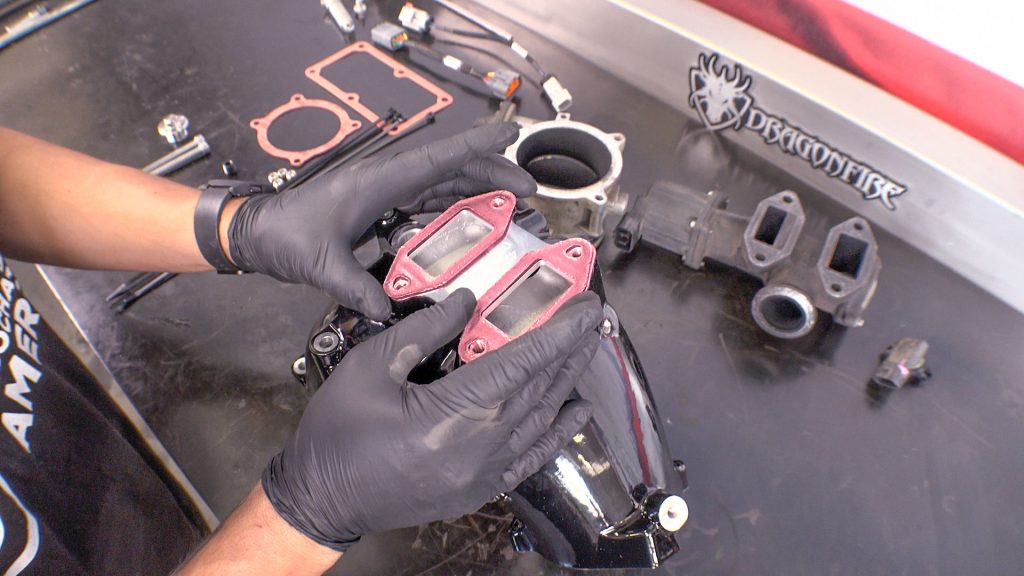
73. Place New EGR Gaskets On Monster-Ram
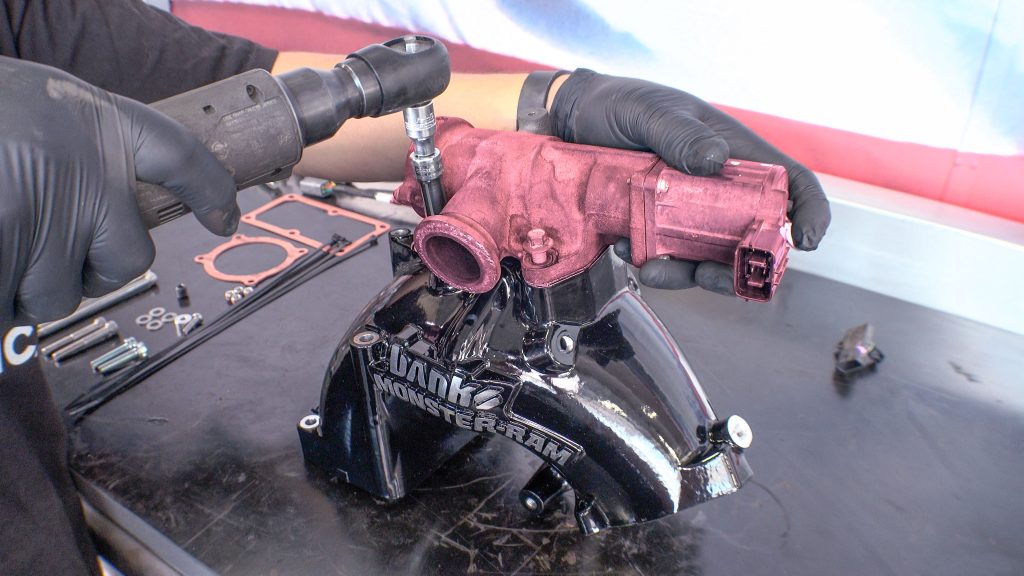
74. Fasten EGR Bolts
Apply a small amount of medium strength thread locker and tighten to 18 ft/lbs.
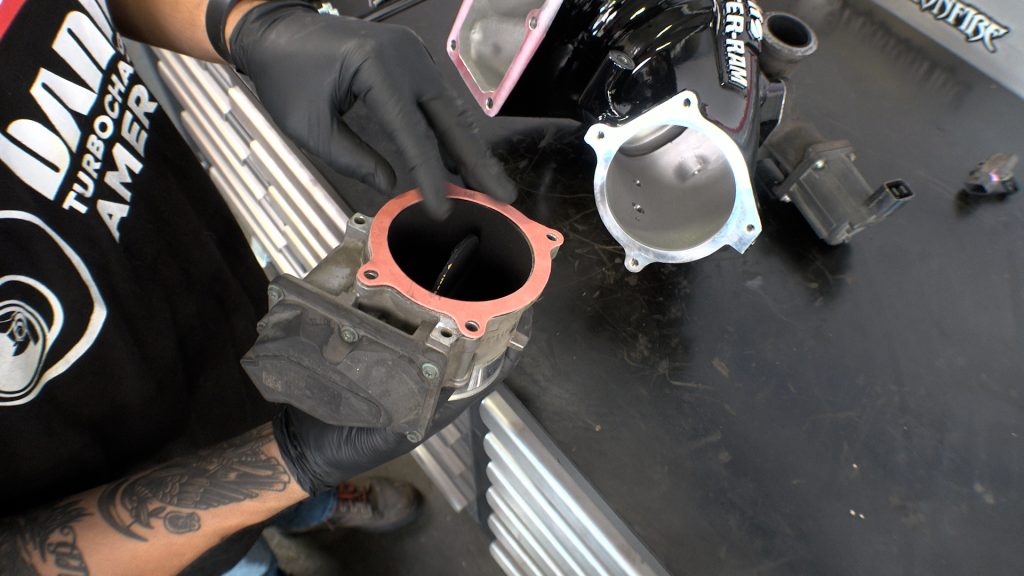
75. Align Throttle Body Gasket
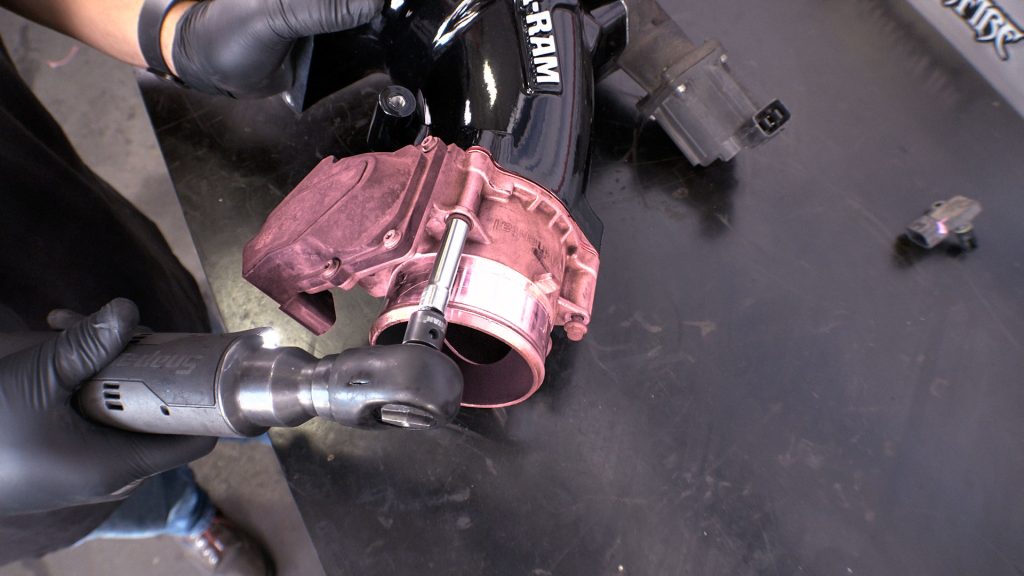
76. Fasten Throttle Body to Monster-Ram

The 1/8” NPT ports shall only be used for installing sensors for measuring air temperature, pressure, or flow. Sensors installed to these ports shall have a fitting of 1/8” NPT and shall not be connected to the vehicle’s electronic control units. In addition, factory sensors that come equipped on the vehicle shall not be disconnected and shall not be relocated to the ports. The ports, when not used, shall be closed off with the supplied plugs.
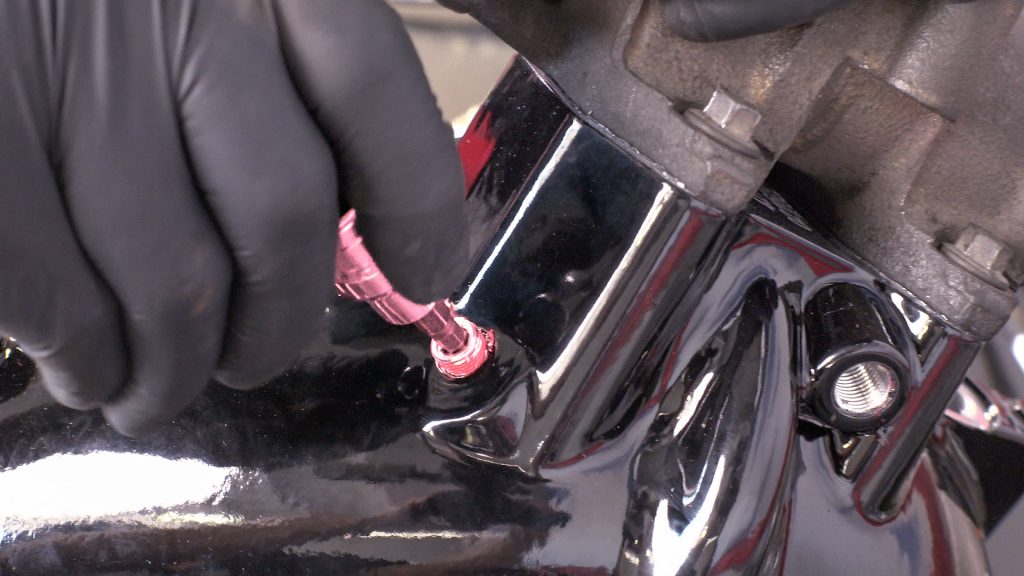
77. Install Sensor Plugs
Inspect the threaded holes, and be sure there is no powder coat in the holes.
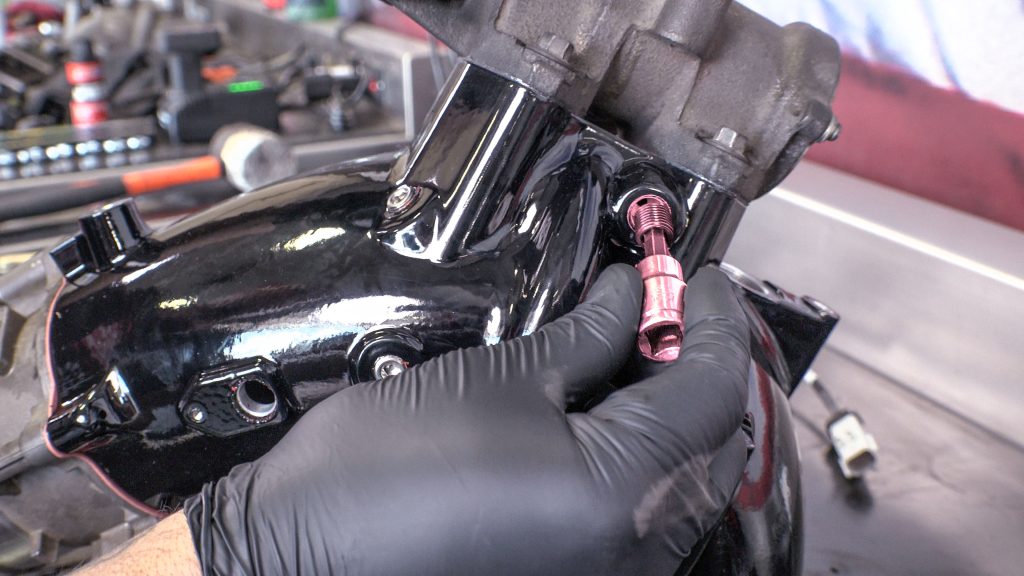
78. Install Rear Thermocouple Plug
Apply some blue Loctite to the threads first.
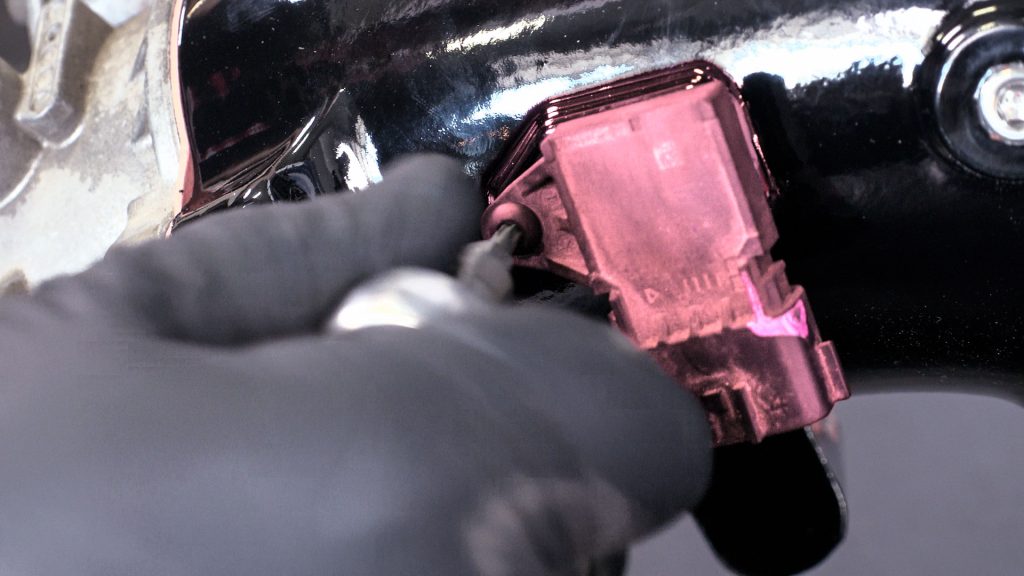
79. Install MAP Sensor
Now is a good time to clean the sensor with some MAF/MAP cleaner spray.
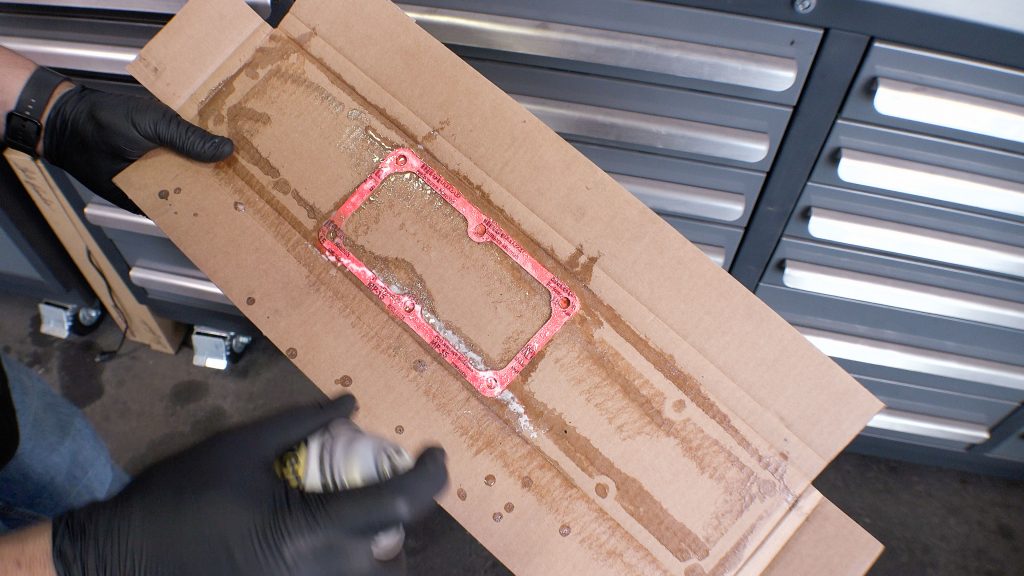
80. Spray Gasket With Adhesive
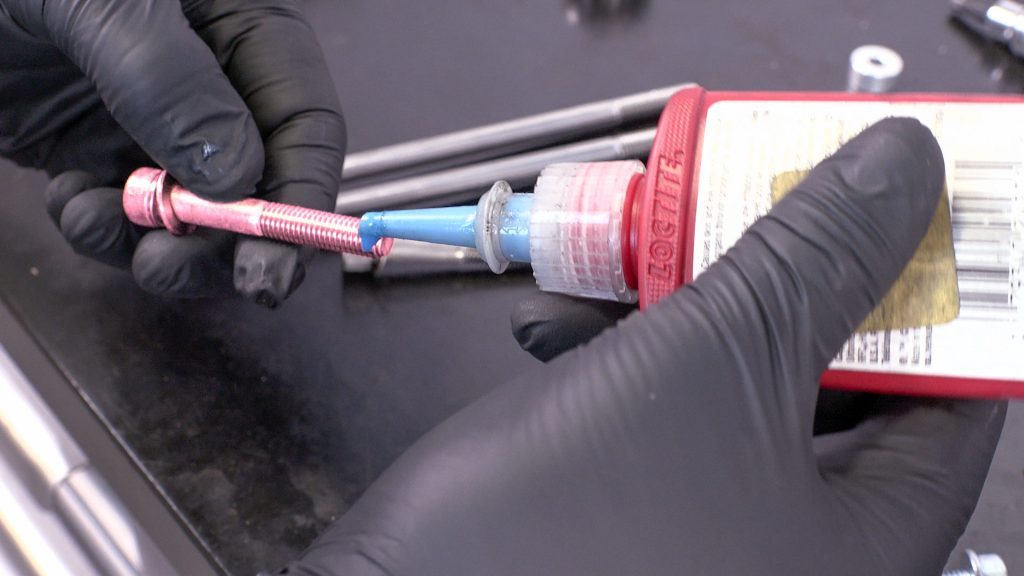
81. Place Washers On The Hex Cap Screws, Then Apply Some Blue Threadlocker As You Install Them
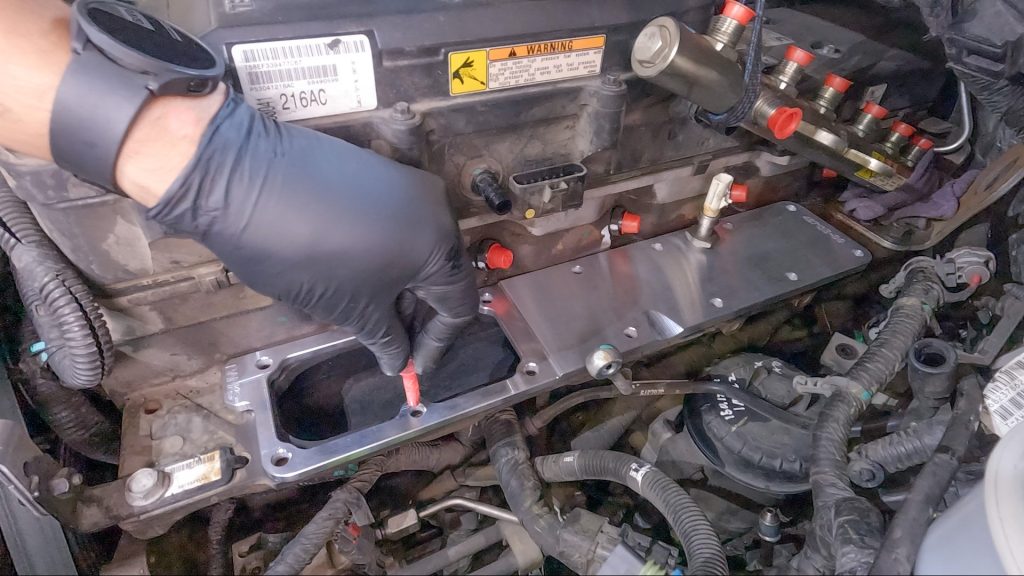
82. Place a stock bolt in one of the holes around manifold inlet to keep the billet plate from moving while you install fuel rail.
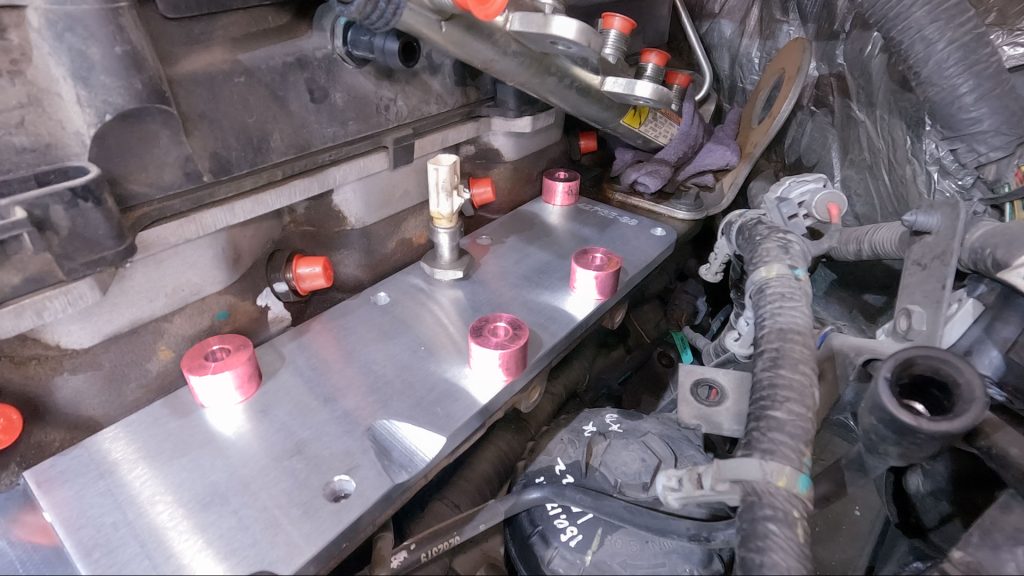
83. Place Fuel Rail Standoffs
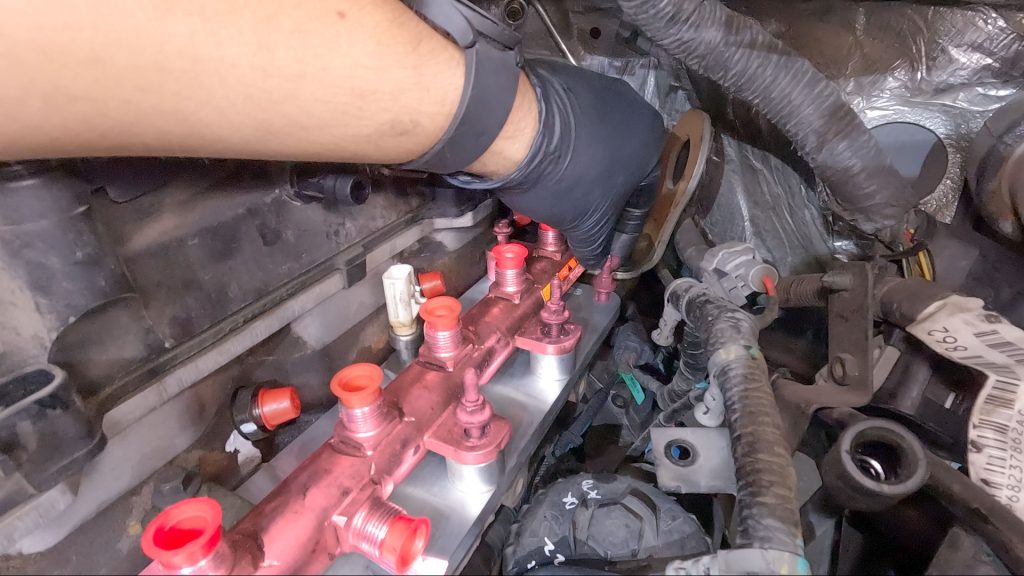
84. Release Bungee Cord. Place Fuel Rail & Studs in Place
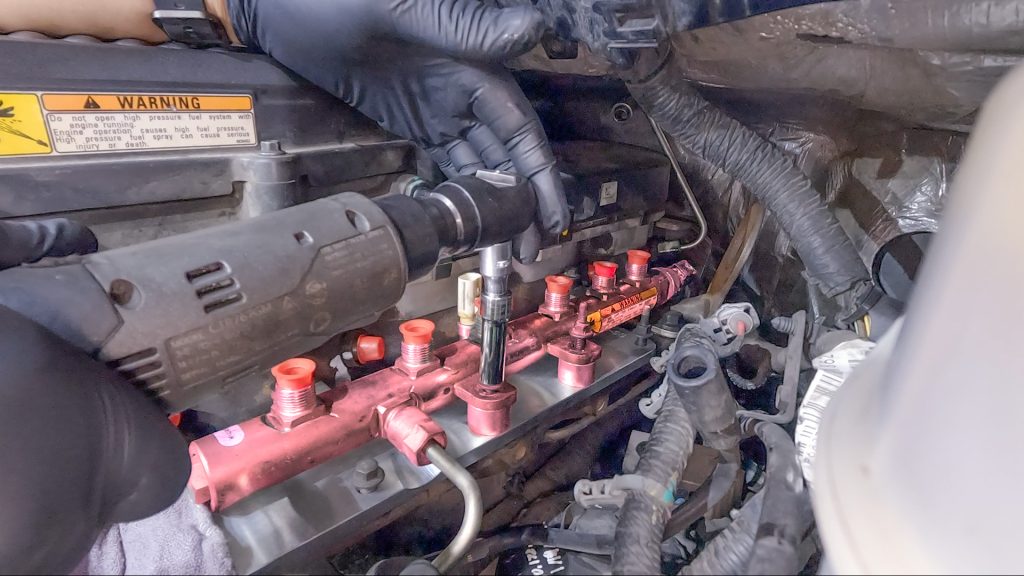
85. Tighten Fuel Rail hold-down
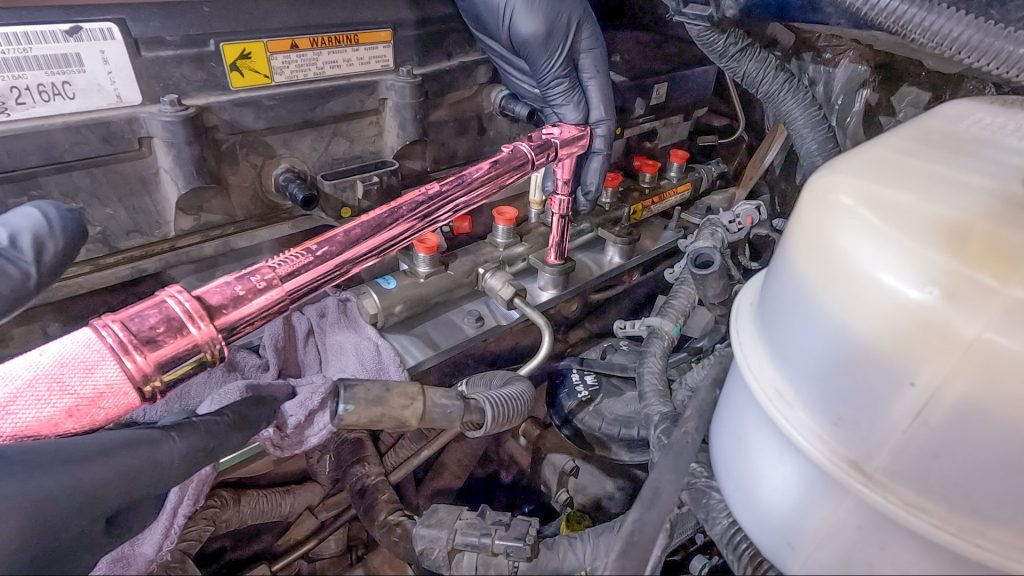
Torque Fuel Rail hold-down Bolts to 18-20 ft/lbs
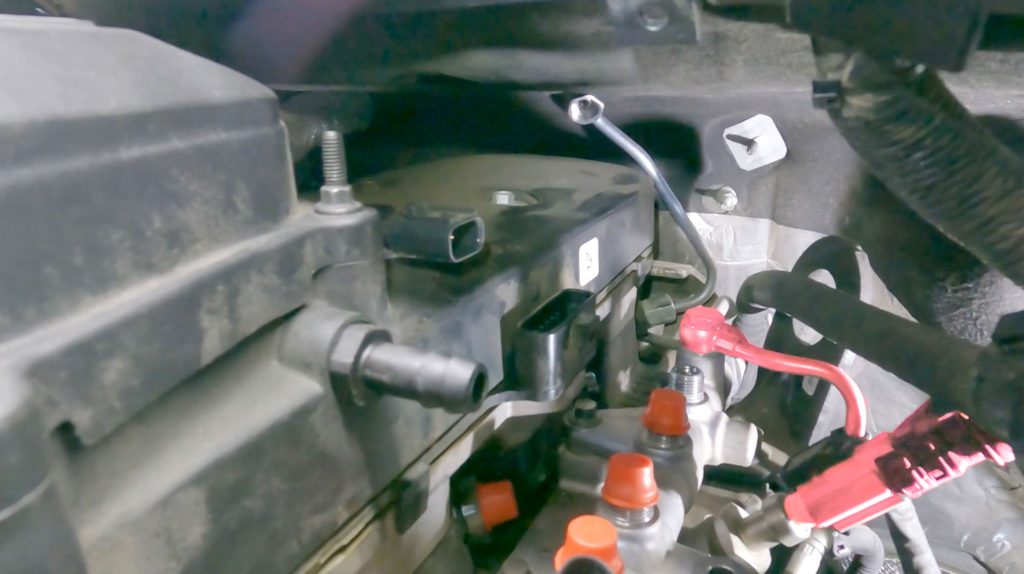
86. Re-Install Temp Sensor. Tighten Fuel Return Banjo Bolt to 18 ft-lbs
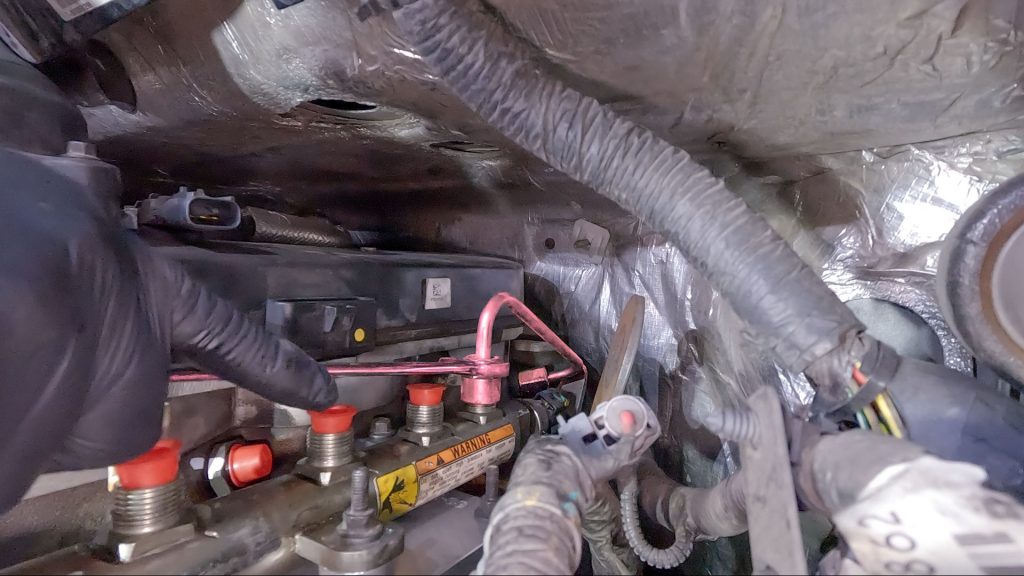
87. Tighten Fuel Lines to 41 ft/lbs
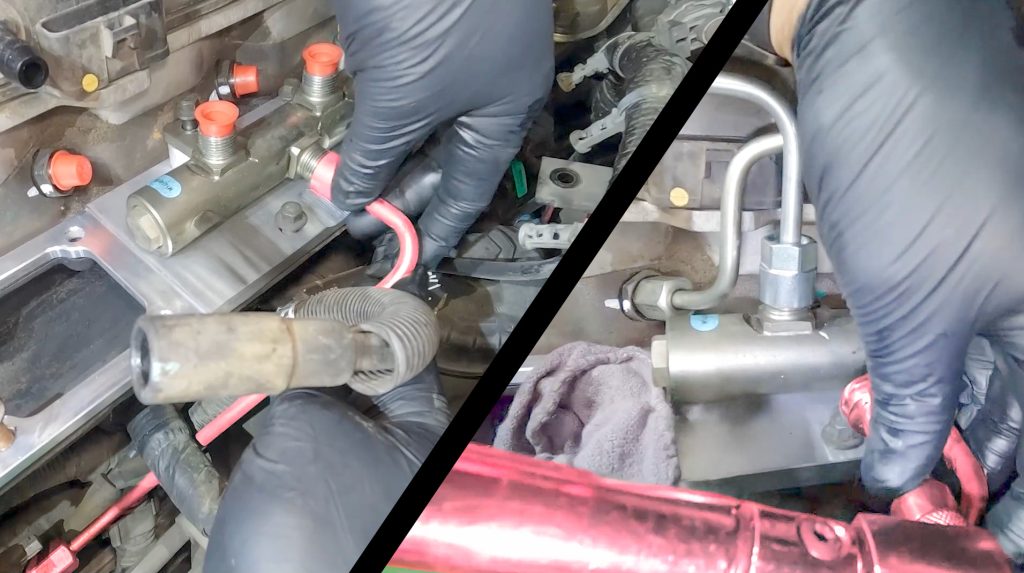
88. Tighten Fuel Feed Line To 41 ft/lb
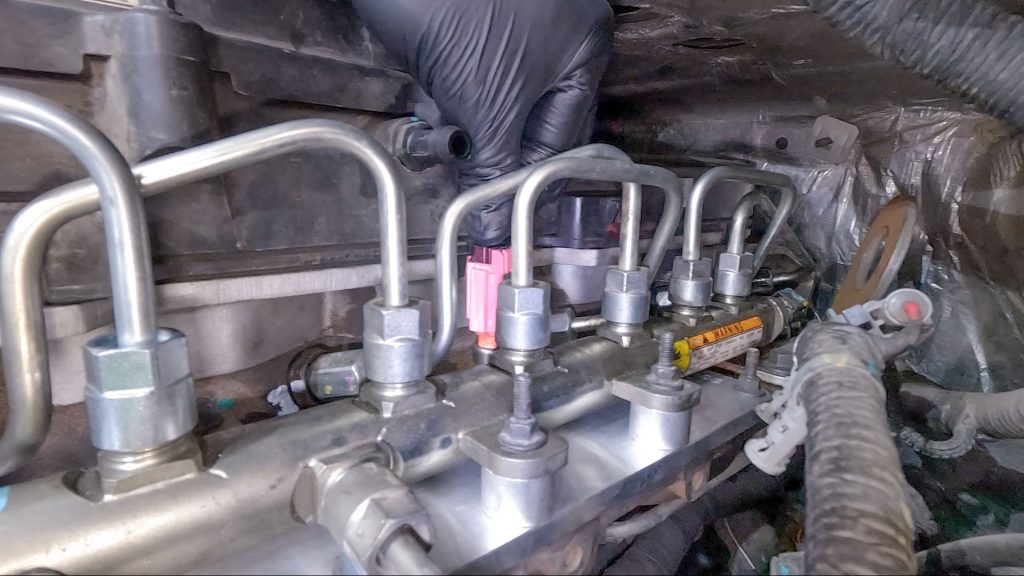
89. Connect Temp Sensor Extension Harness
Be sure to lock the plug once connected.
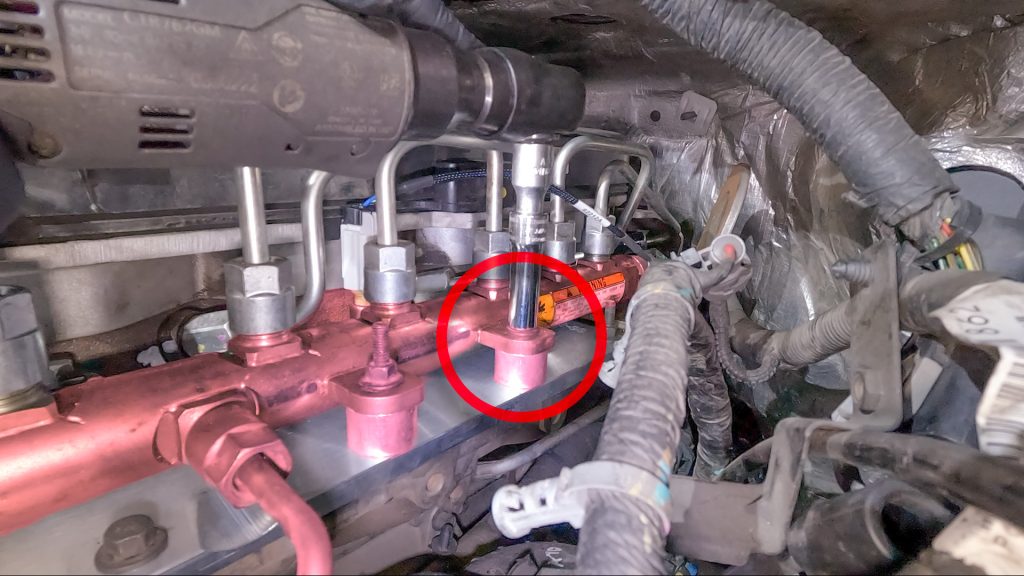
90. Remove Middle Right Stud For Dipstick Tube
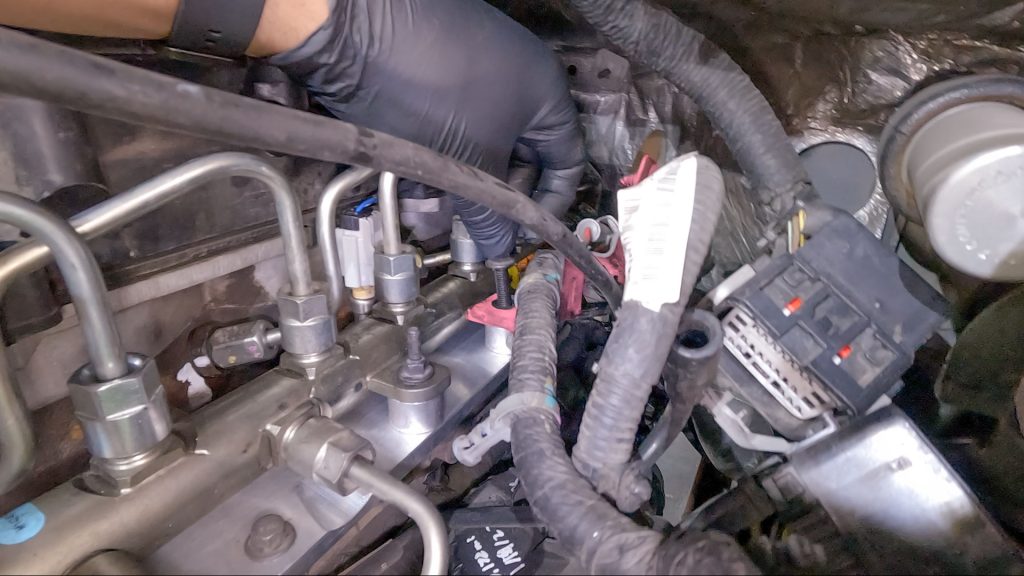
Slide Dipstick Bracket Over & Reinstall Stud
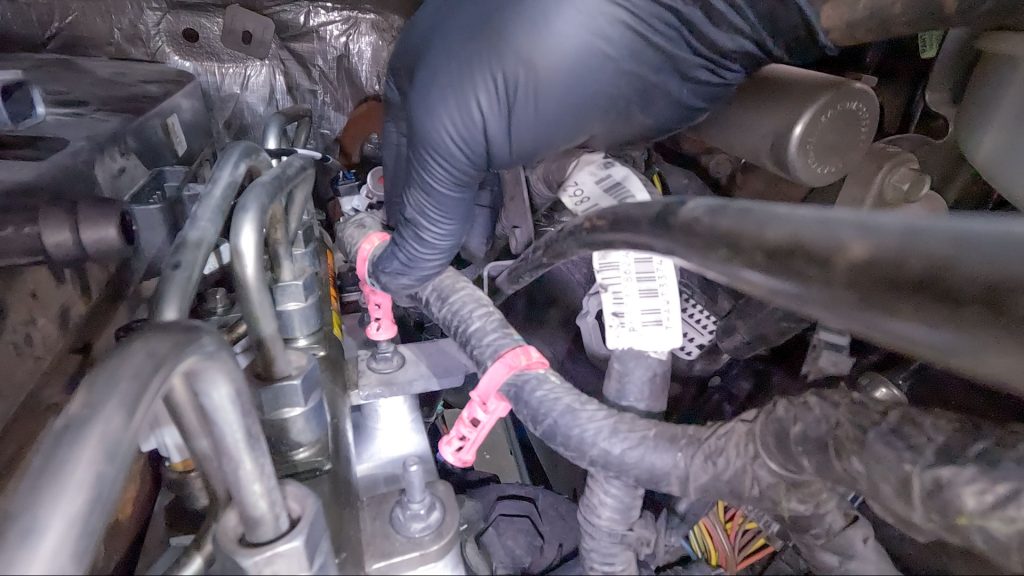
91. Push Engine Harness Cable Ties Back Onto Studs
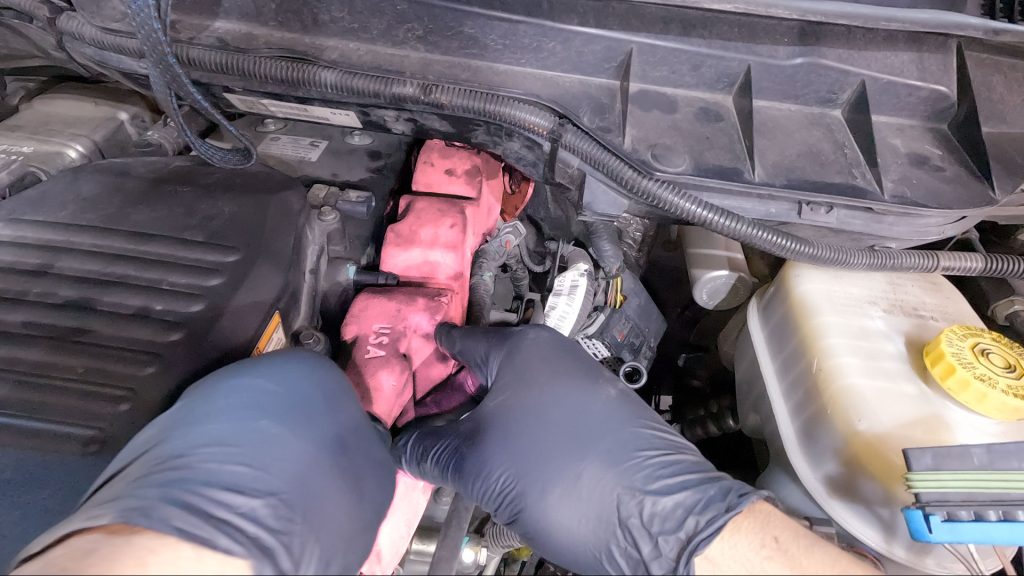
92. Put Rubber Isolator Back Into Place
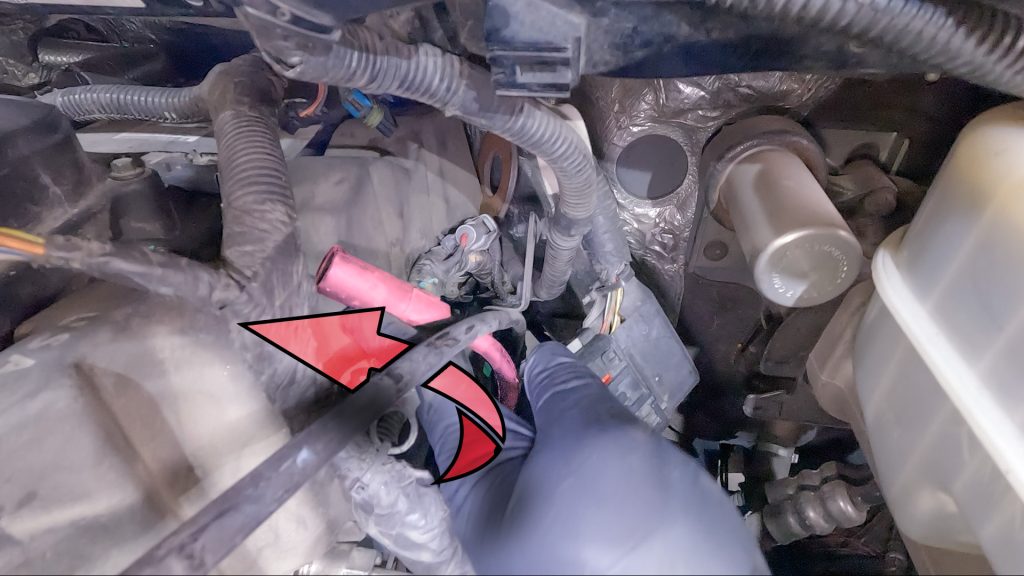
93. Run Rear PCV Hose Under Dipstick Tube
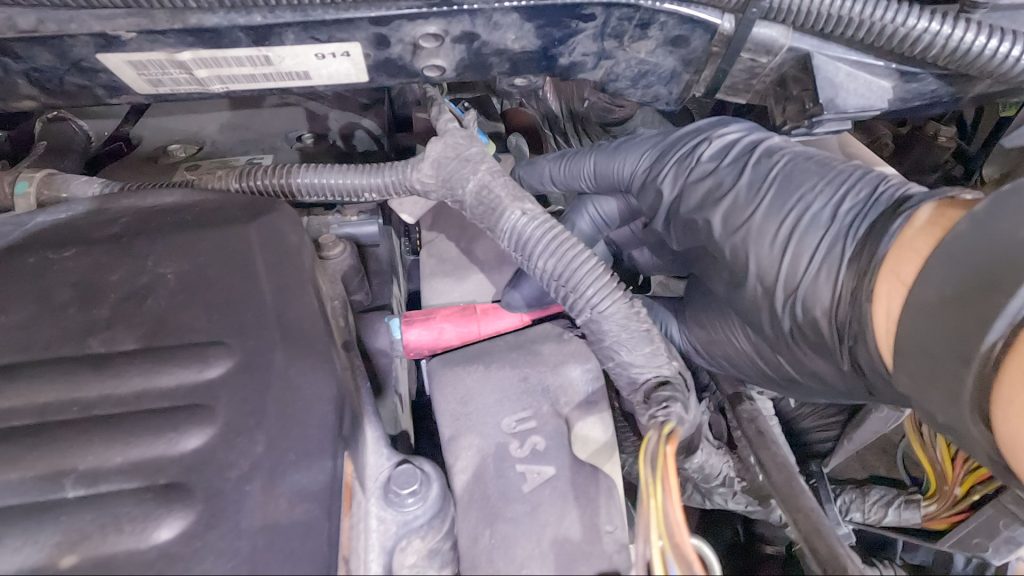
94. Connect Rear PCV Hose Back To Valve Cover
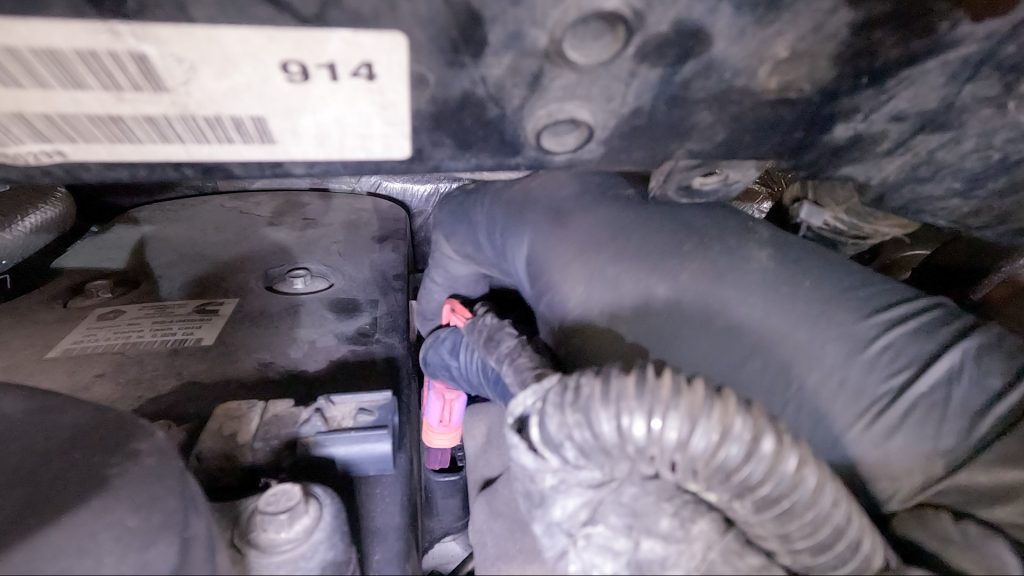
95. Connect Rear Flat Blue Injector Plug
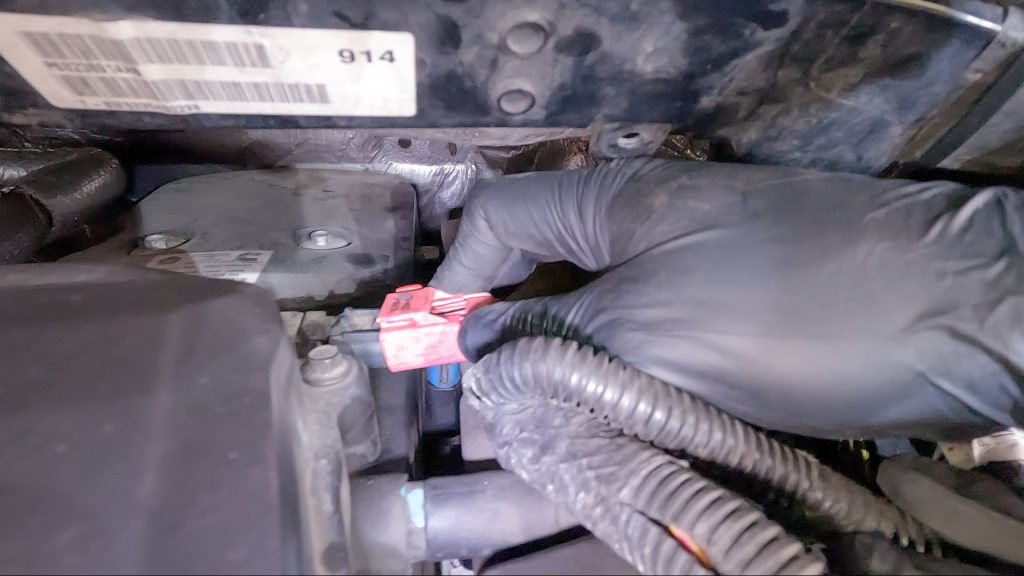
96. Connect Rear White Plug
Be sure to slide the pink lock back into position.
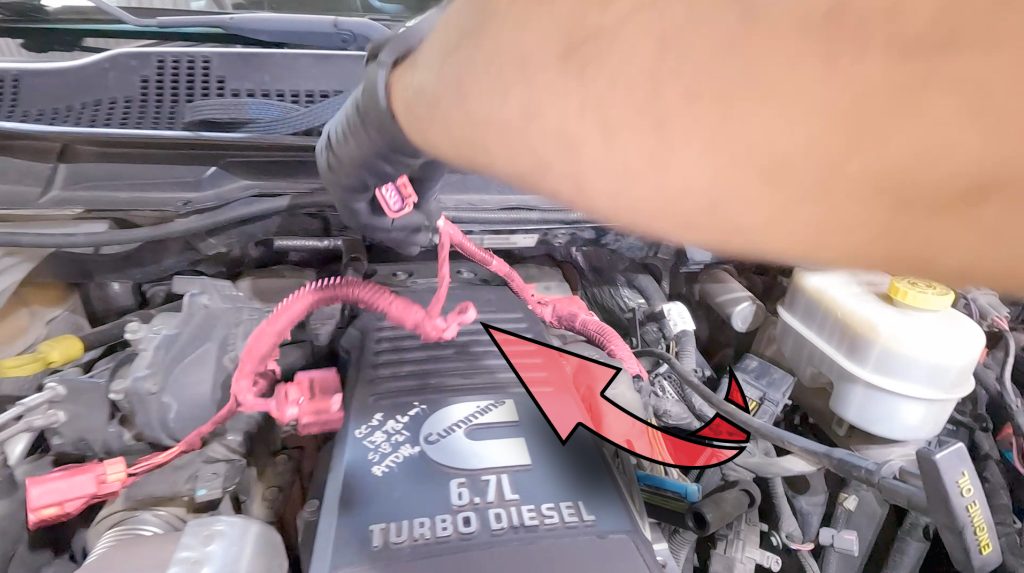
97. Route Engine Harness Under Dipstick & Around Valve Cover
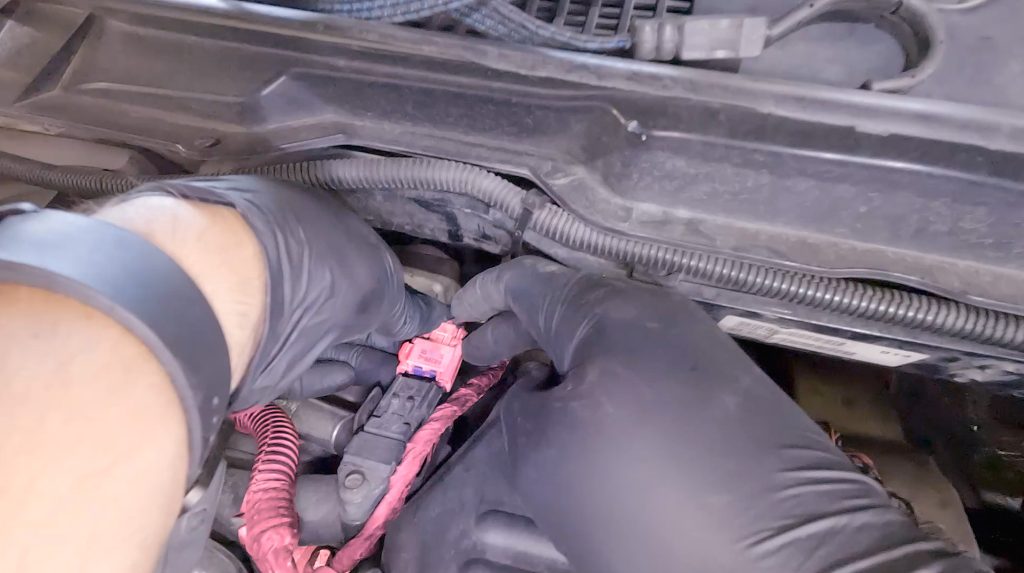
97a. Plug In 3 Remaining Plugs
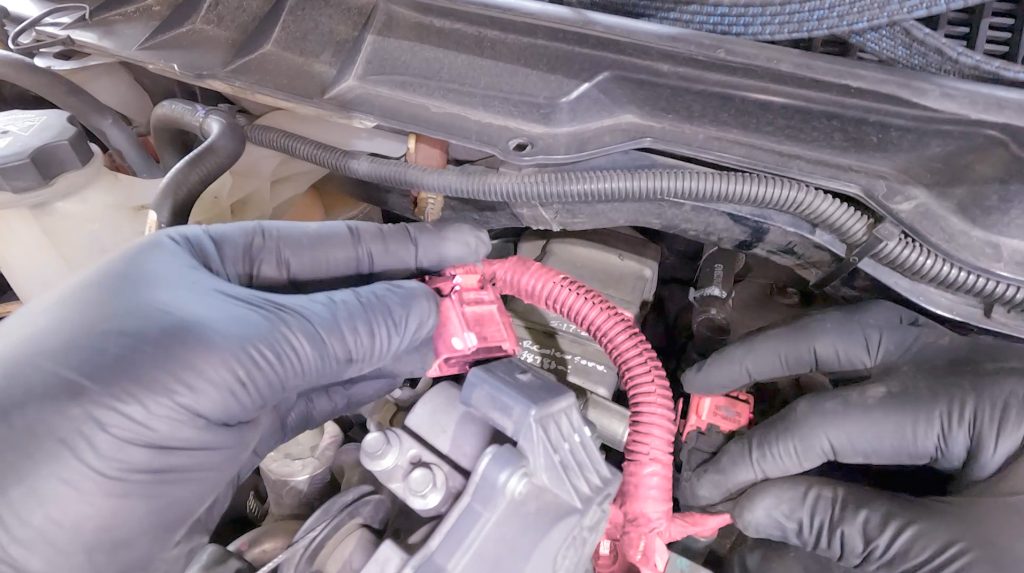
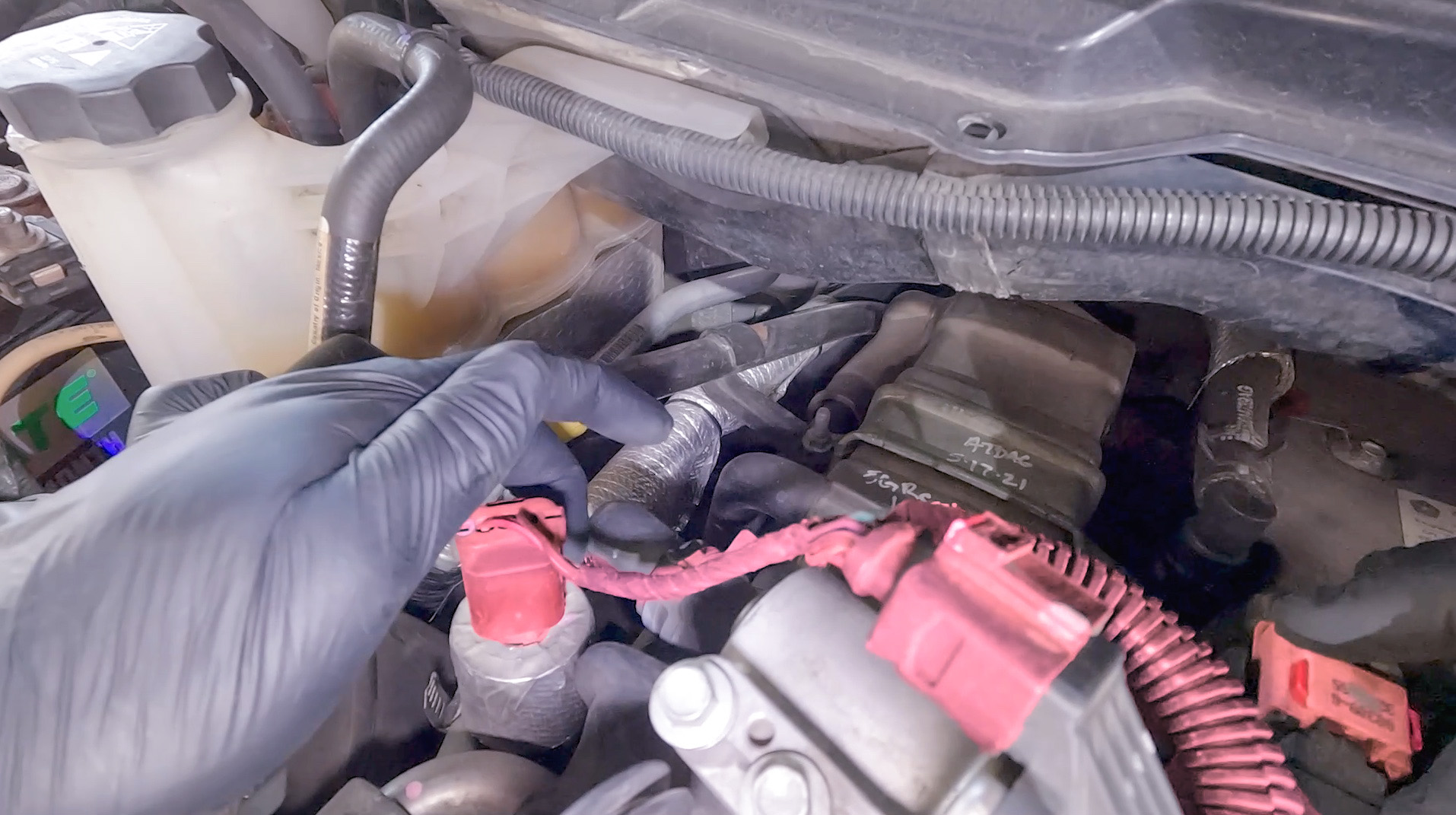
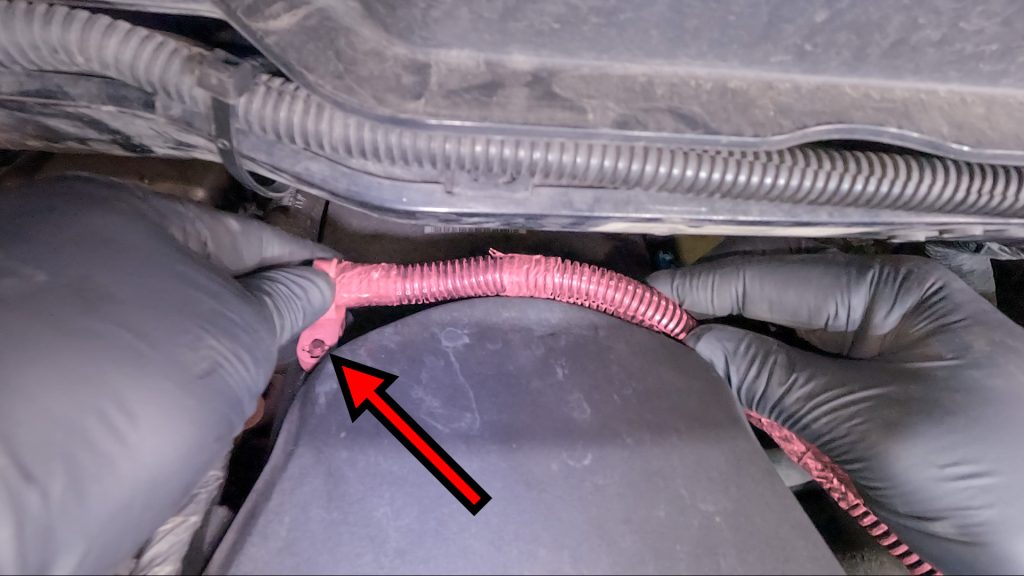
98. Push Cable Ties Onto Studs
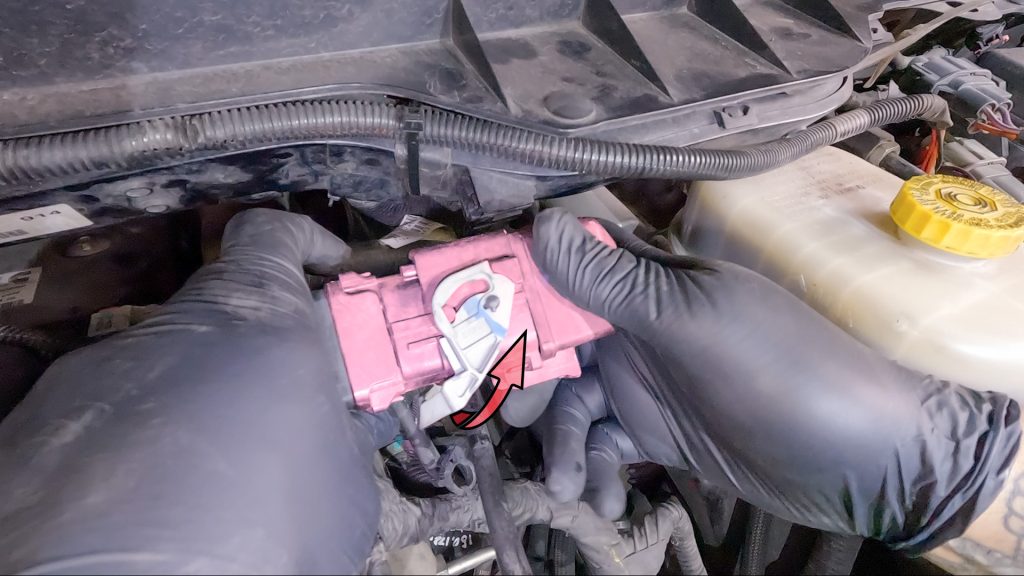
99. Reconnect Engine Harness Connector
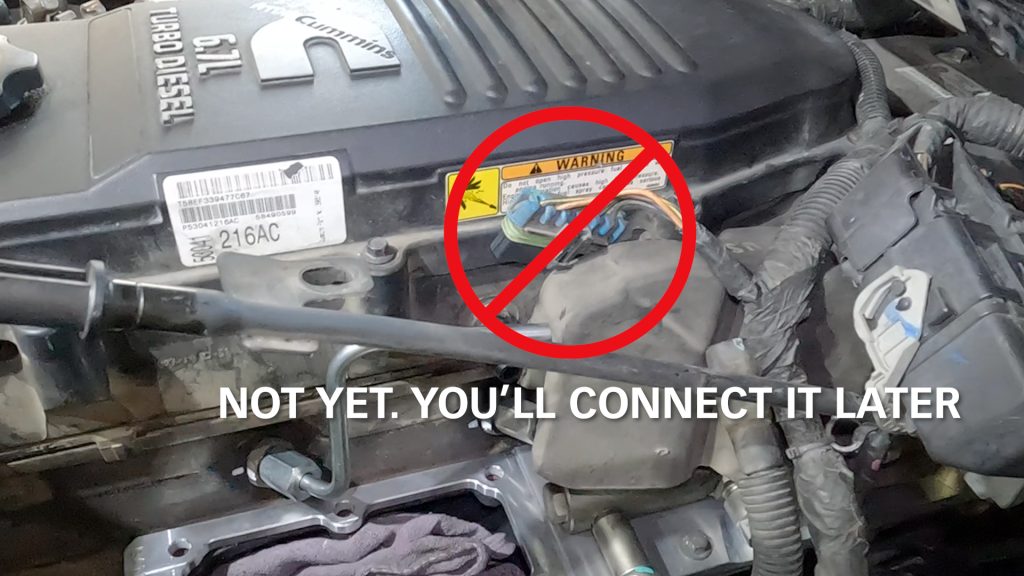
100. Do Not Connect Front Blue Injector Plug Yet
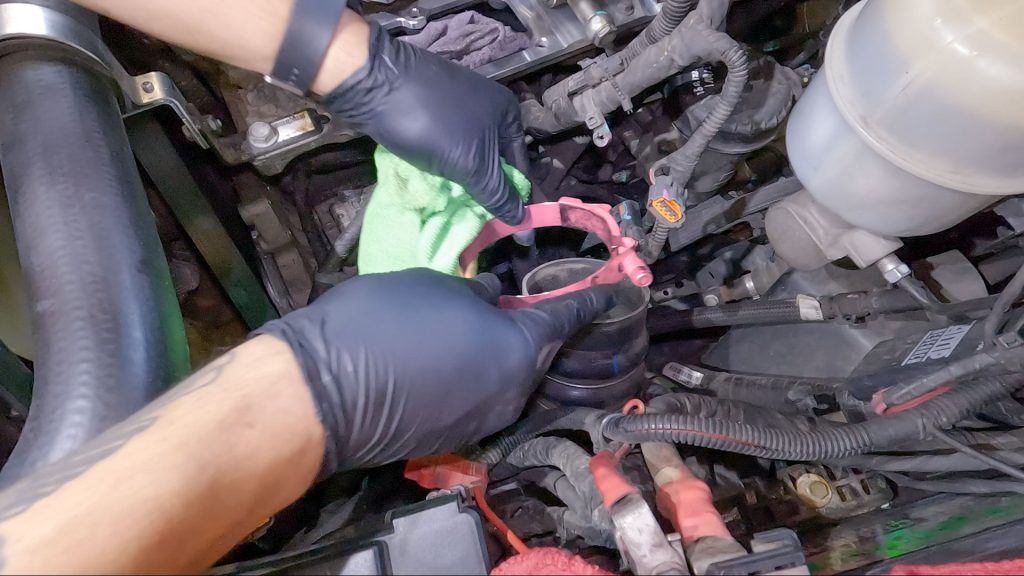
101. Remove Rag From Boost Tube, Put Clamp Back On
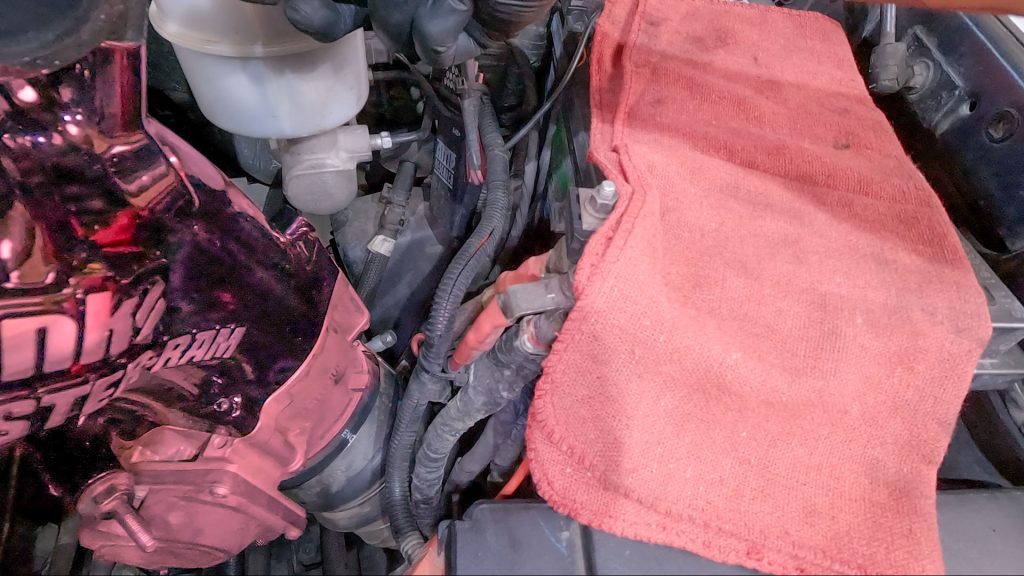
102. Insert Monster Ram Into Boost Tube
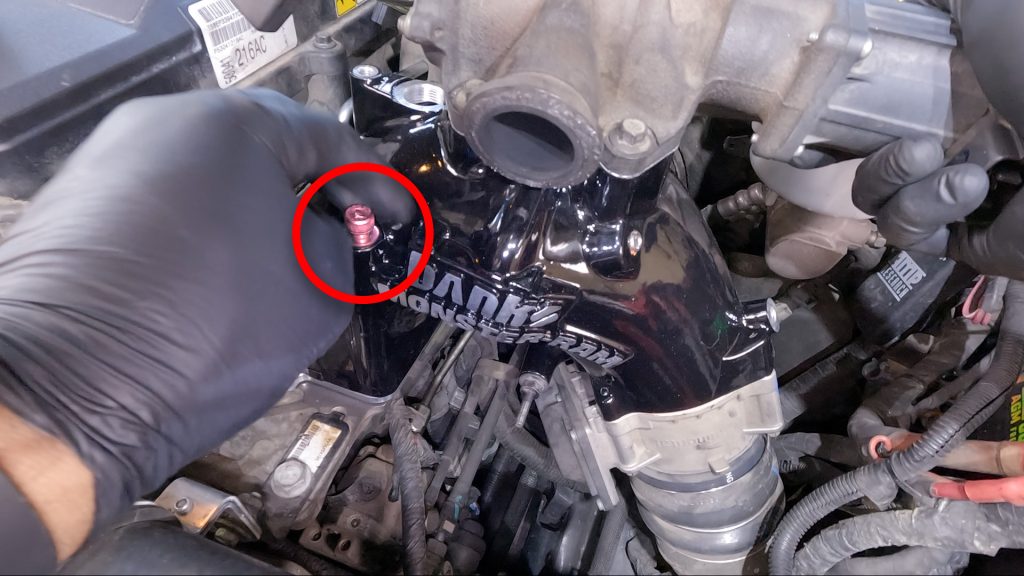
103. Put Long Bolt Into Front Corner by Hand
This will help hold the Monster-Ram inlace. Then do the same for the long bolt on the backside. Followed by the two smaller bolts.
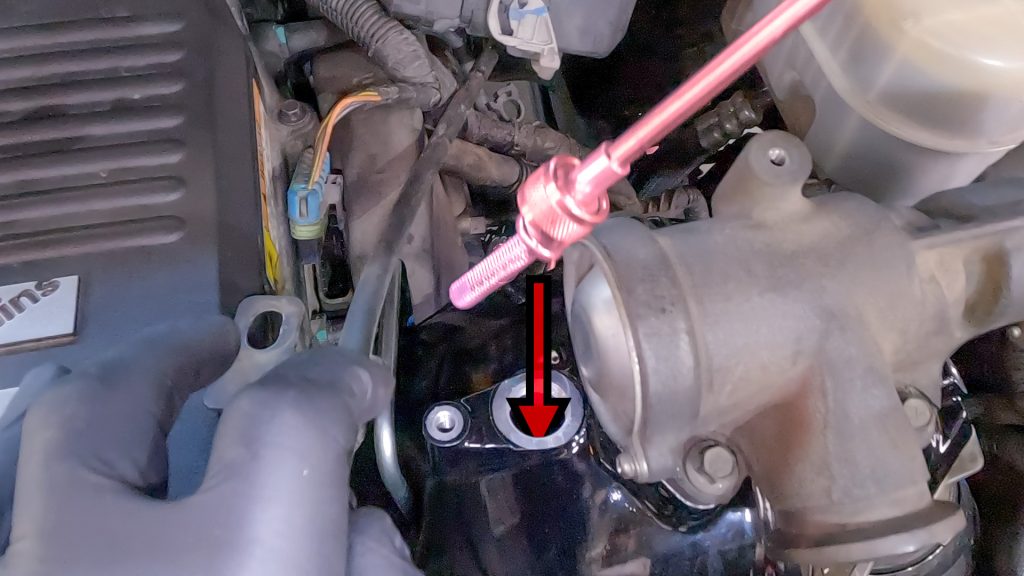
104. Use Telescoping Magnet to Start Bolts in the Middle of the Monster-Ram
This is useful for the small bolt in the middle, which is hard to reach, and mandatory for the one that goes through the top coil heater hole. Use Medium-strength liquid thread locker!
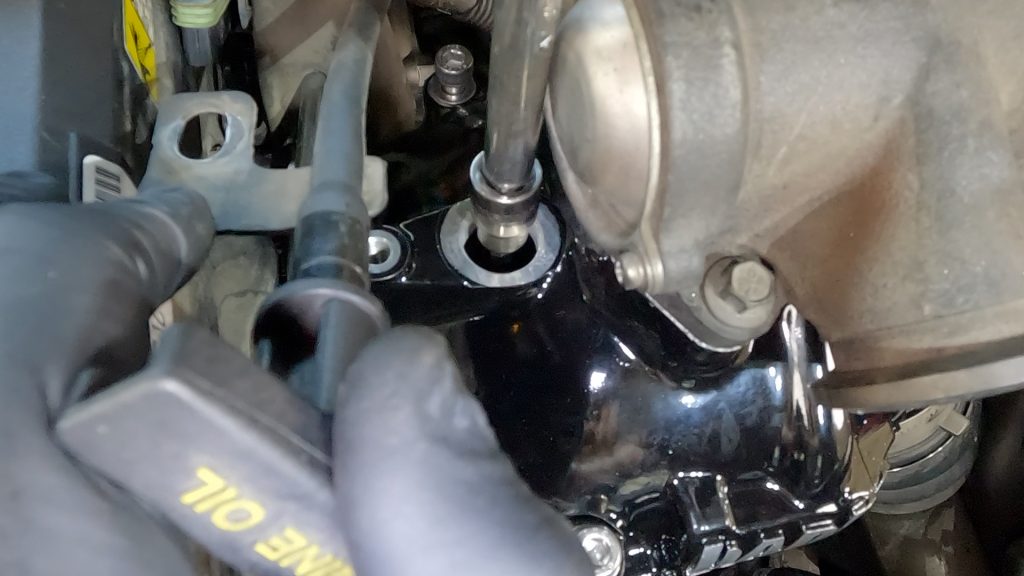
Use Hex Key Extension to Tighten Bolt
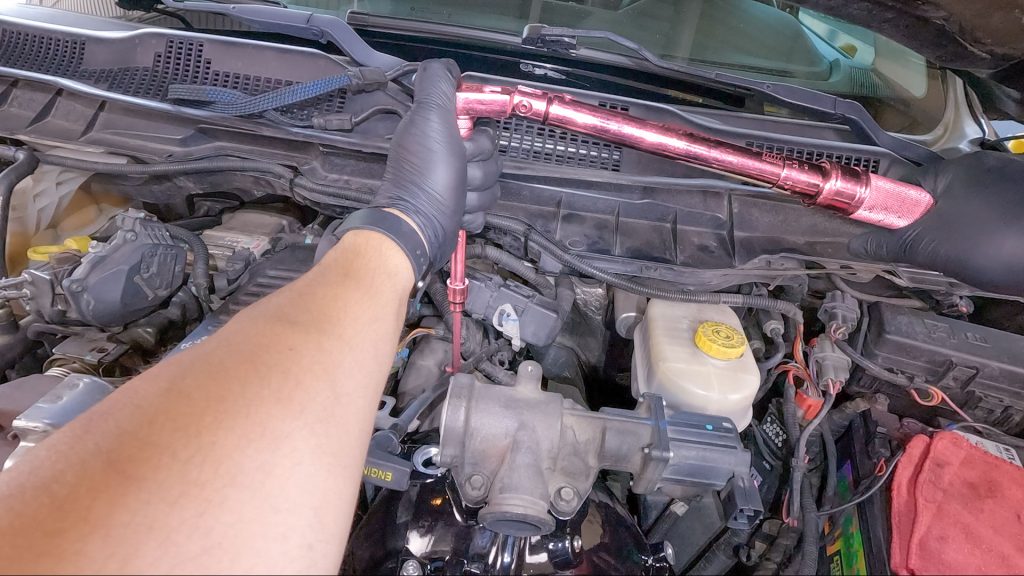
Tighten All 6 Bolts 18-20 ft-lbs
Start with the bolt that’s inside the Monster-Ram, then work in a cross pattern to torque to spec.
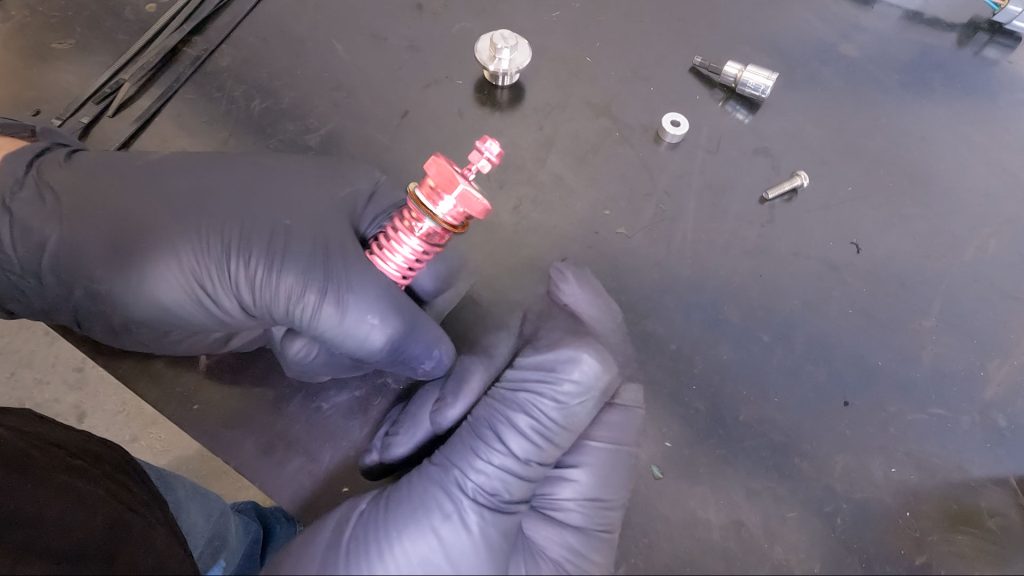
105. If your heater has a pink insulator, slide Copper Washer Onto Heater Coil.
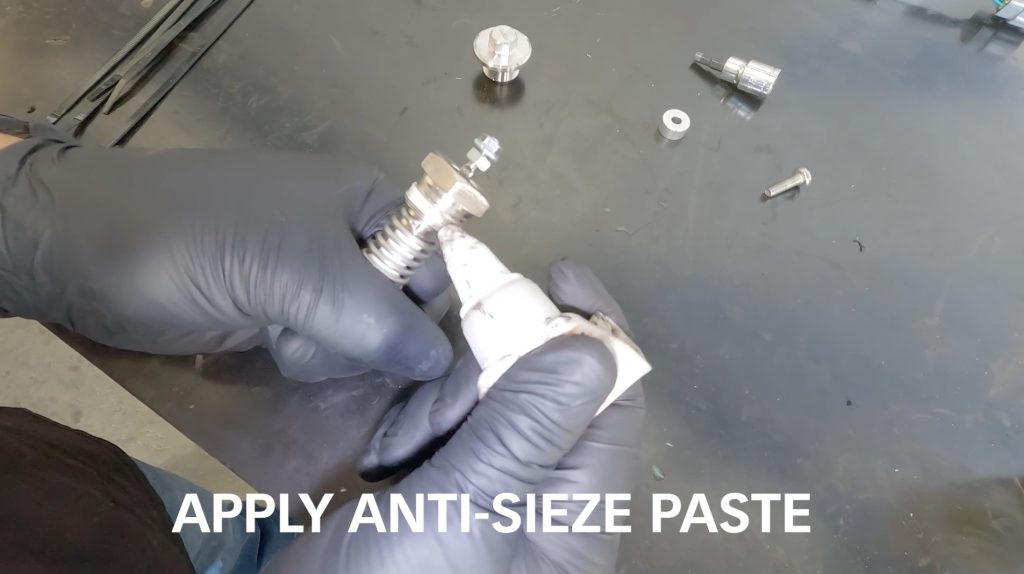
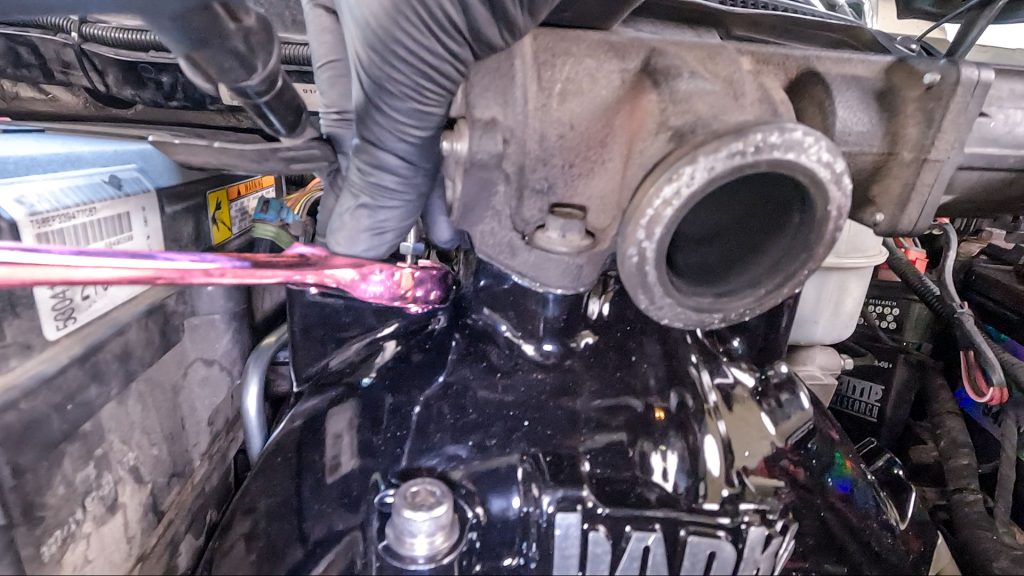
106. Tighten Coil Heater By Hand
Should be tight, but don’t over do it.
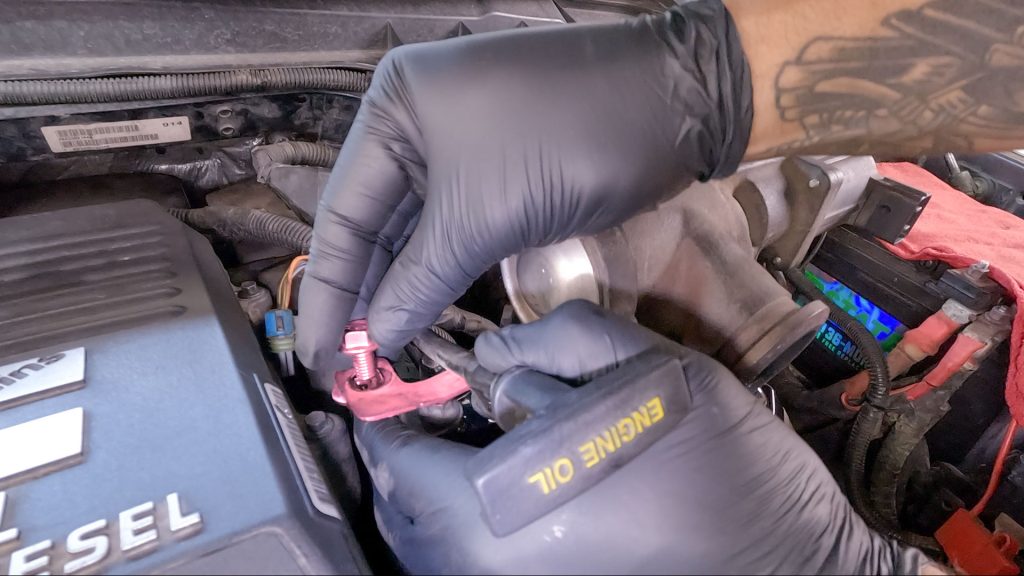
107. Install Dipstick Tube Bracket
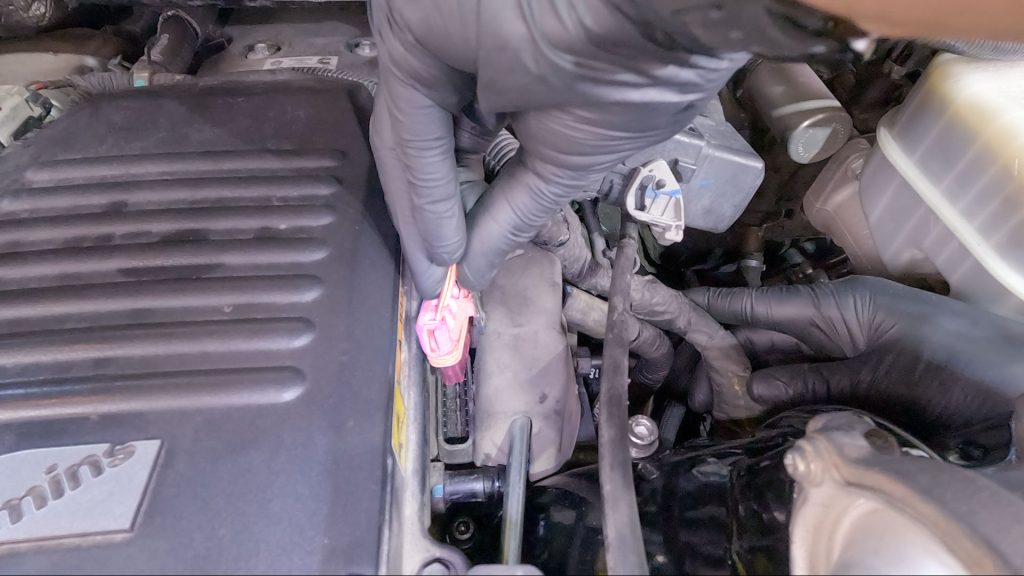
108. Now Install Forward Flat Blue Injector Plug
Be sure it clicks.
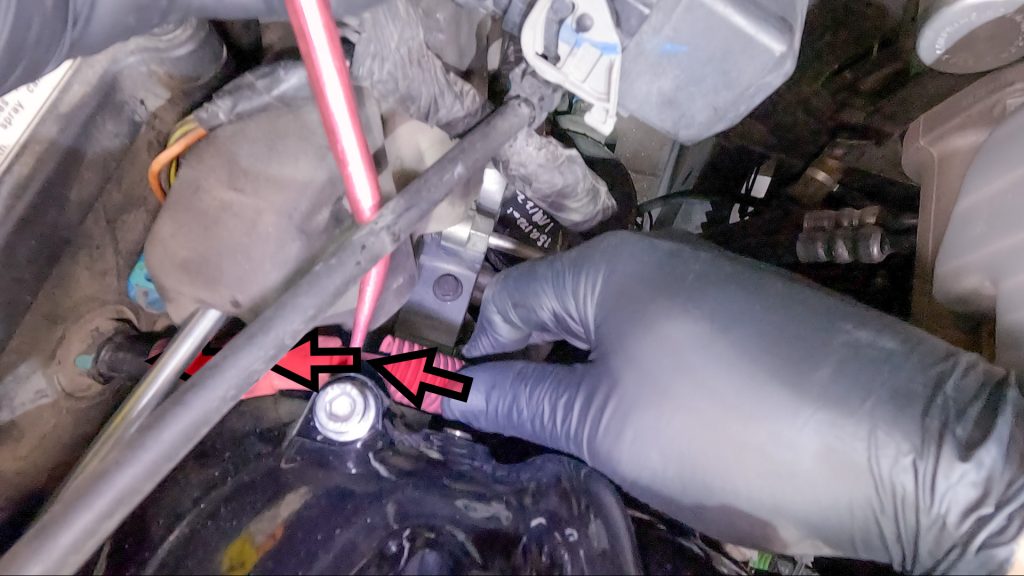
109. Connect Forward PCV Hose to Valve Cover
This is a tight fit, but doable. Wiggle the rubber hose on the nipple a quarter inch, then use a pry tool as a lever to help slide it on.
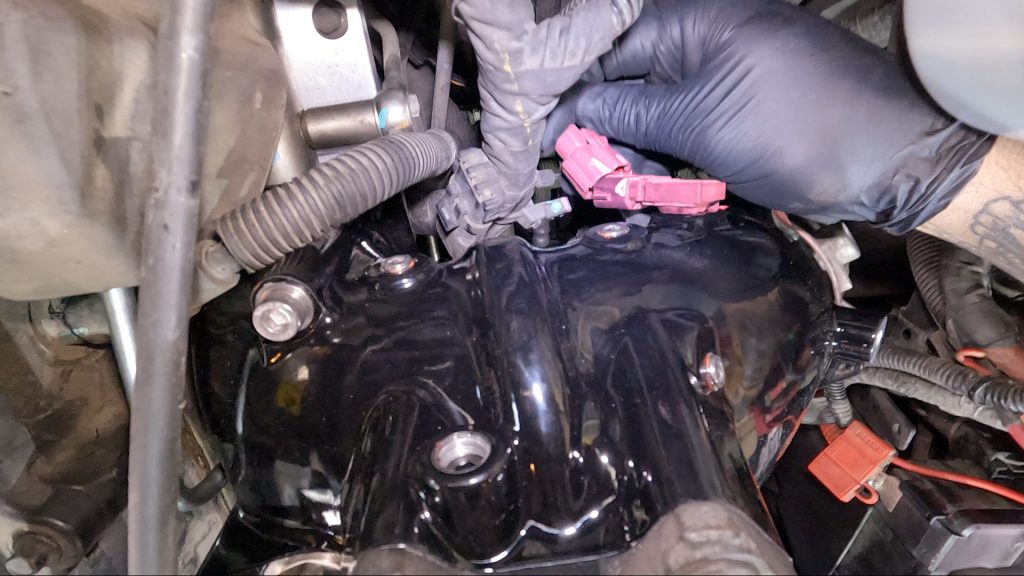
110. Plug In MAP Sensor (Rear of Monster-Ram)
Secure the slide lock back into position.
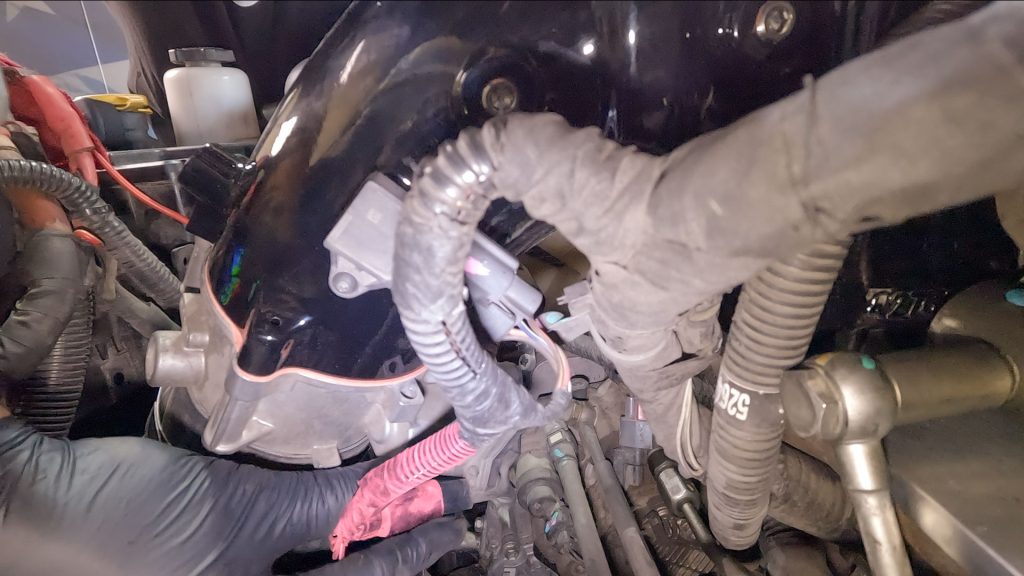
111`. Plug In Throttle Plug
Secure the slide lock back into position.
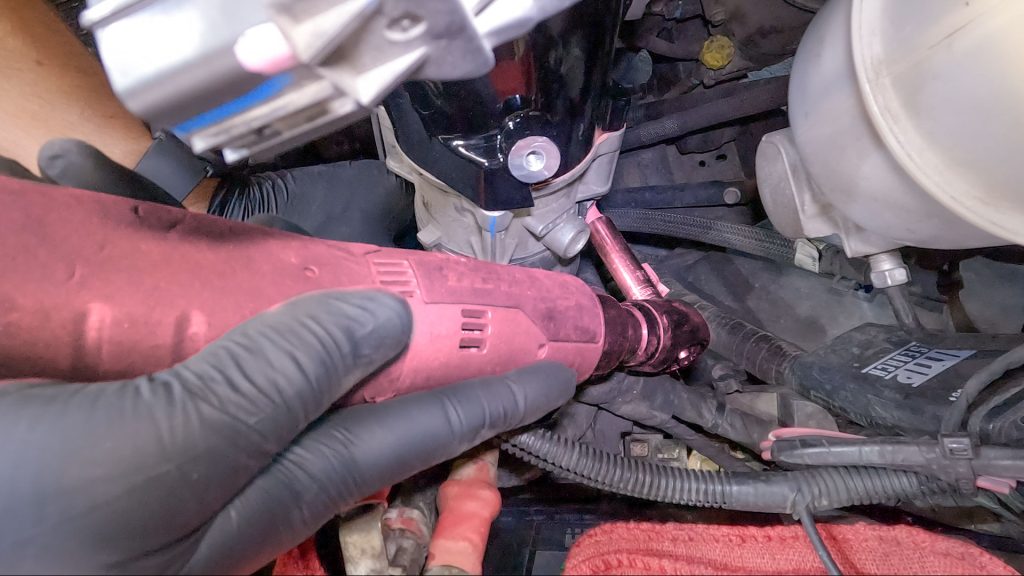
112. Tighten Boost Tube Clamp
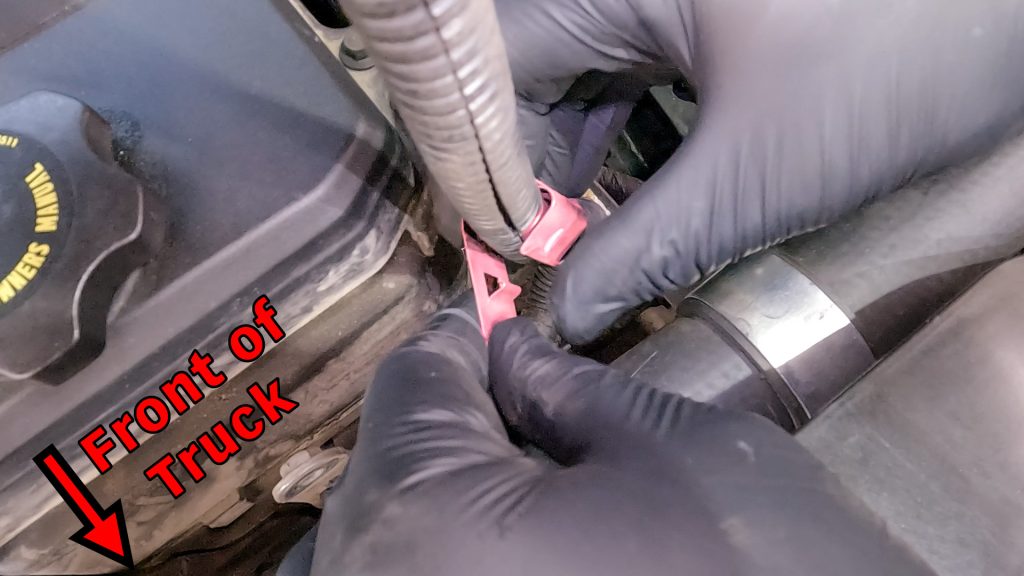
113. Remove & Discard 12v Heater Cable P-Clamp
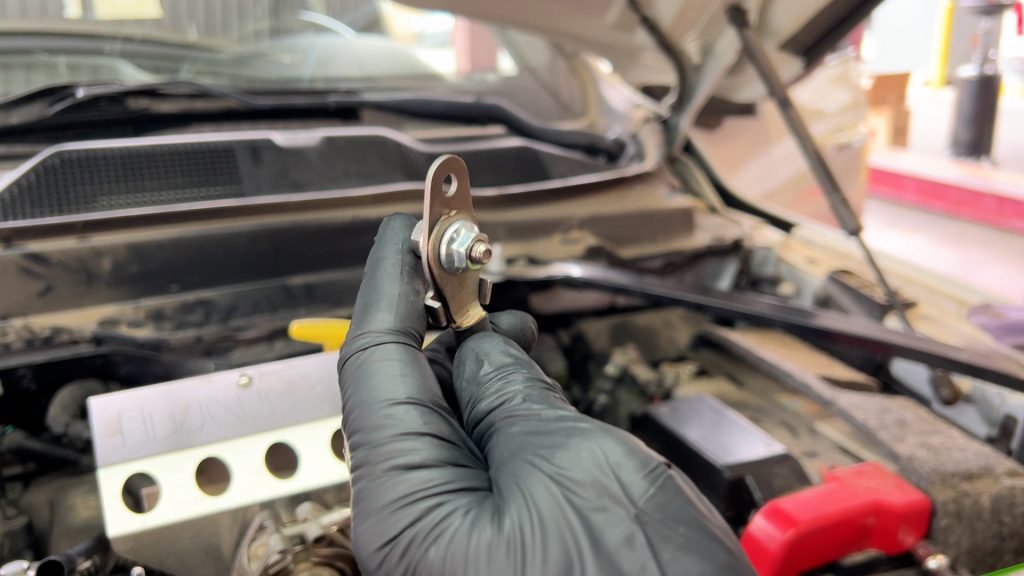
114. Assemble Heater Cable Extension Bracket
2019-2024 Rams have a permanently attached nut to the OEM heater harness.
Use the supplied adapter and M8 bolt to adapt your 2019-2024 OEM heater harness so that it will slide over the new coil heater post. The adapter should be oriented so the bolt is facing up with the nut on top. Use thread locker.
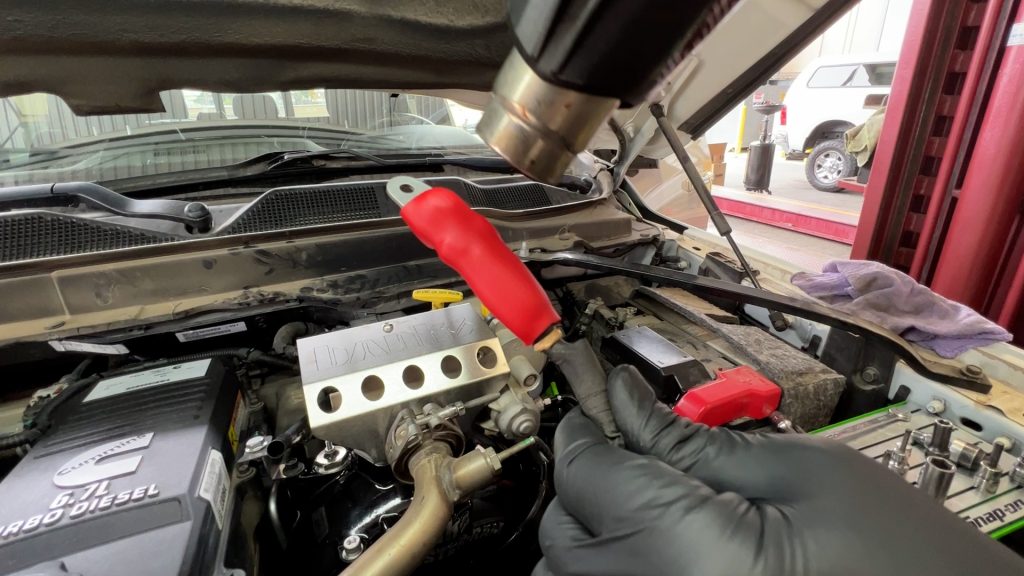
115. Apply Heat Shrink
The heat shrink must cover the bolted area to prevent any accidental metal-to-metal content. Leave only the new bolt hole exposed.
This is to prevent the possibility of the 12V wire touching any part of the body and causing a short. The heat shrink is thick and will take a moment to start shrinking.
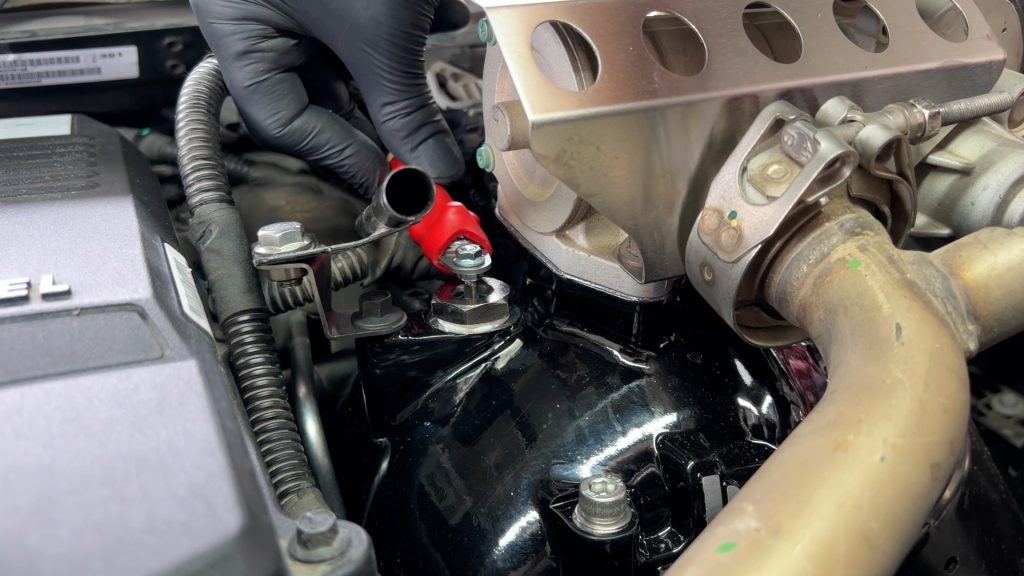
116. Place Heater Cable Onto Threaded Post
The head of the M6 Bolt you just covered needs to face down.
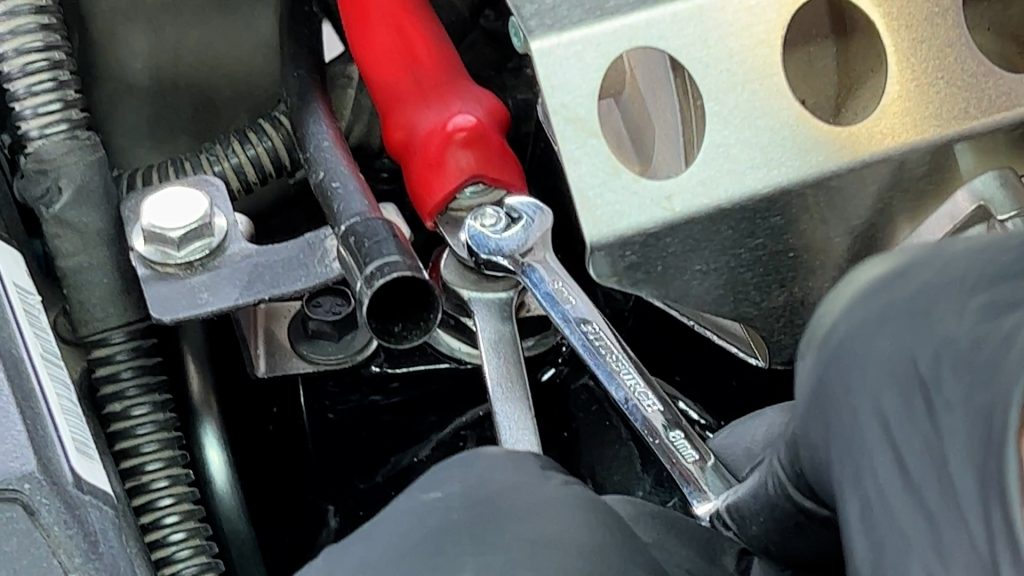
117. Use Two Wrenches to Hold the Bottom Nut From Turning
Be sure to support the lower nut with an open head wrench. You don’t want to break the stud off while tightening the top nut.
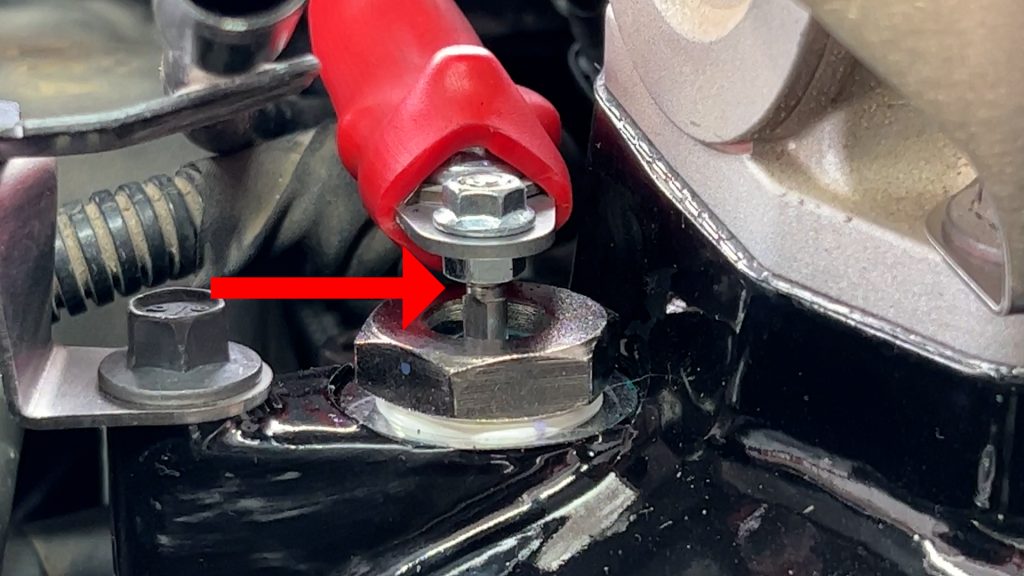
118. Be Sure Lower Bolt Is Away From Metal
No part of the 12V cable can touch the body of the coil heater. Otherwise it will arc, melt, and fail.
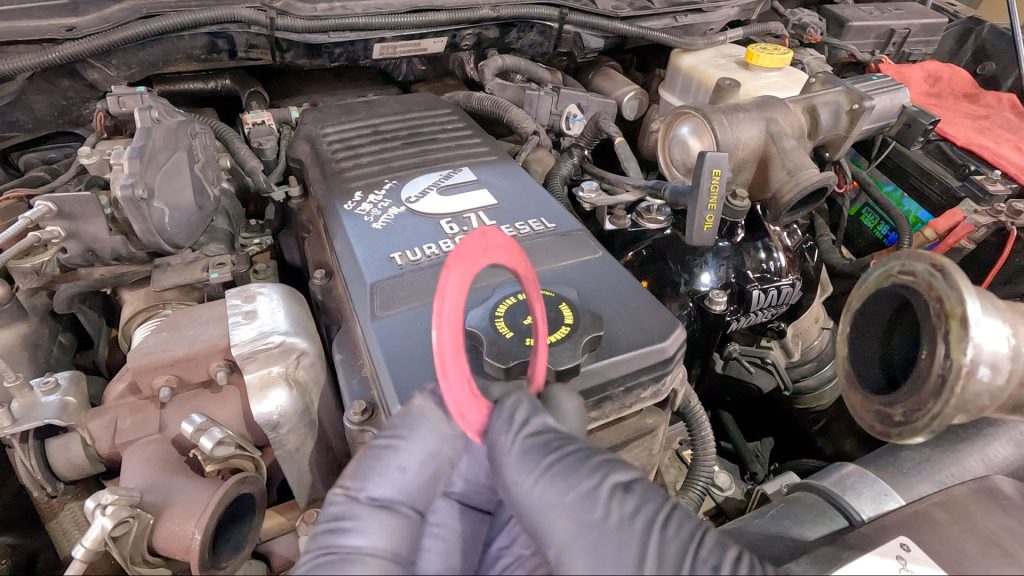
119. Flat Washer Goes On Passenger Side of EGR Tube
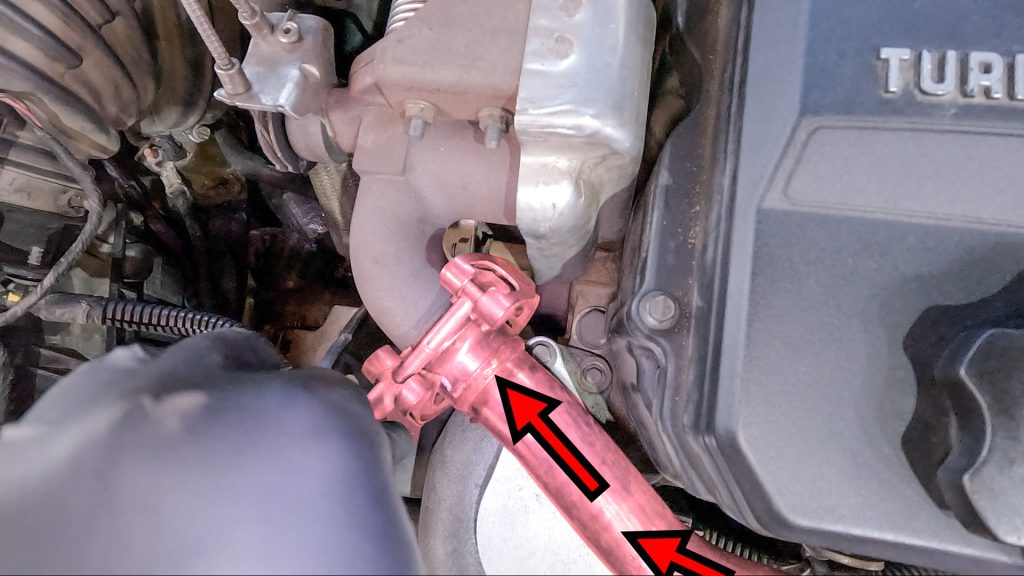
120. Put Clamp Over Union & Hand Tighten
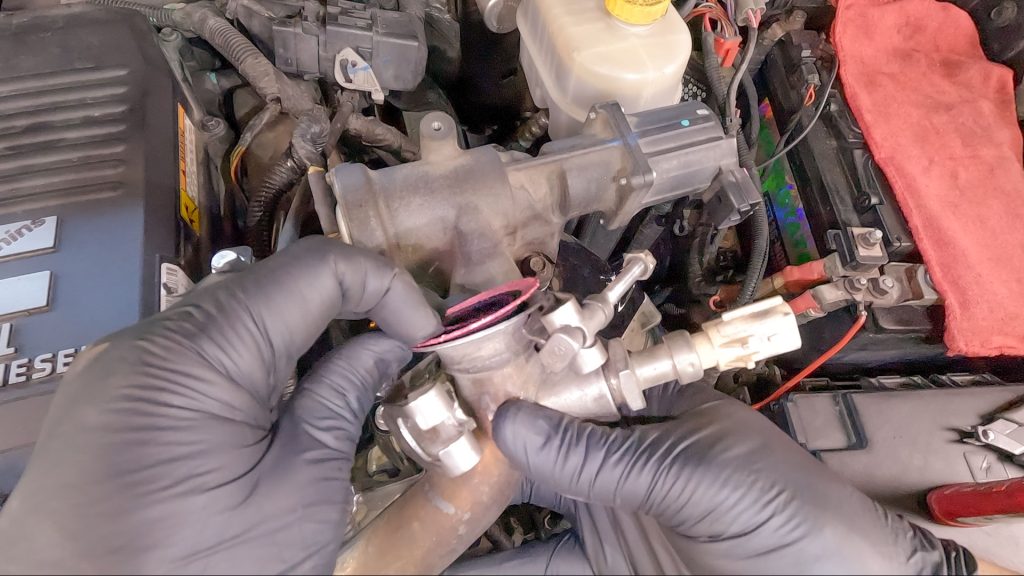
121. Conical Gasket Goes On Driver Side of EGR Tube
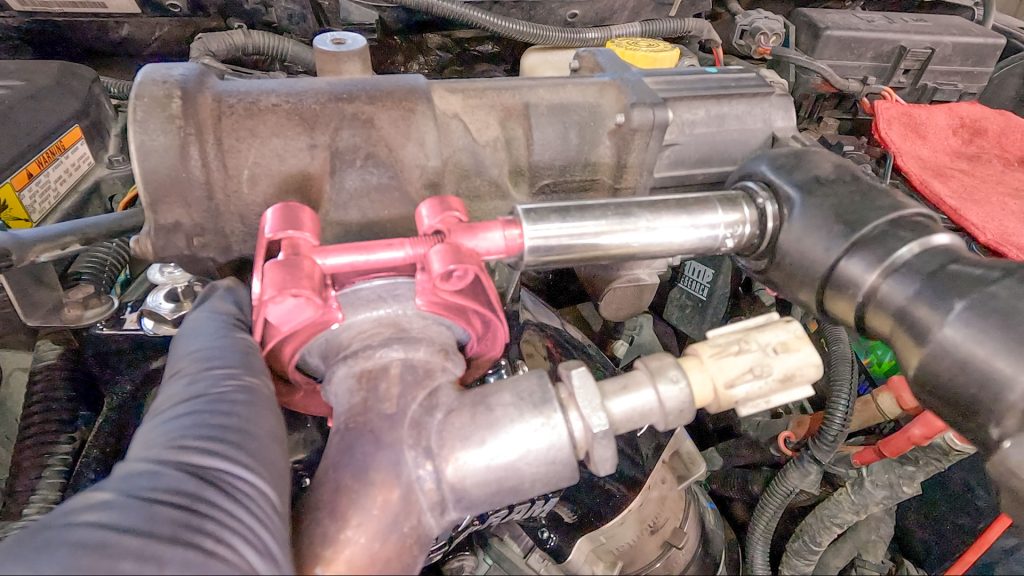
122. Tighten Driver Side Clamp
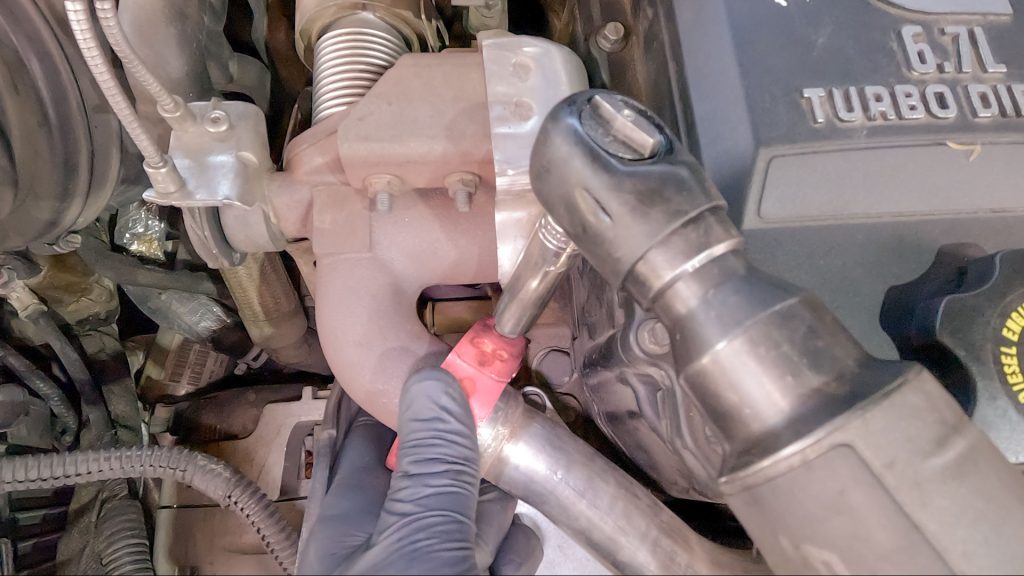
123. Tighten Passenger Side Clamp
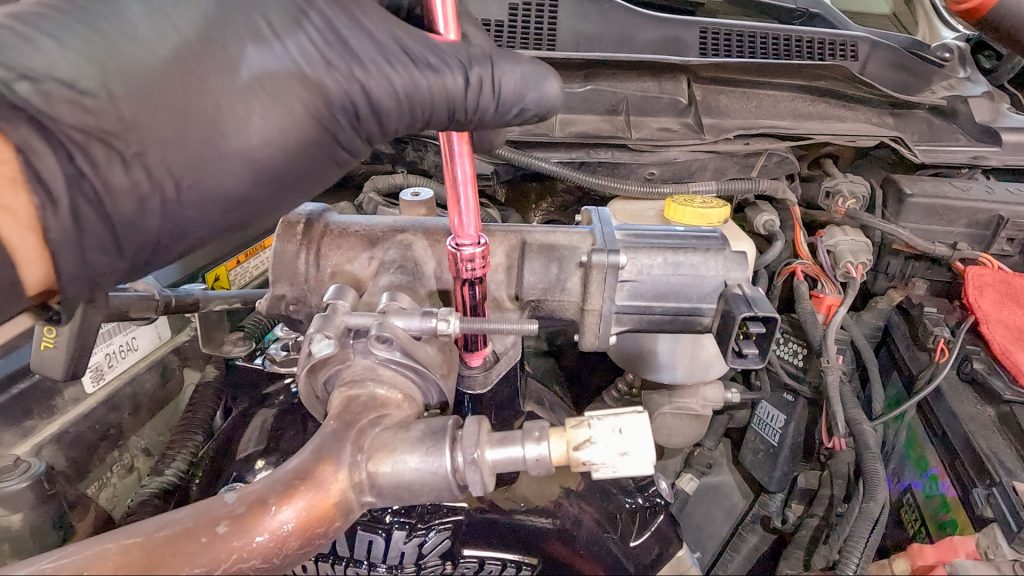
124. Loosen Front Bolts on EGR for Cover
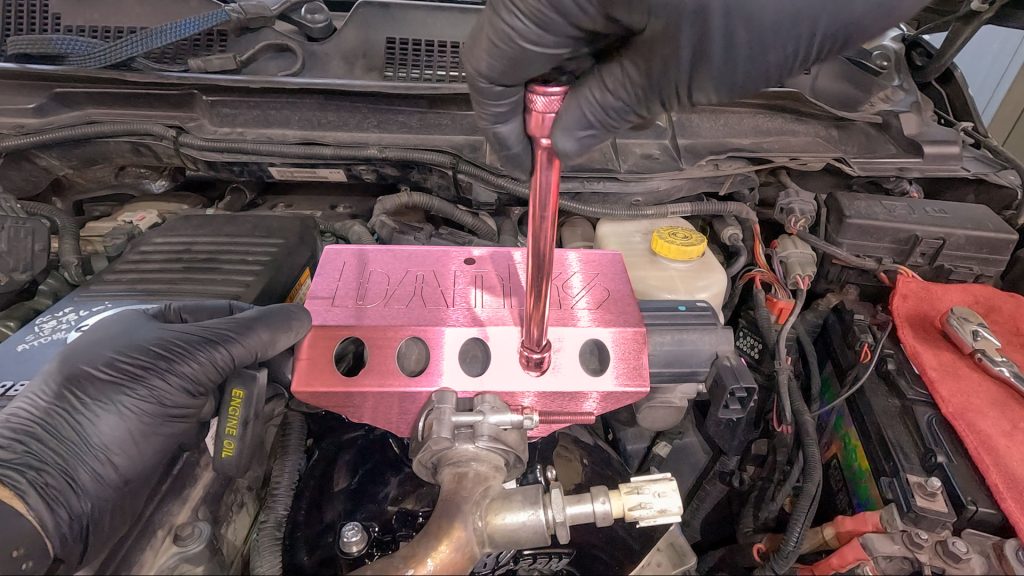
125. Install EGR Heat Shield and Tighten Bolts
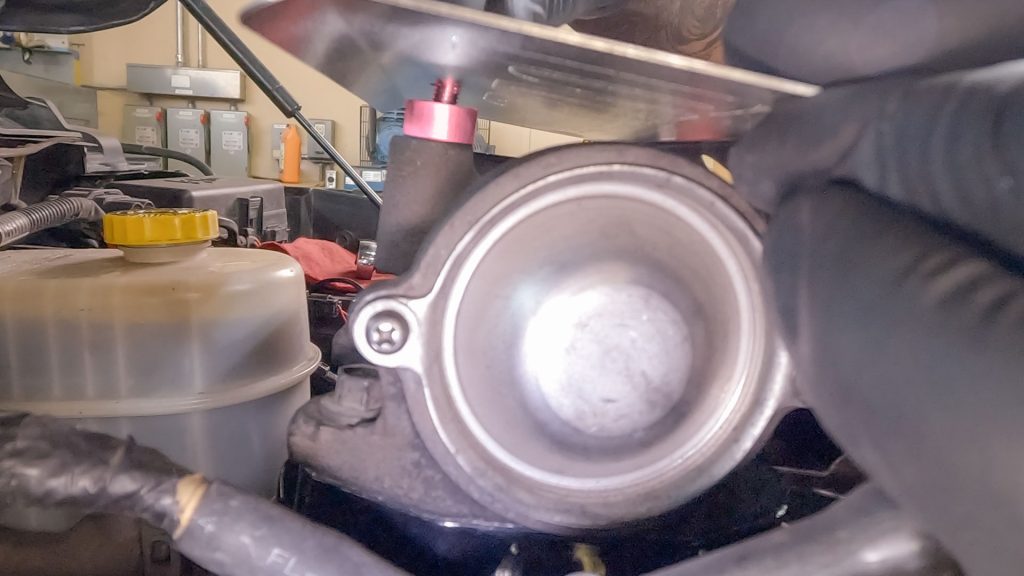
126. Place Rear Heatshield Spacer & Screw
Use a drop of thread locker on the screw to prevent it from vibrating out.
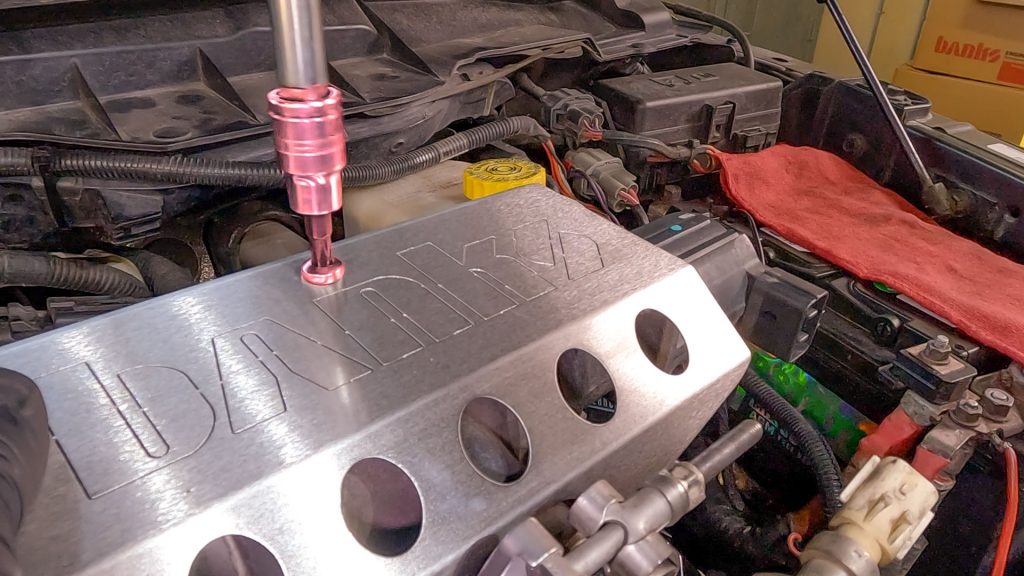
127. Tighten Torx Head Screw
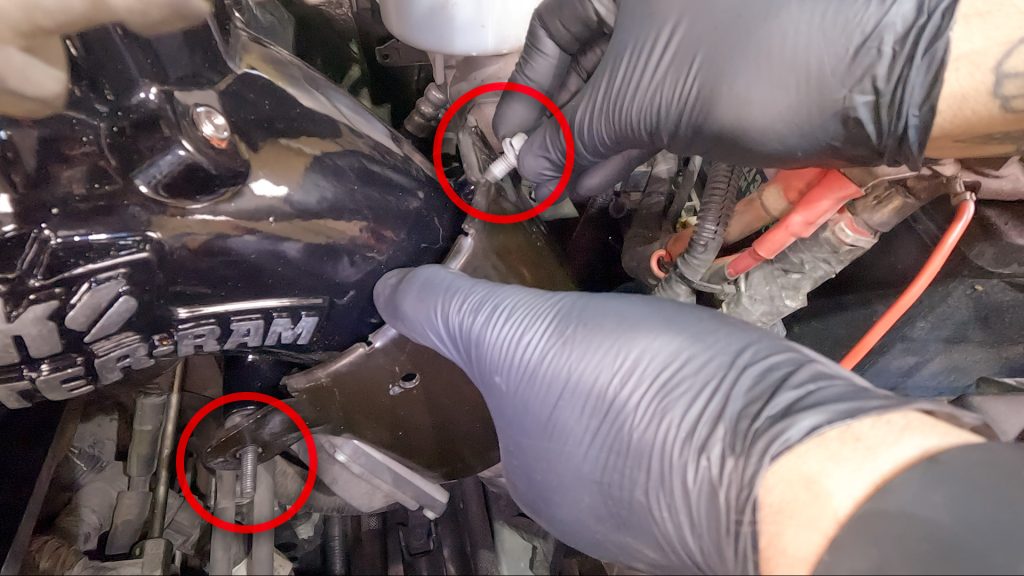
128. Install Throttle Heat Shield Bolt and Nuts
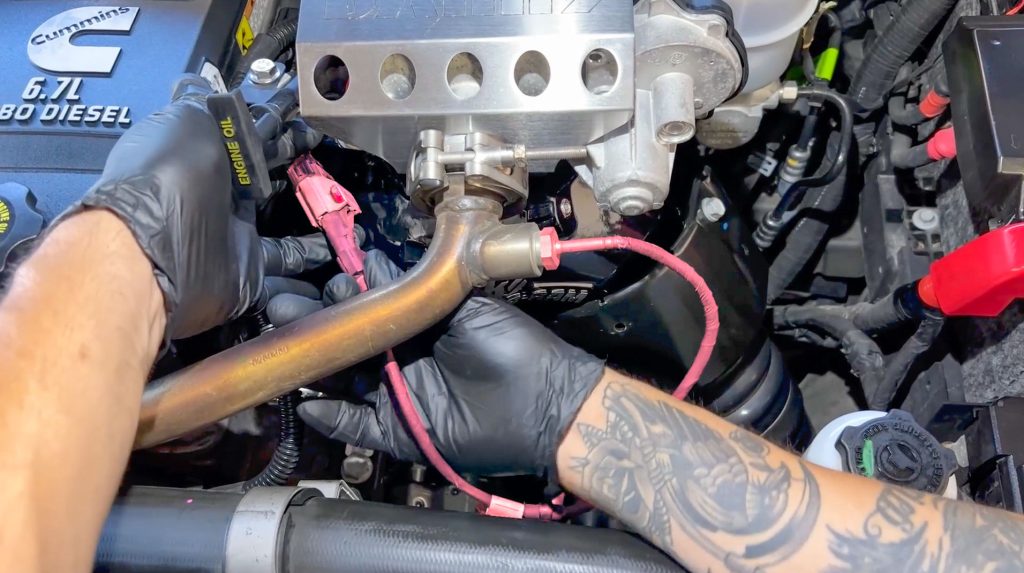
129. Connect Temp Sensor Extension
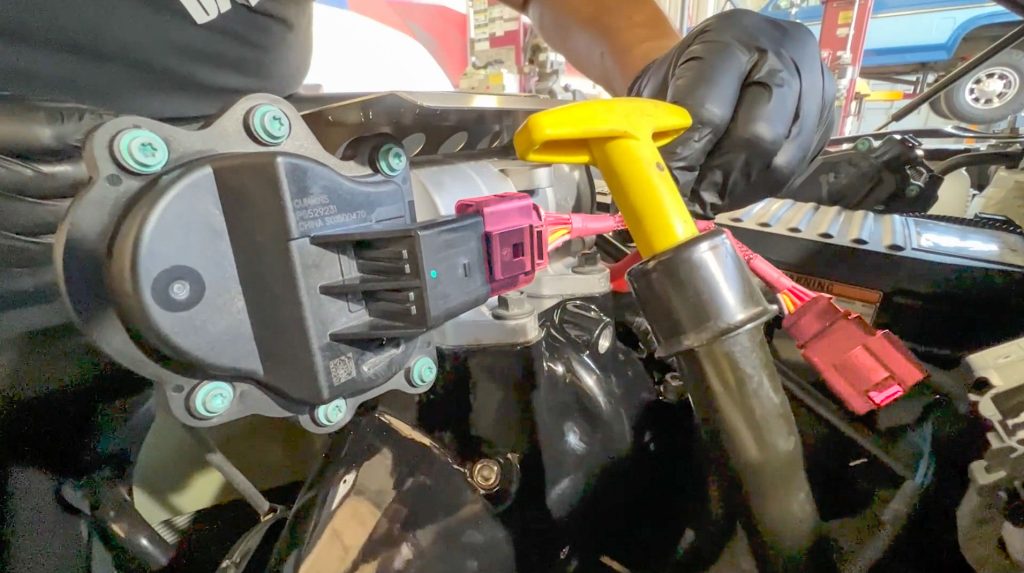
130. Connect Rear EGR Extension & Harness
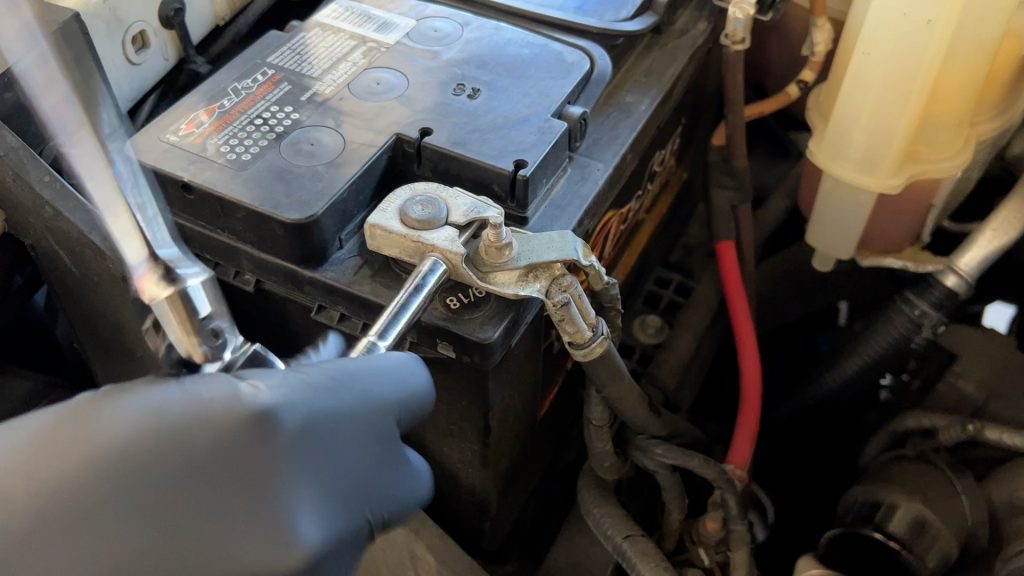
131. Reconnect Batteries
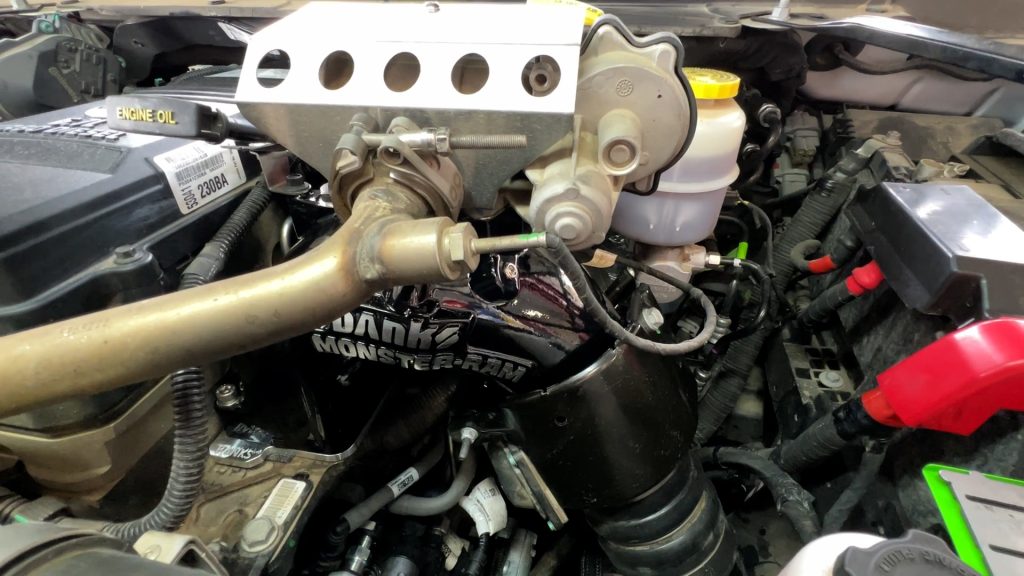
132. First Start May Take 1-2min of engine turnover.
This is normal. The fuel system, rail, and lines need to re-pressurize.

CARB EO Label
For smog check purposes, affix the CARB E.O. Label on a visible location under the hood. Banks recommends using the radiator shroud location.

